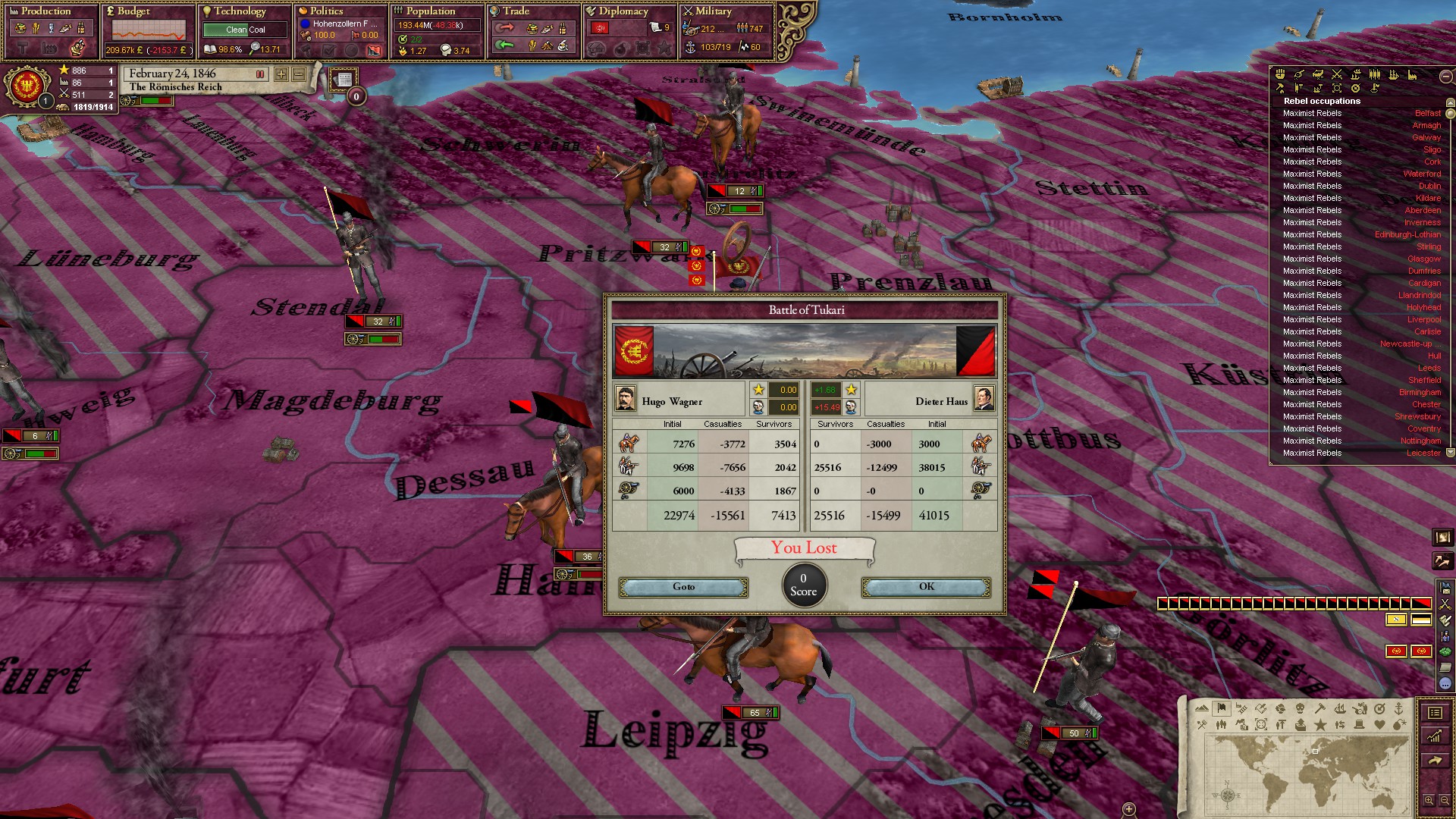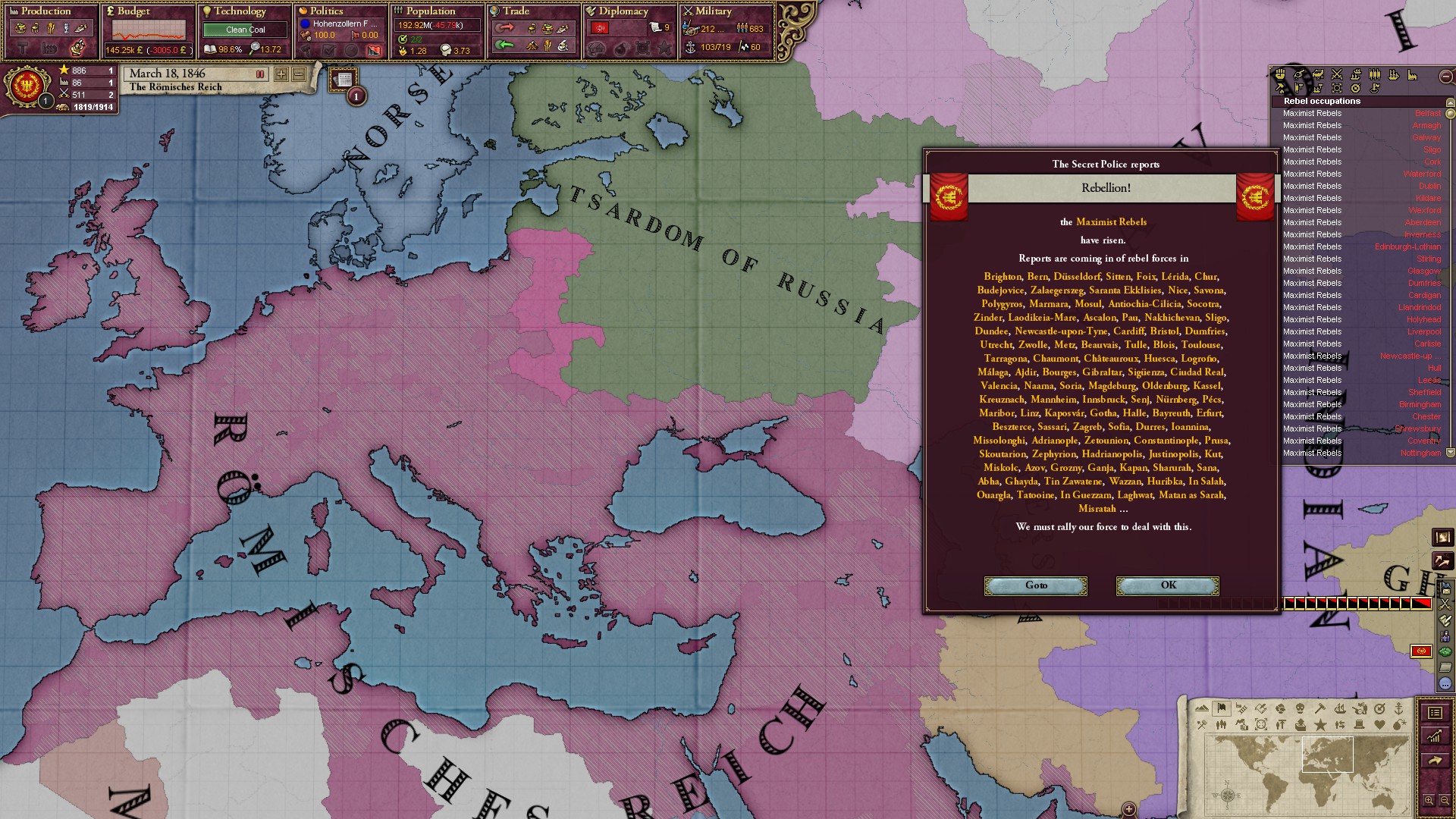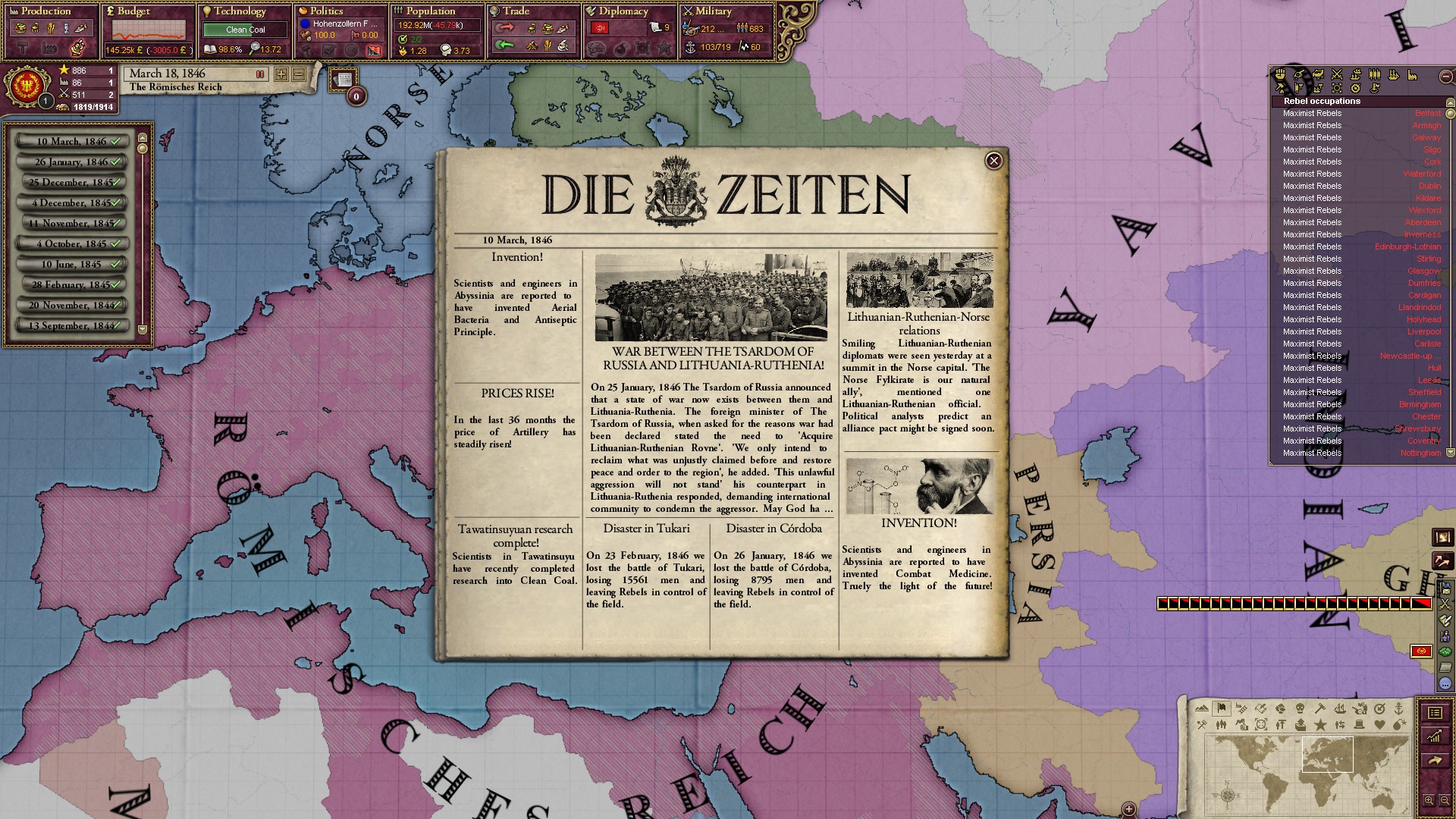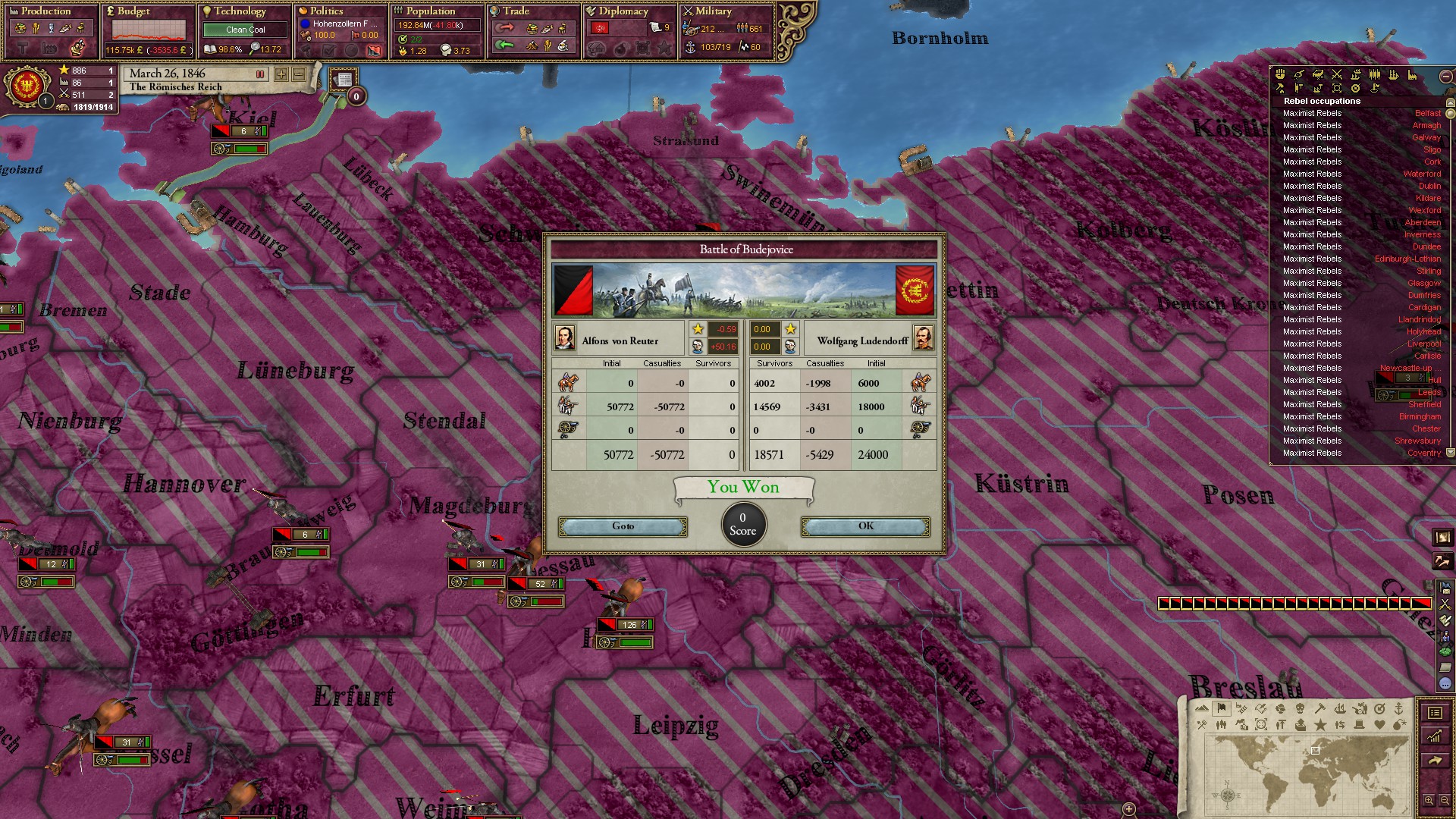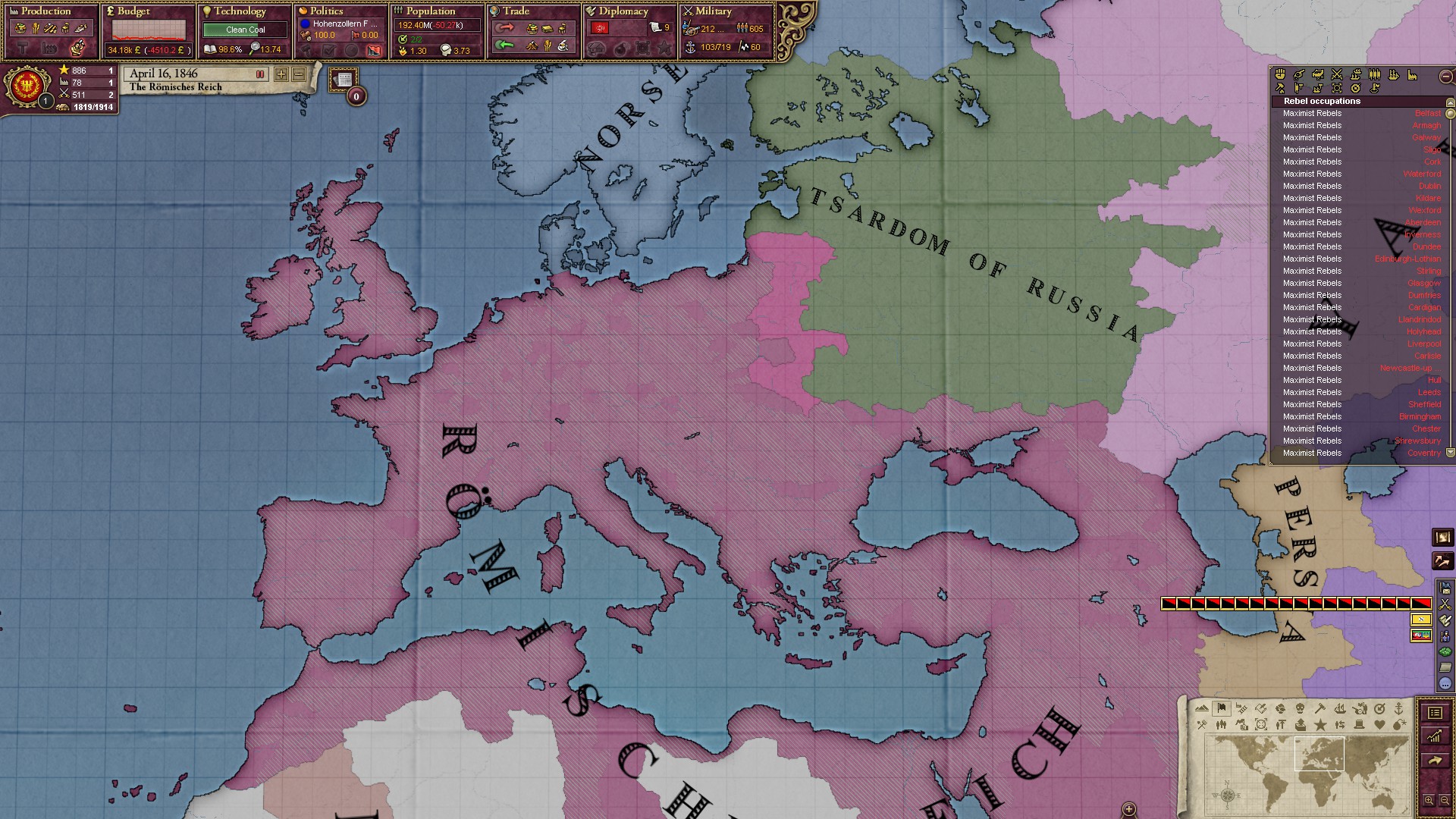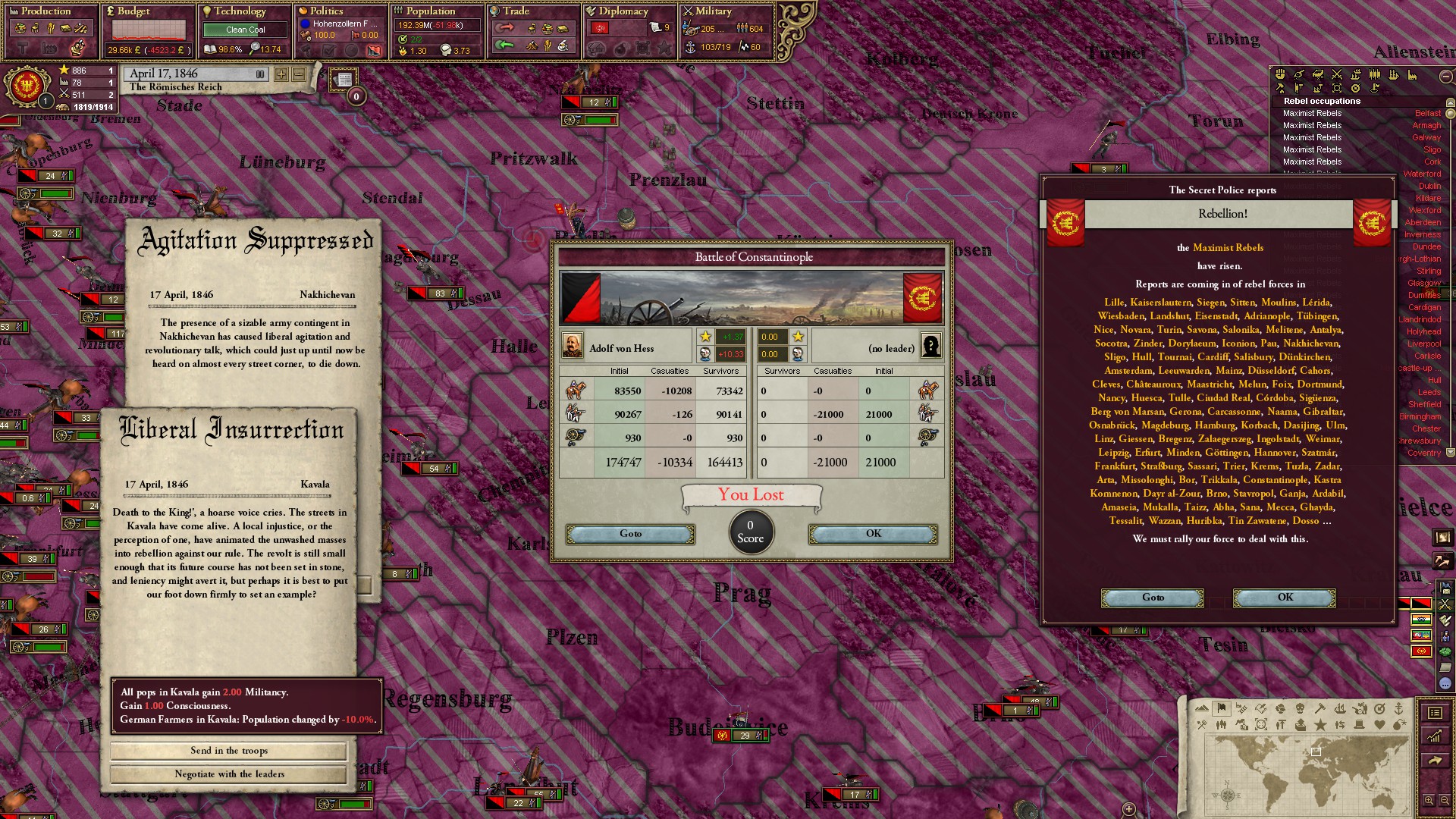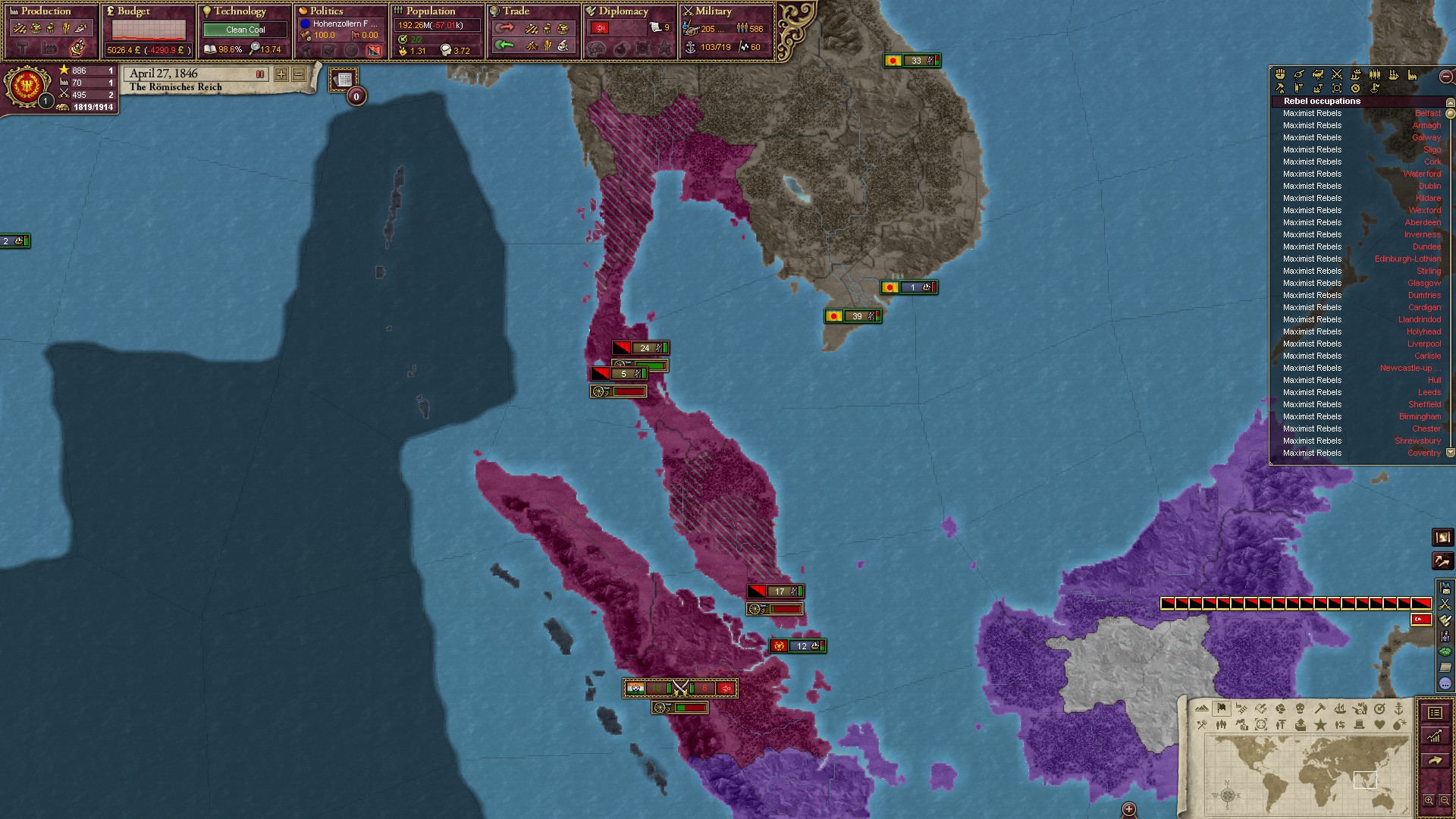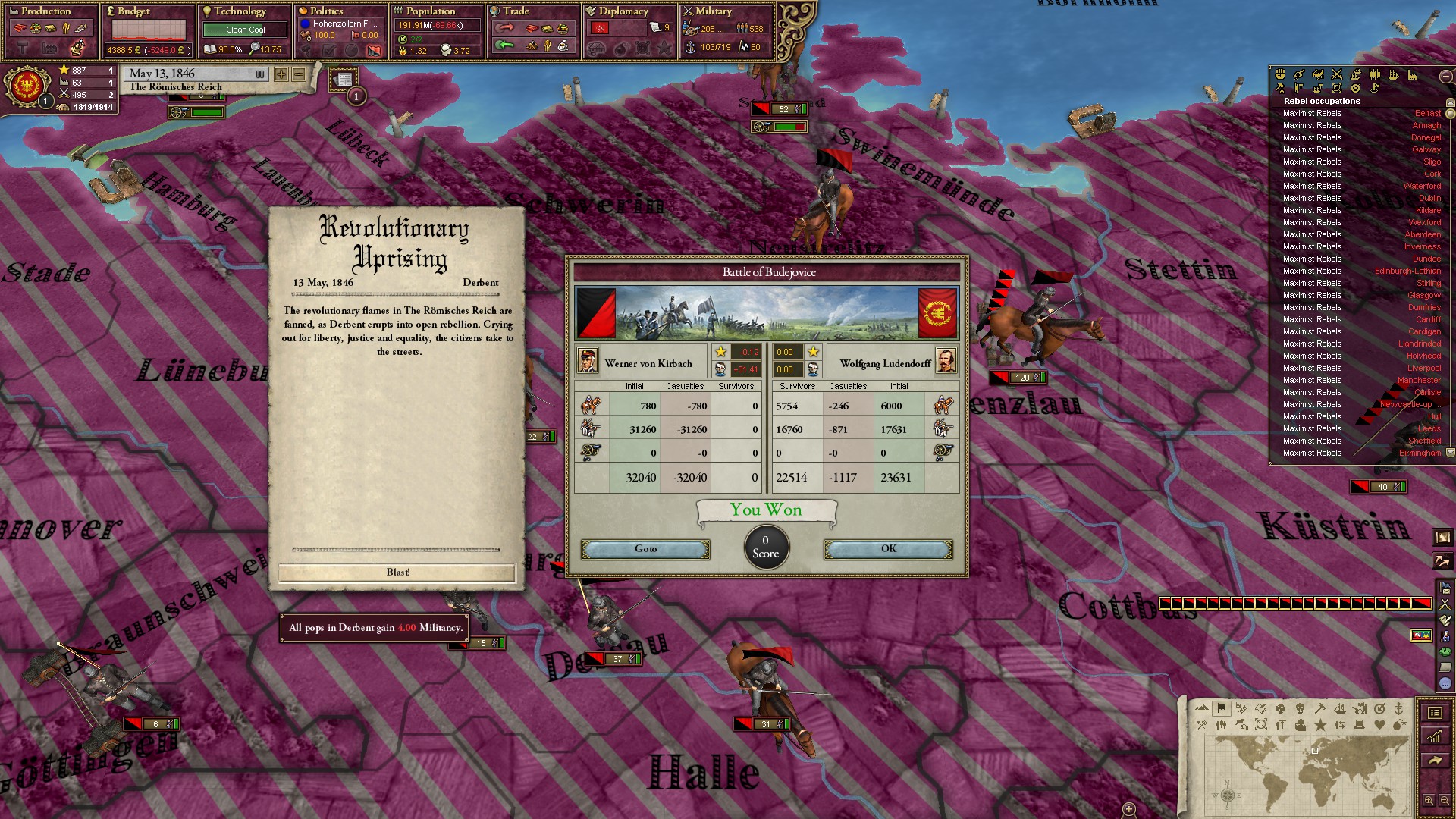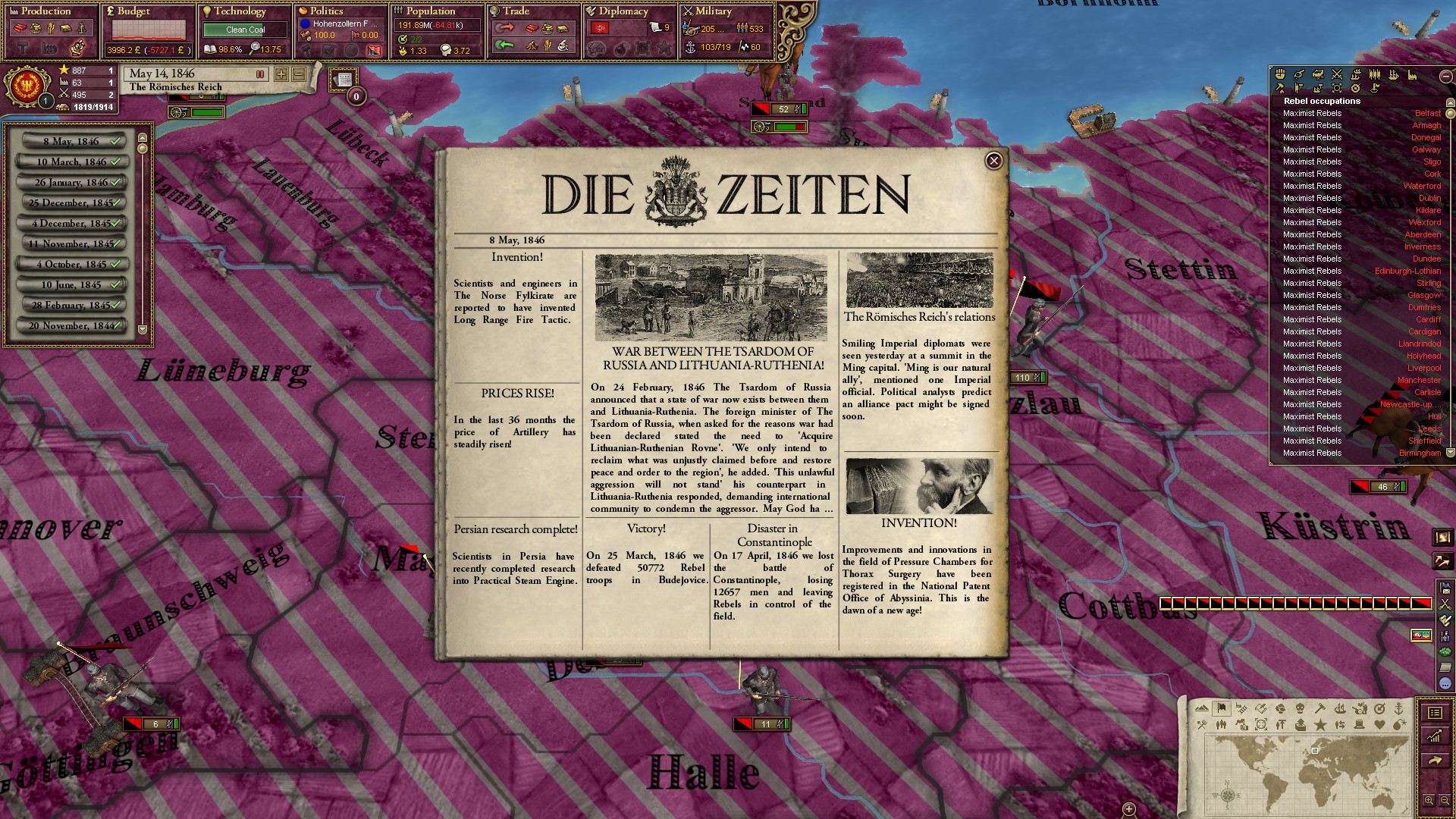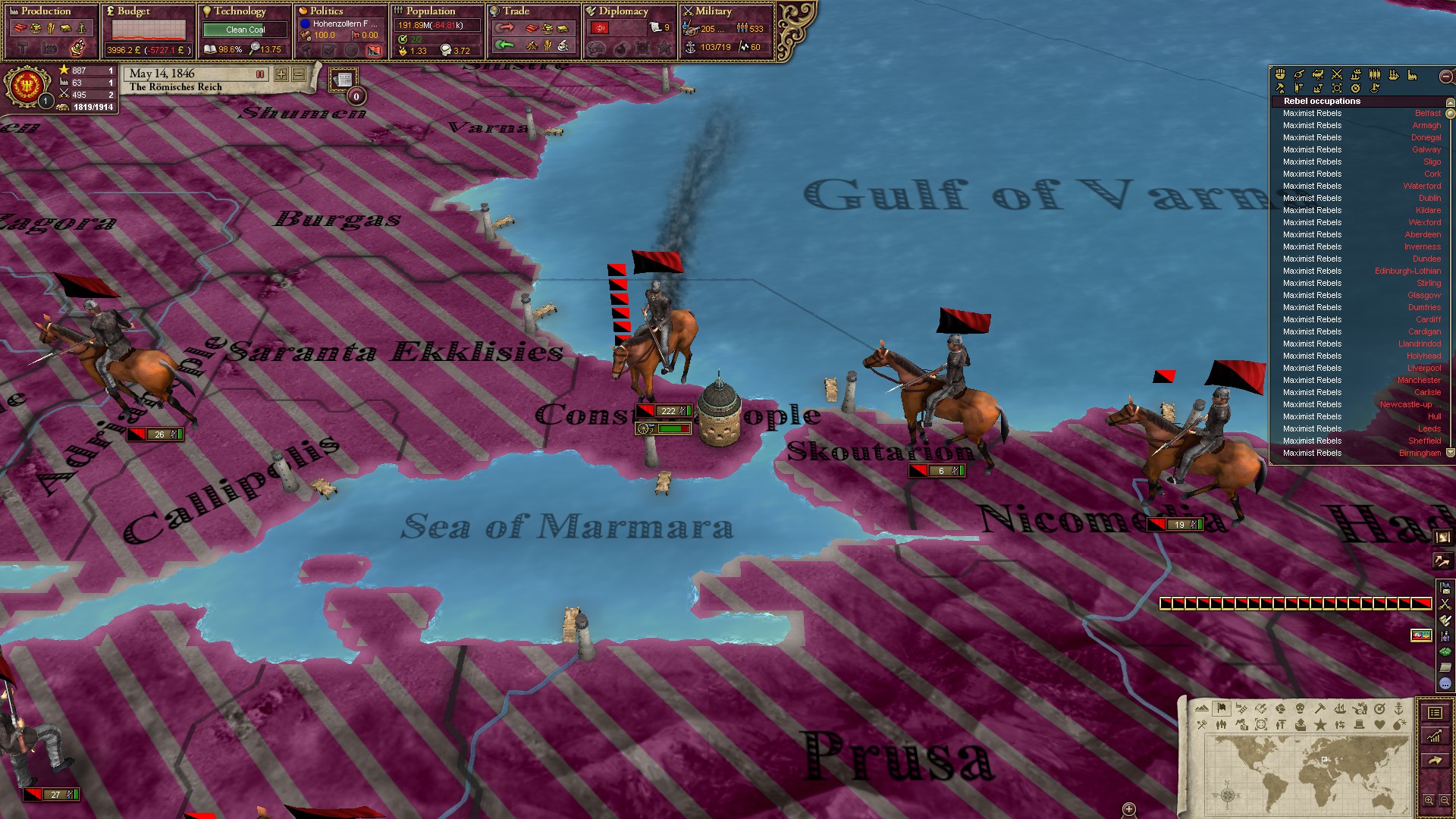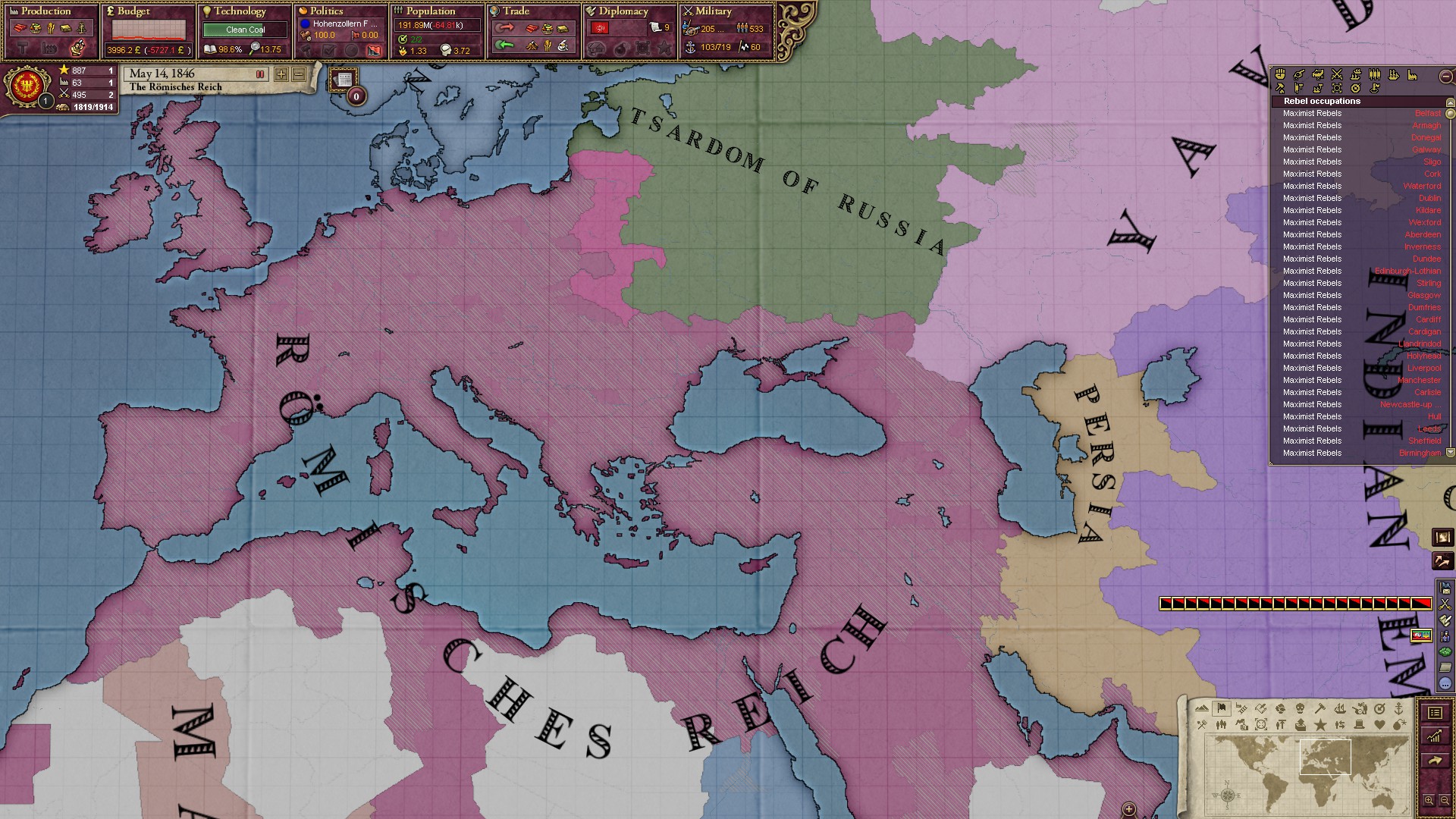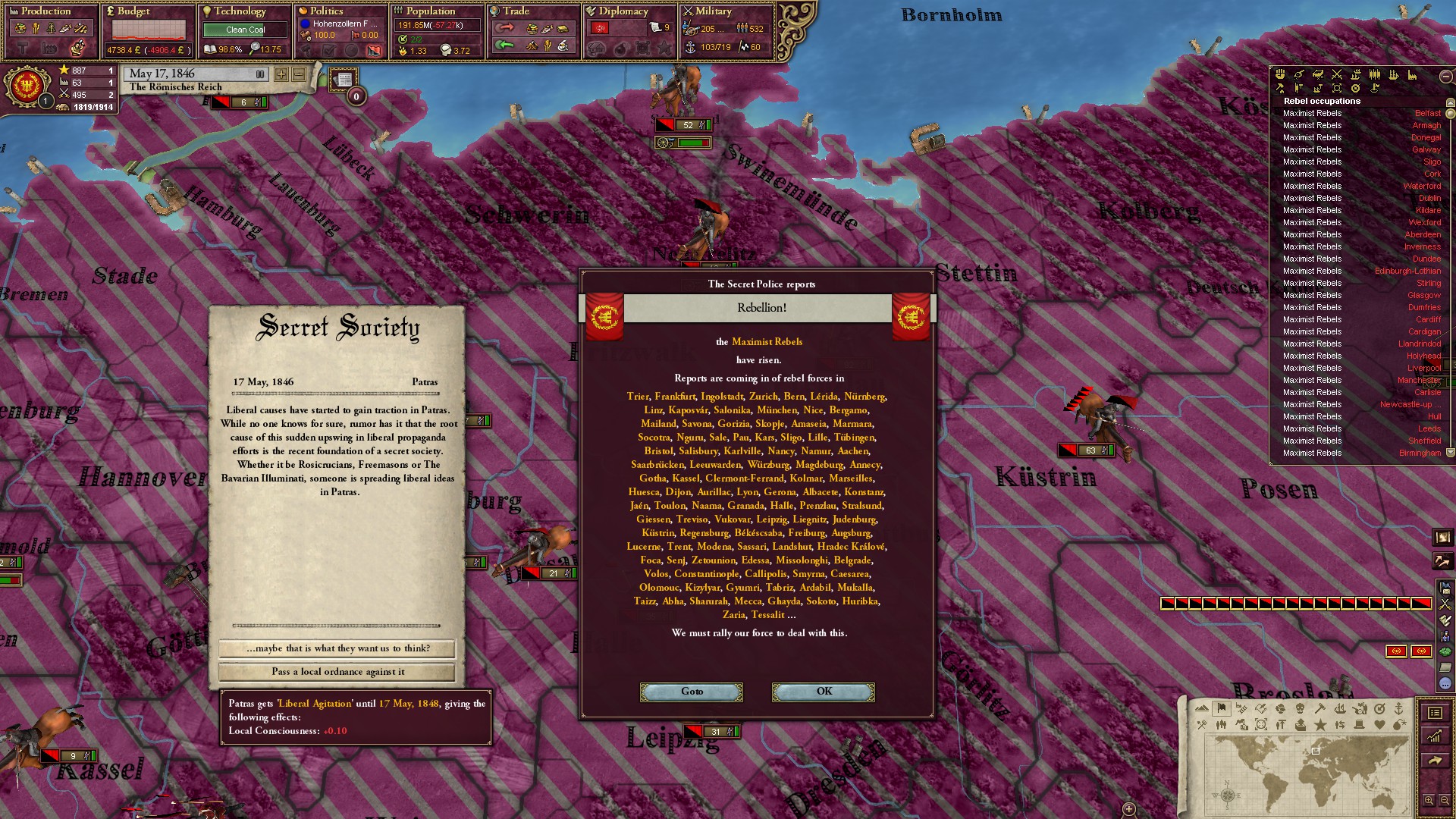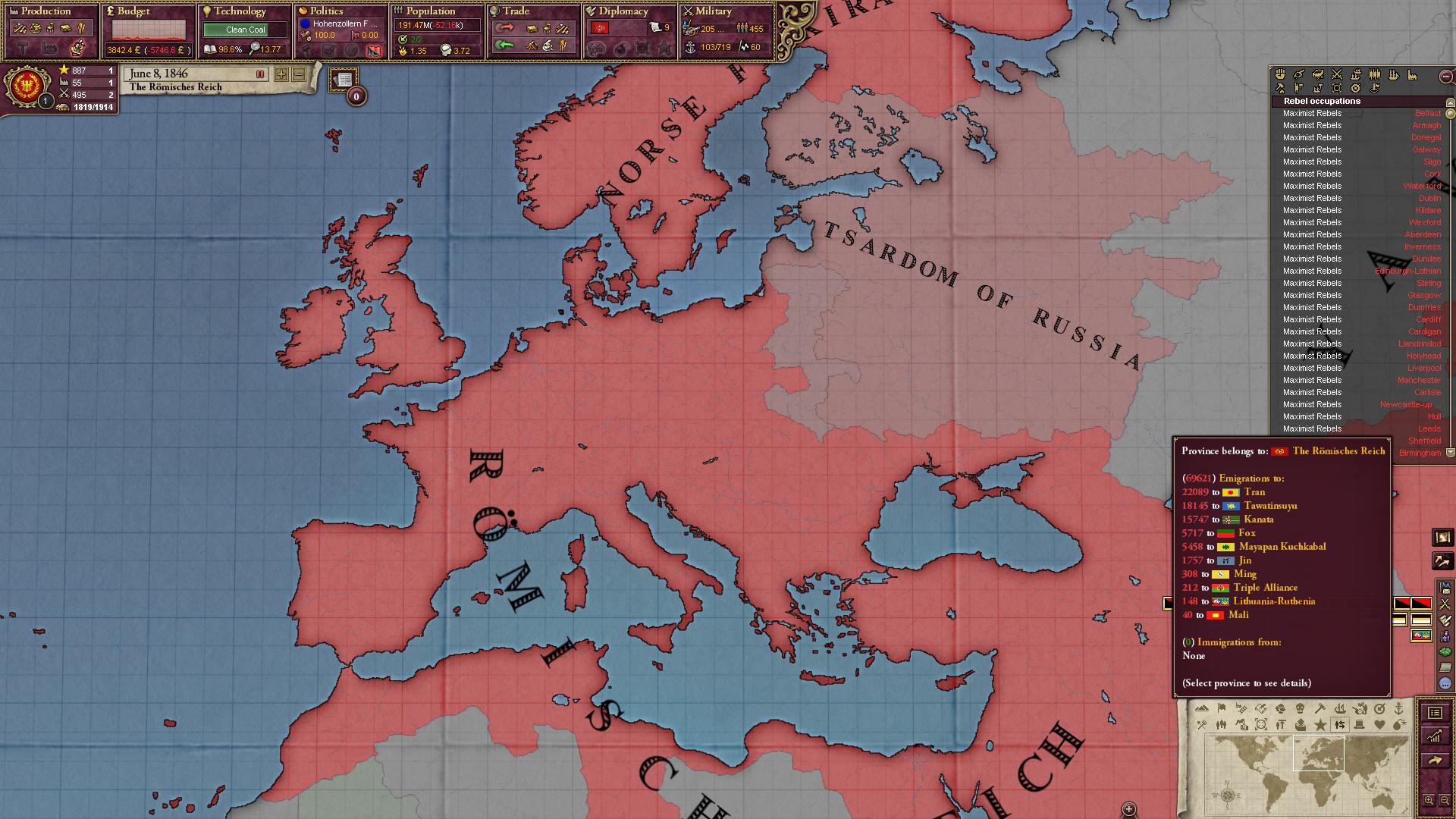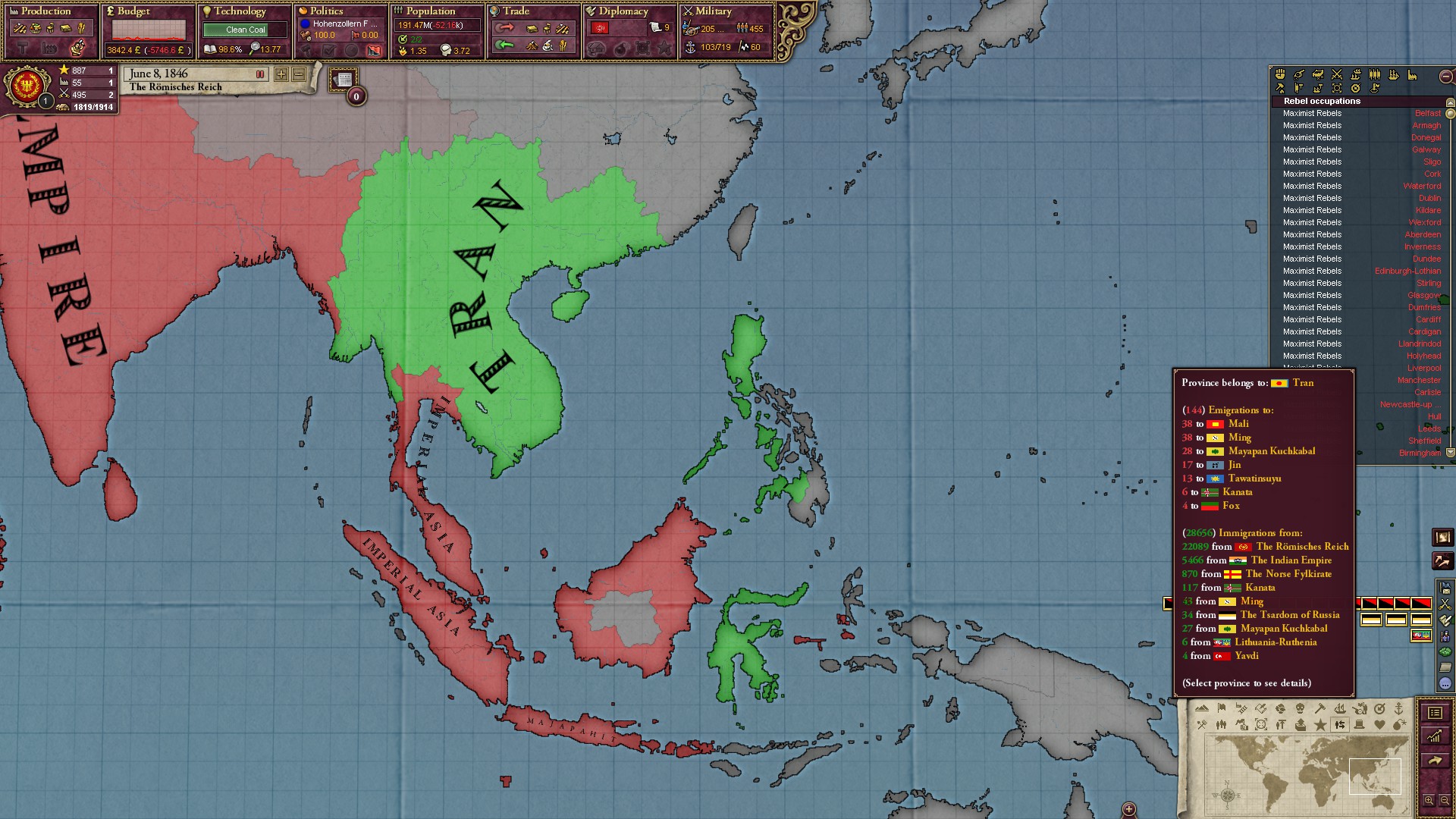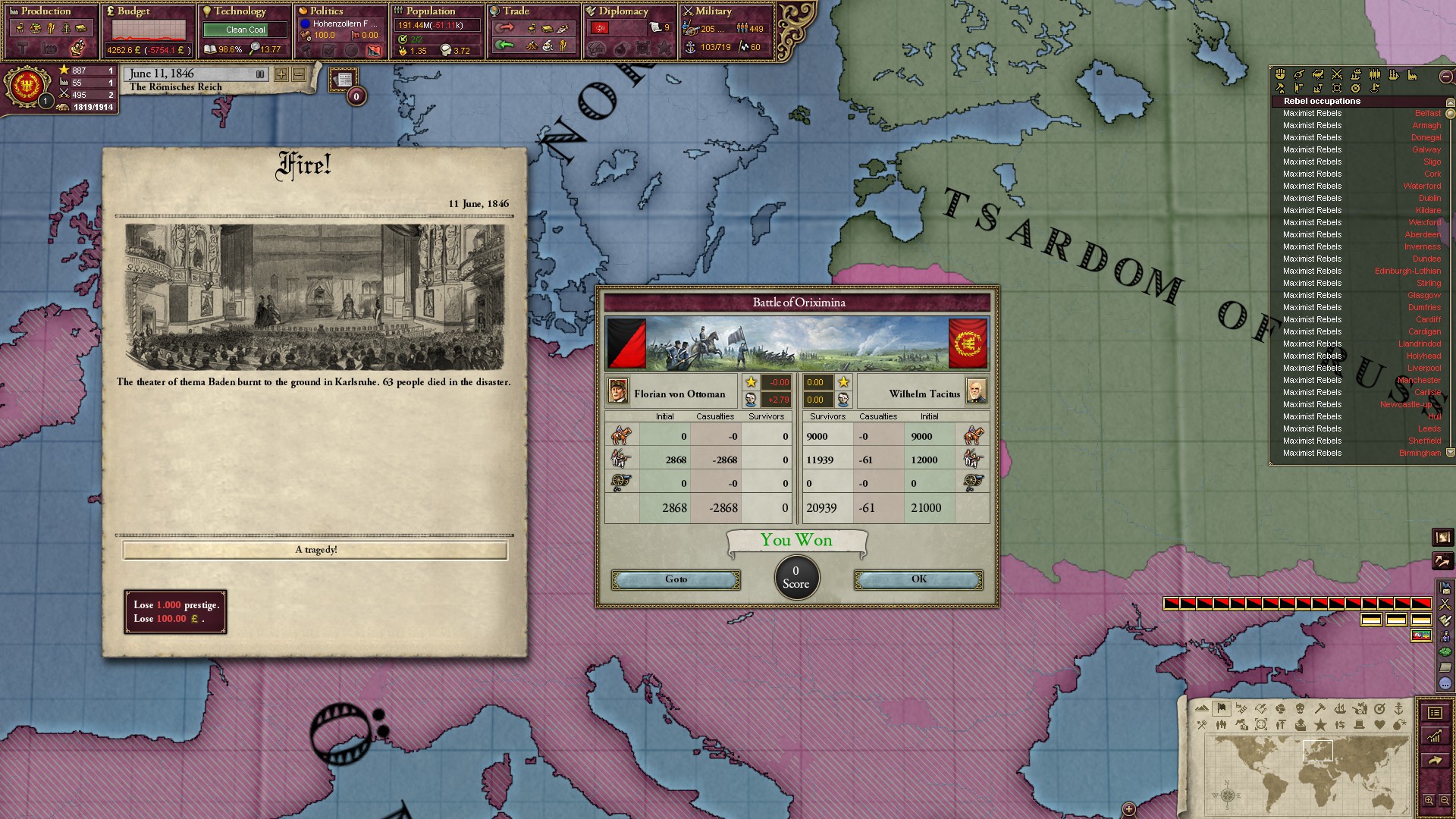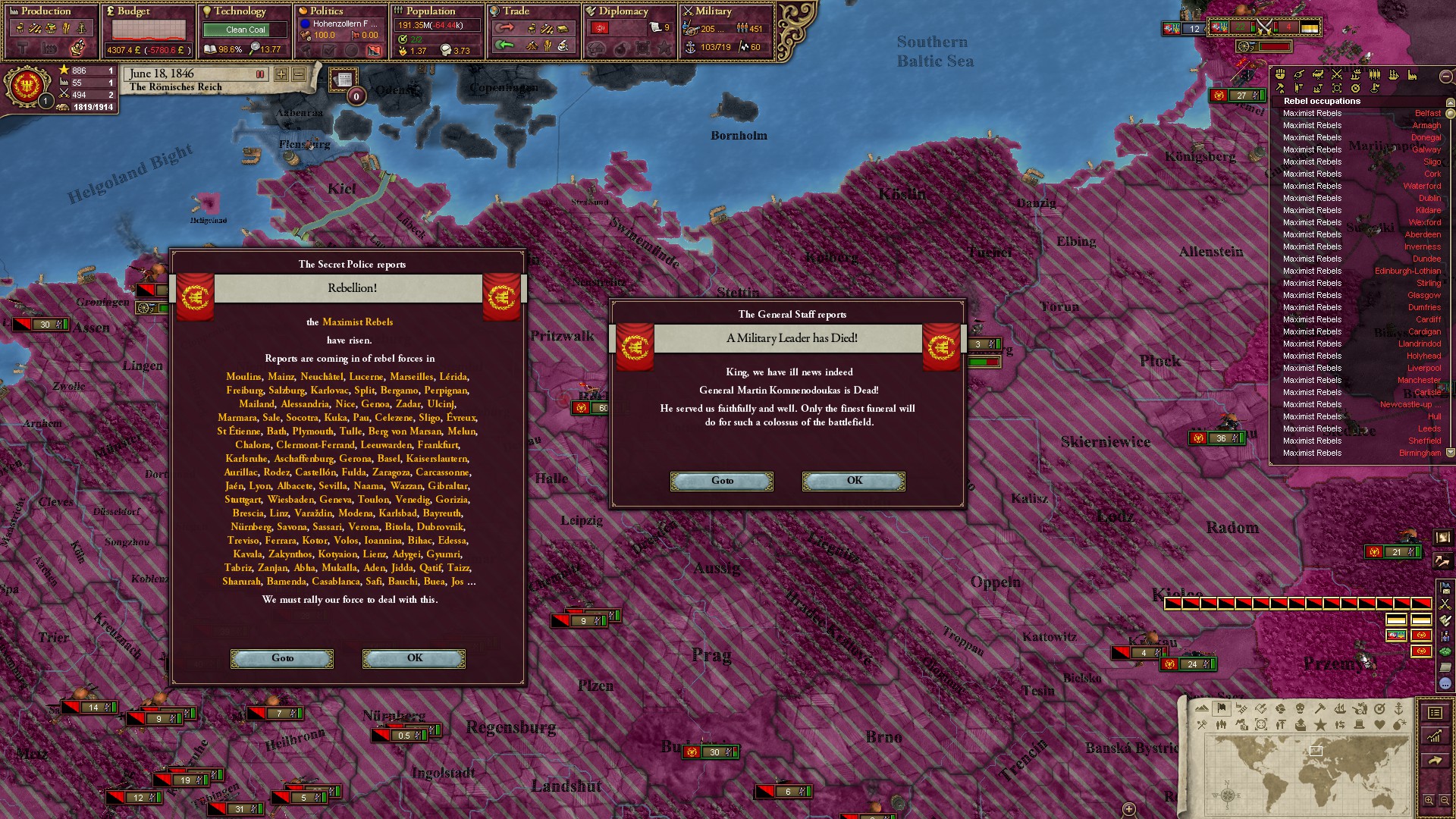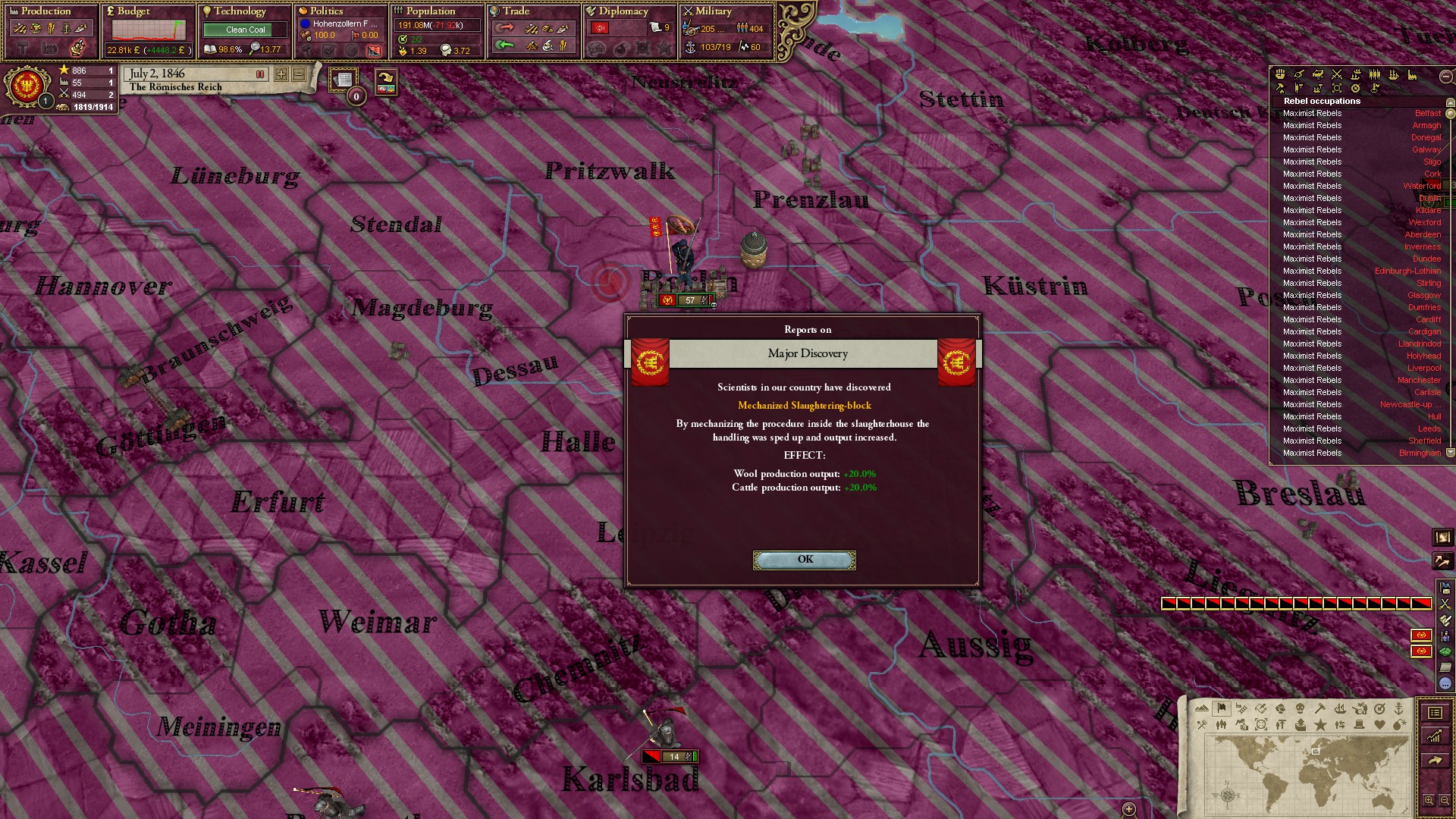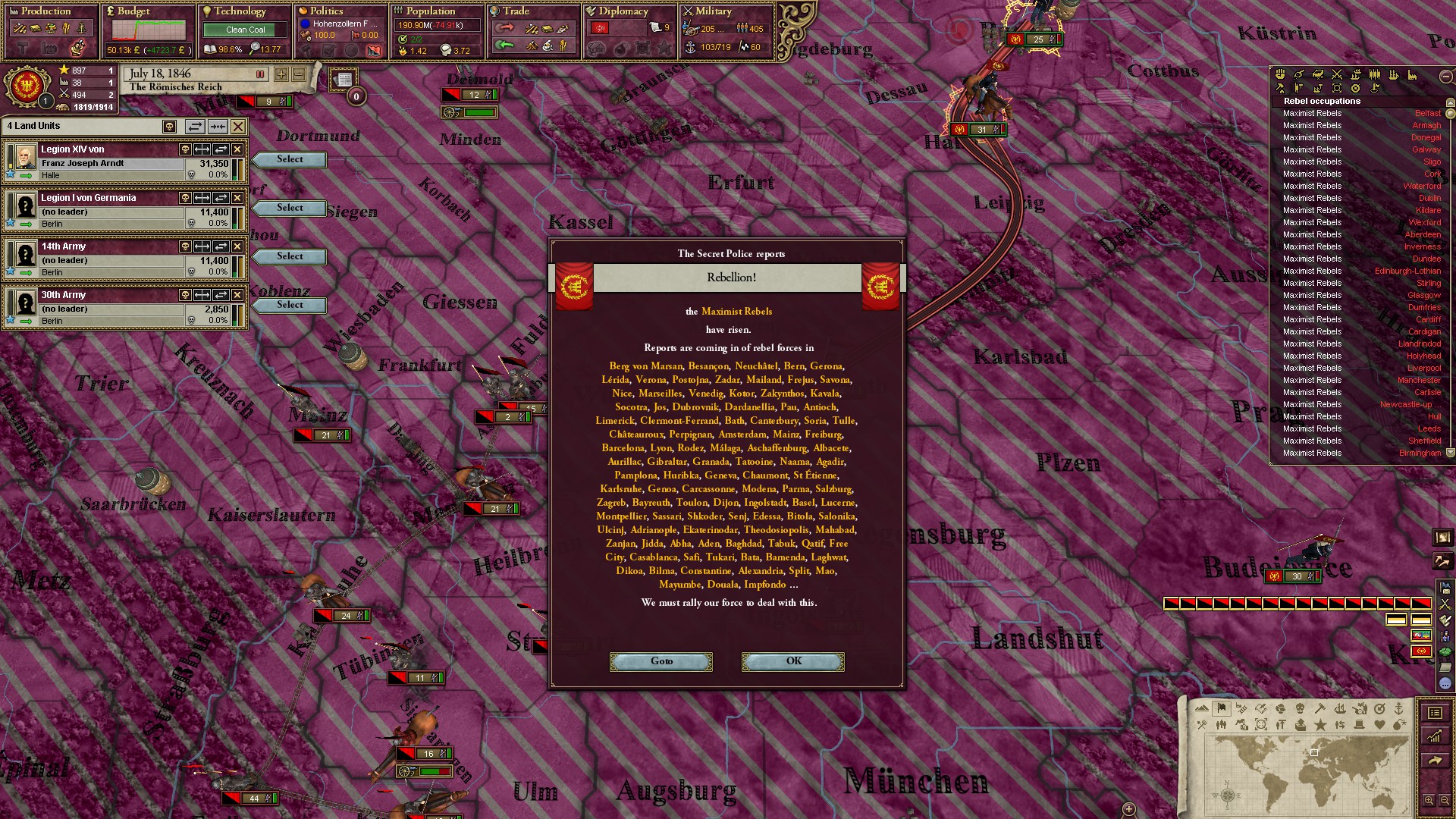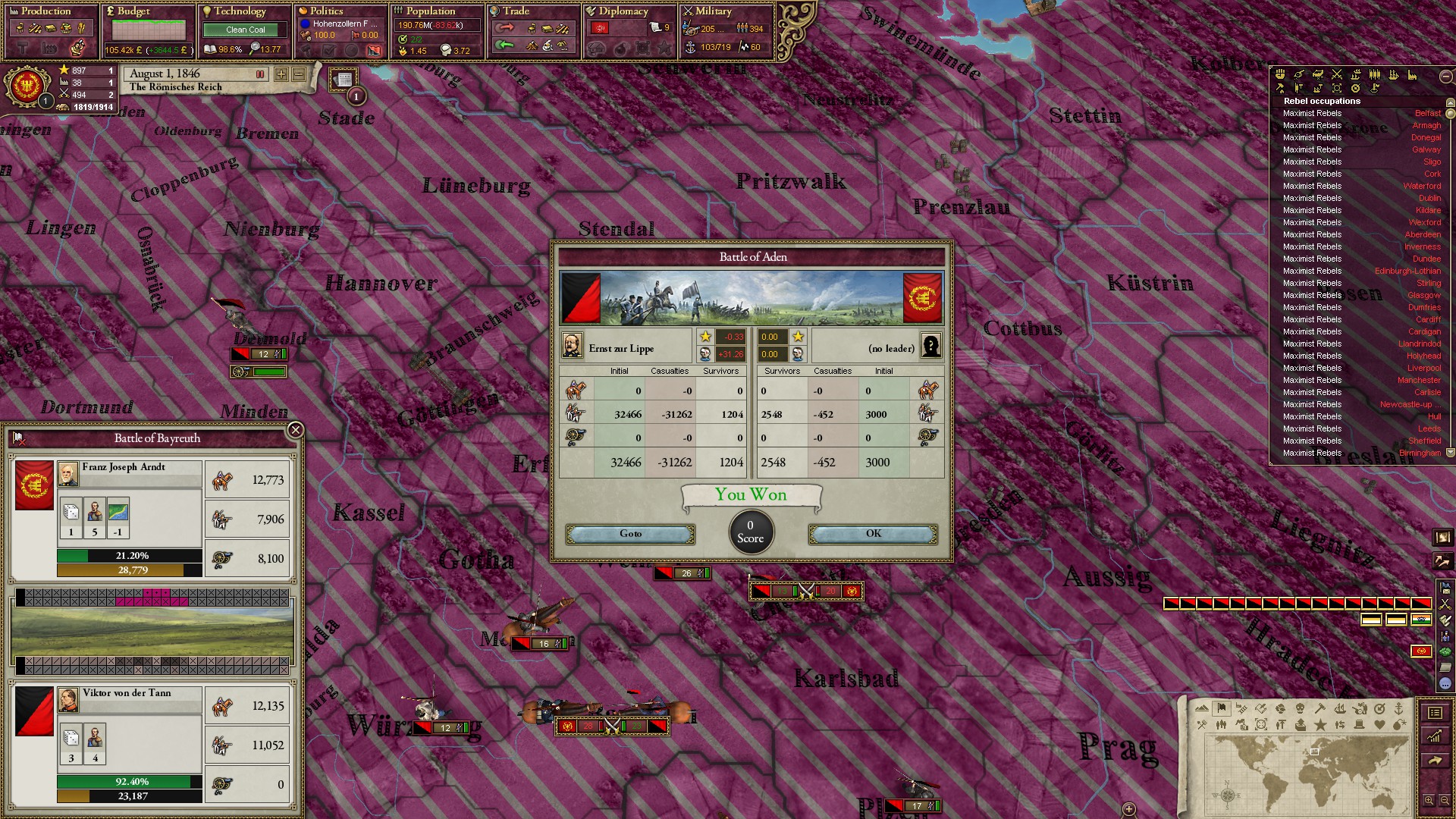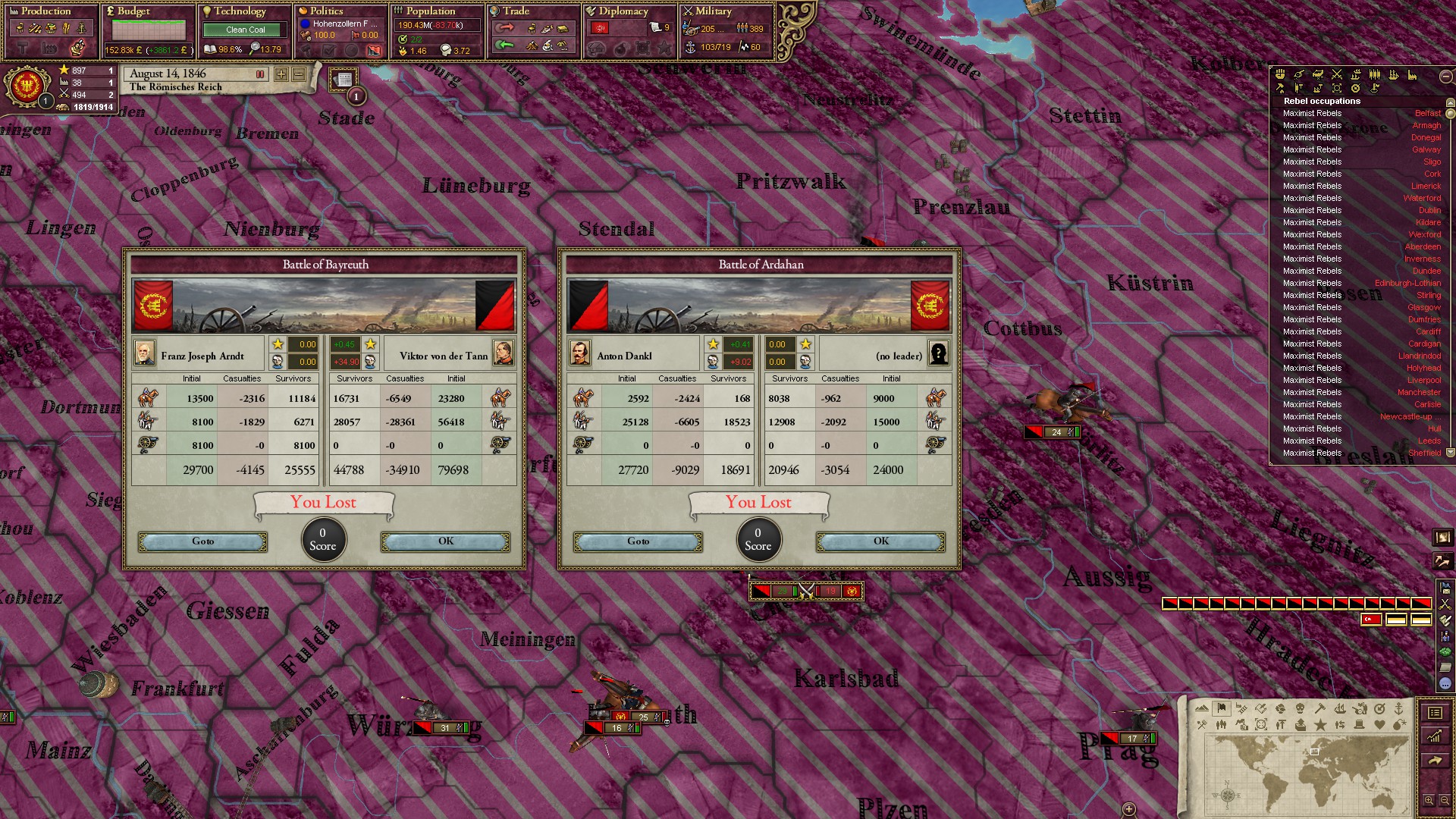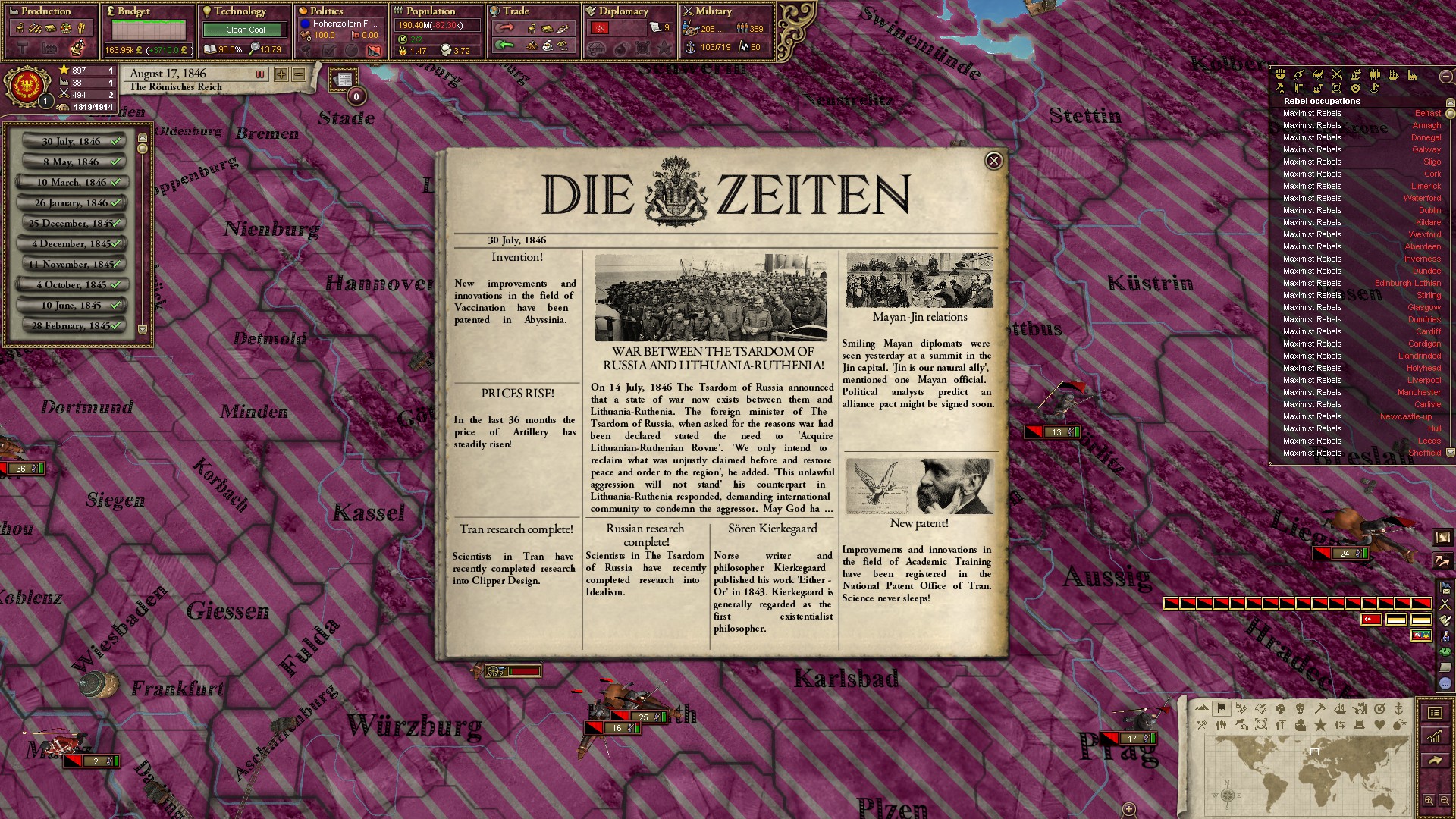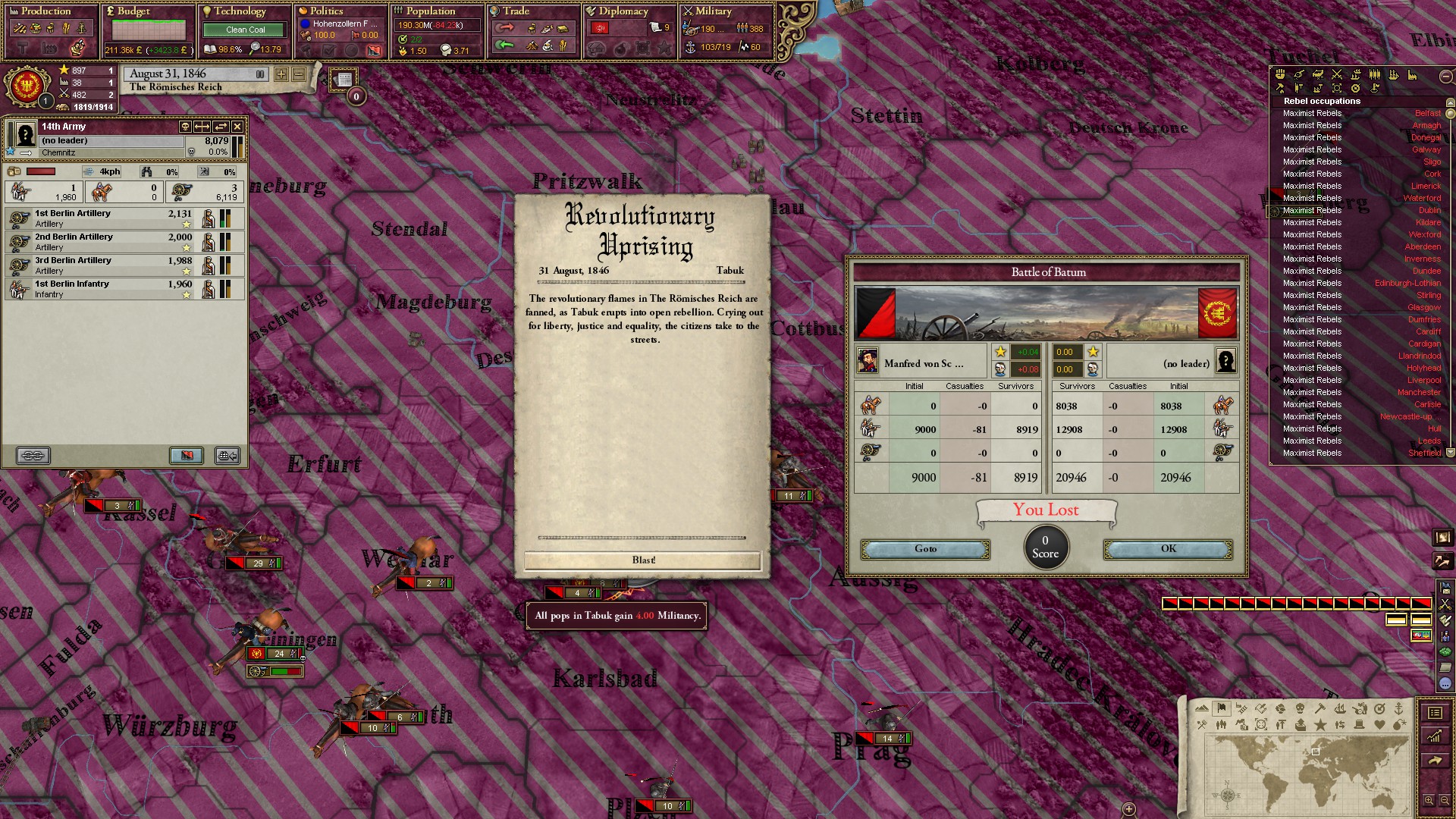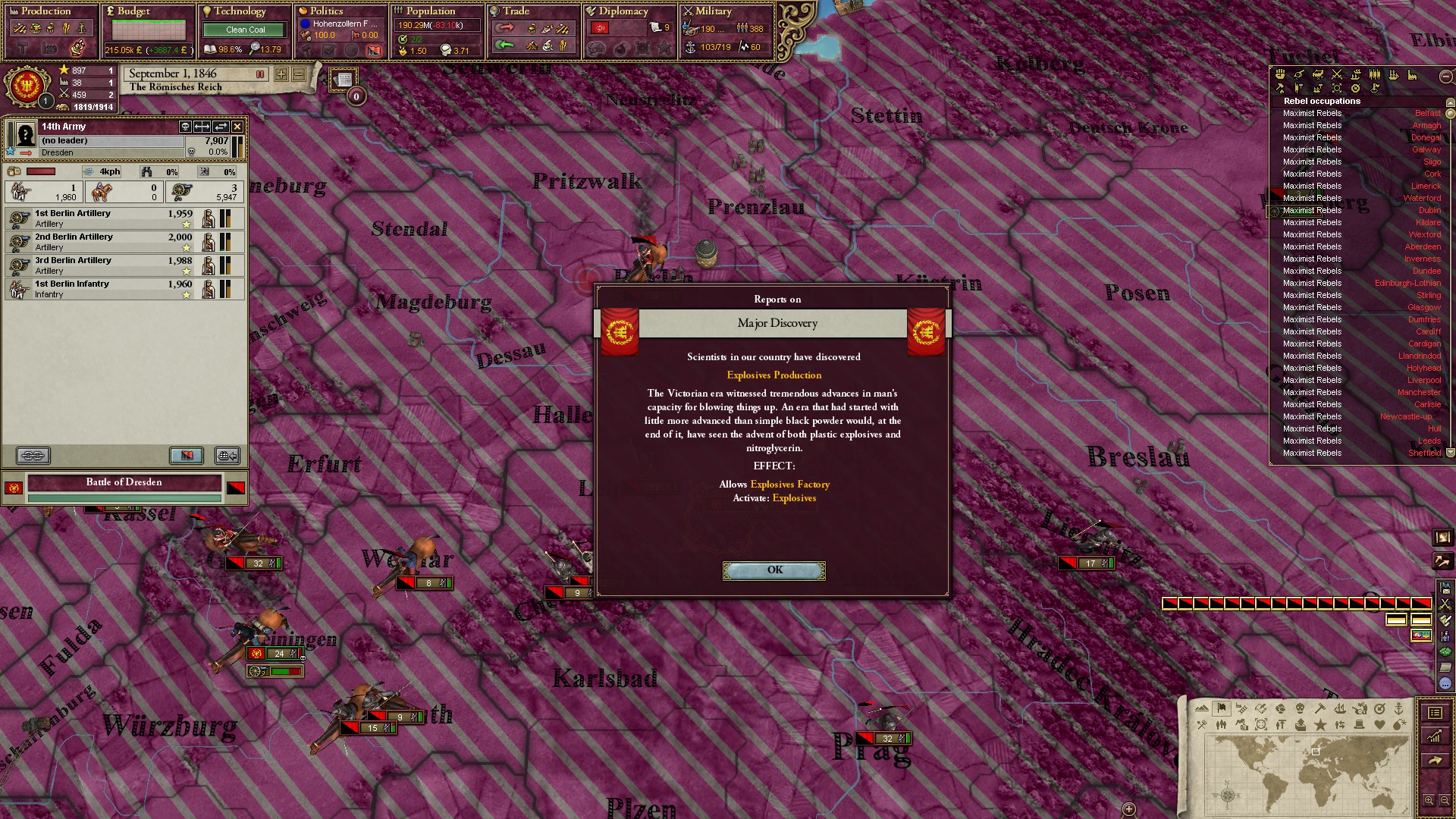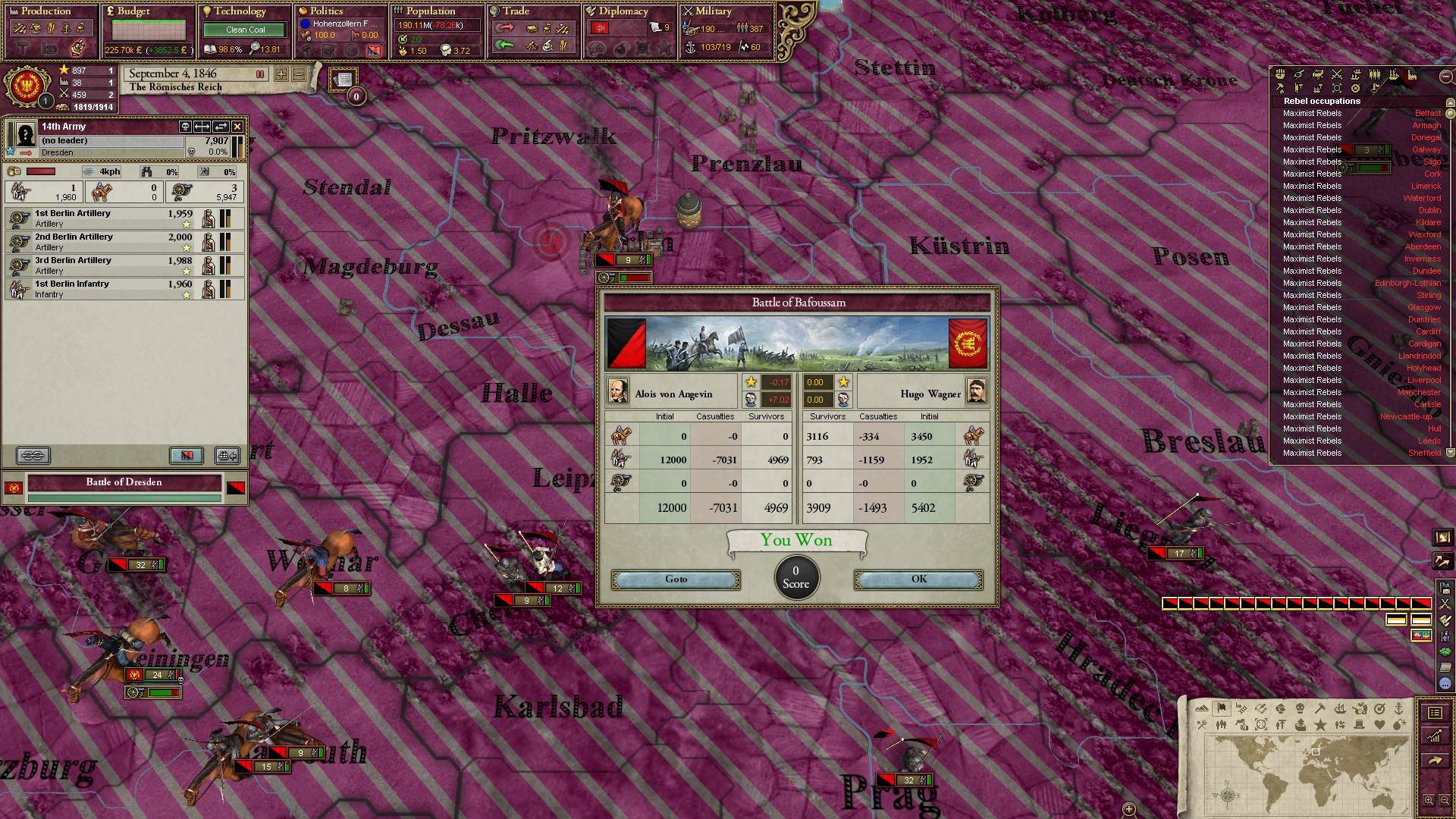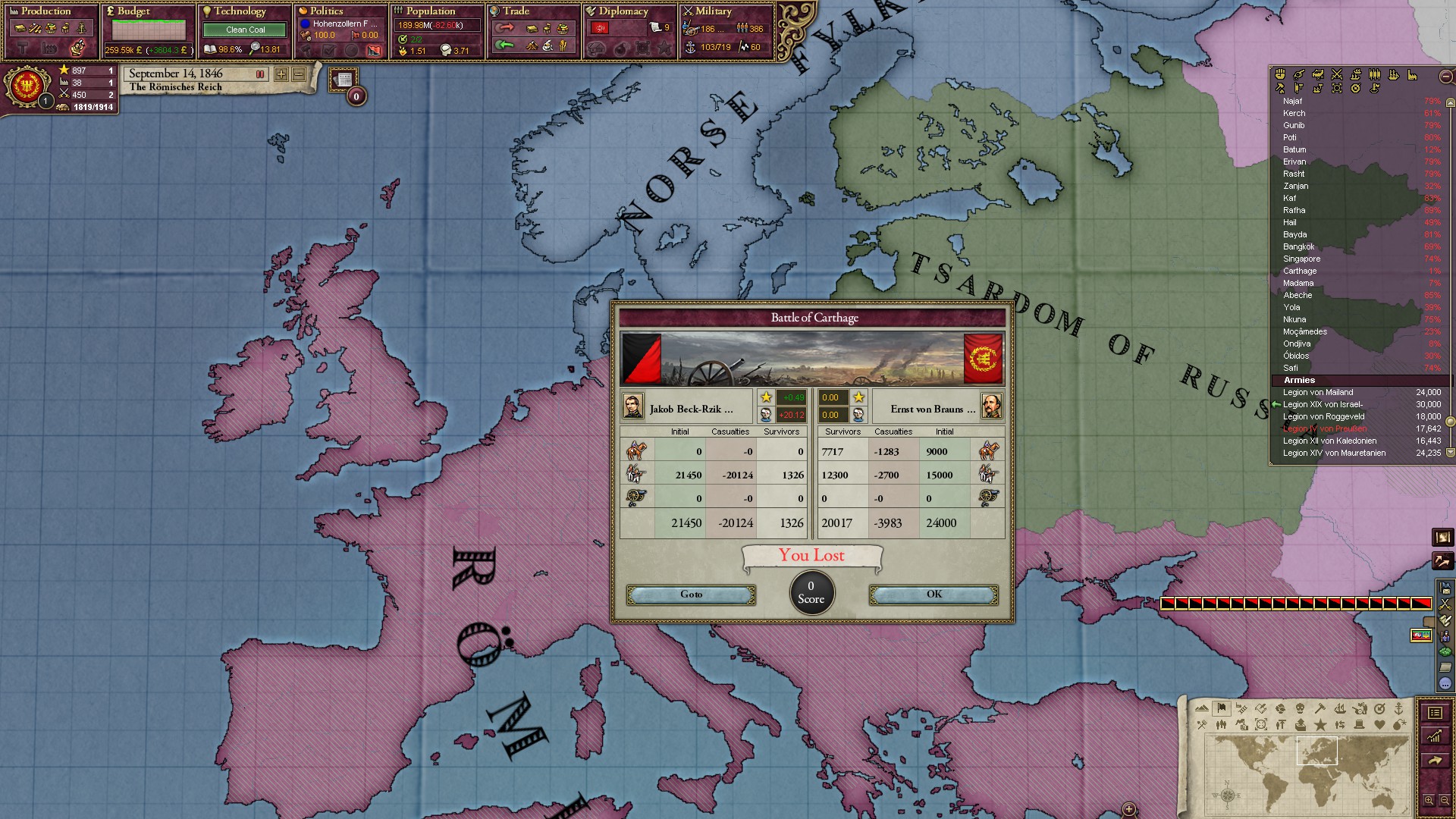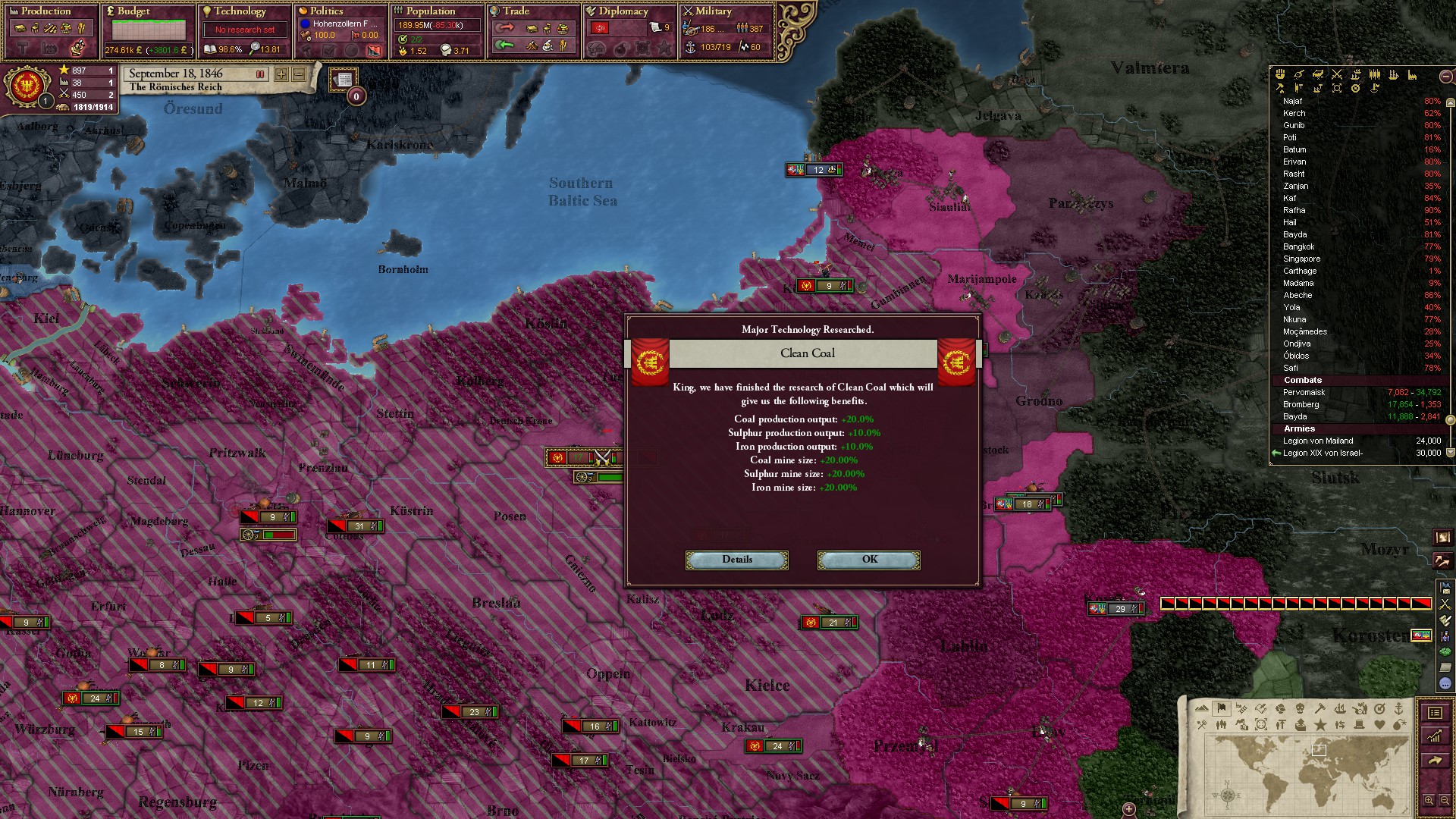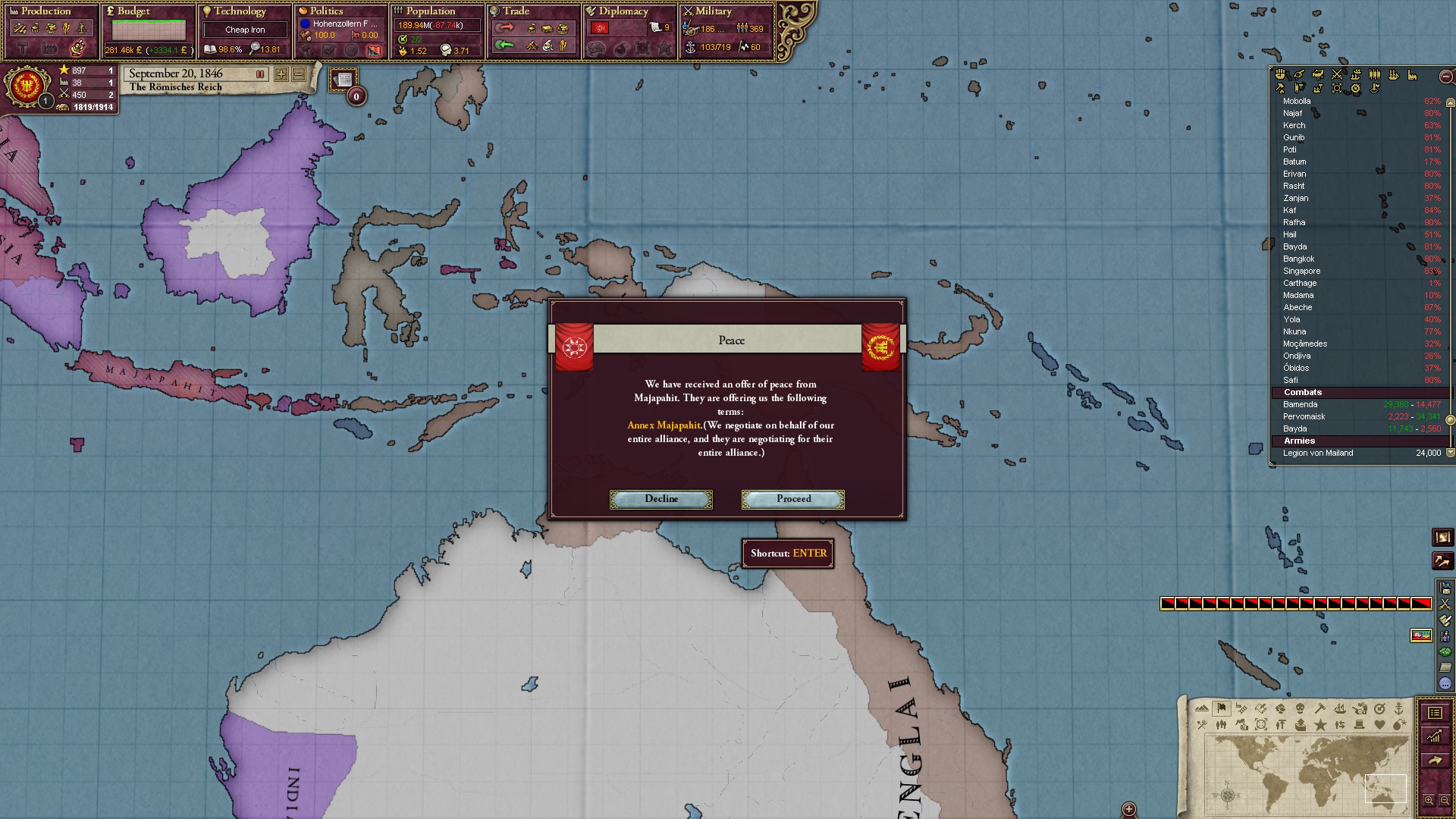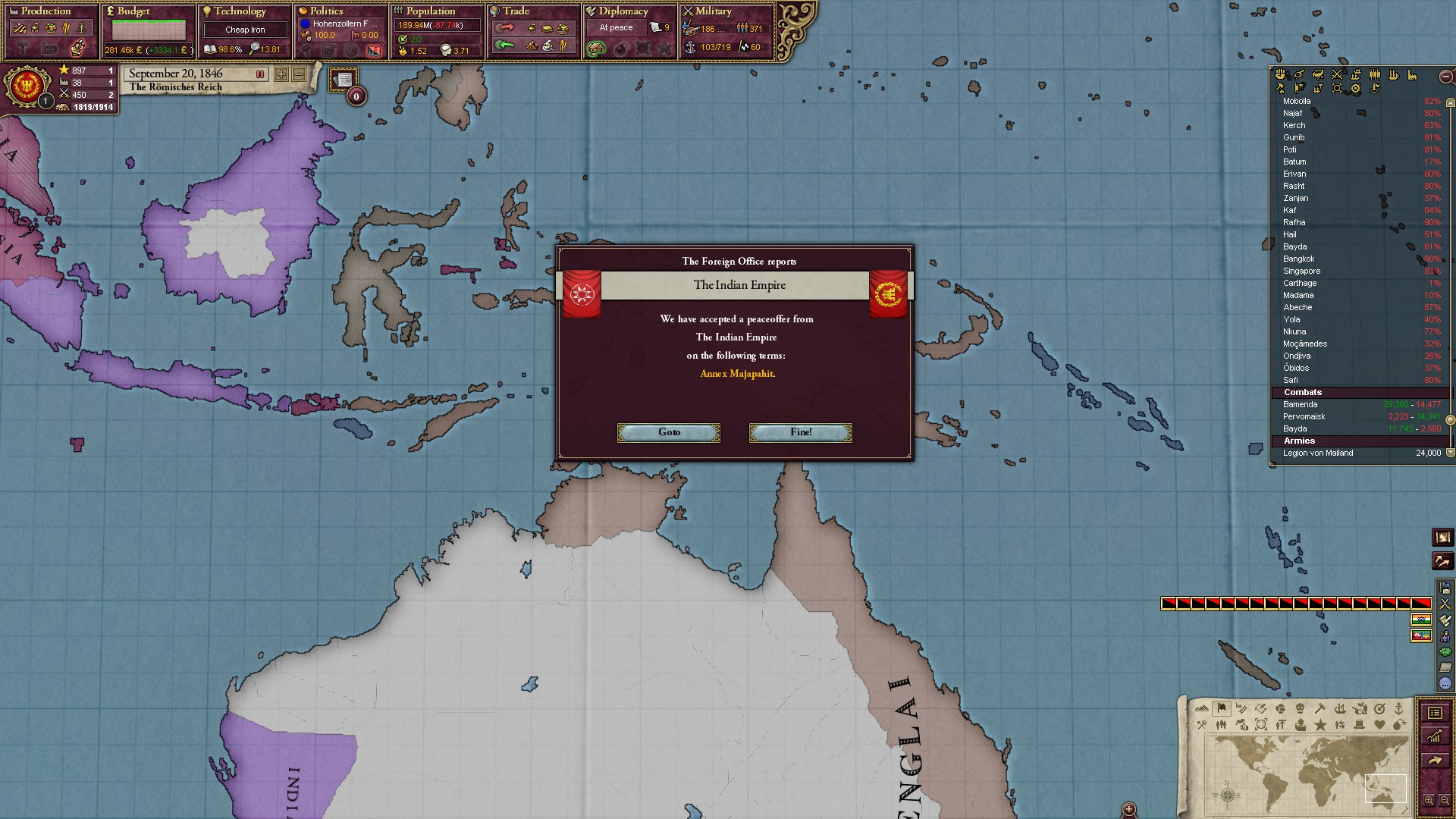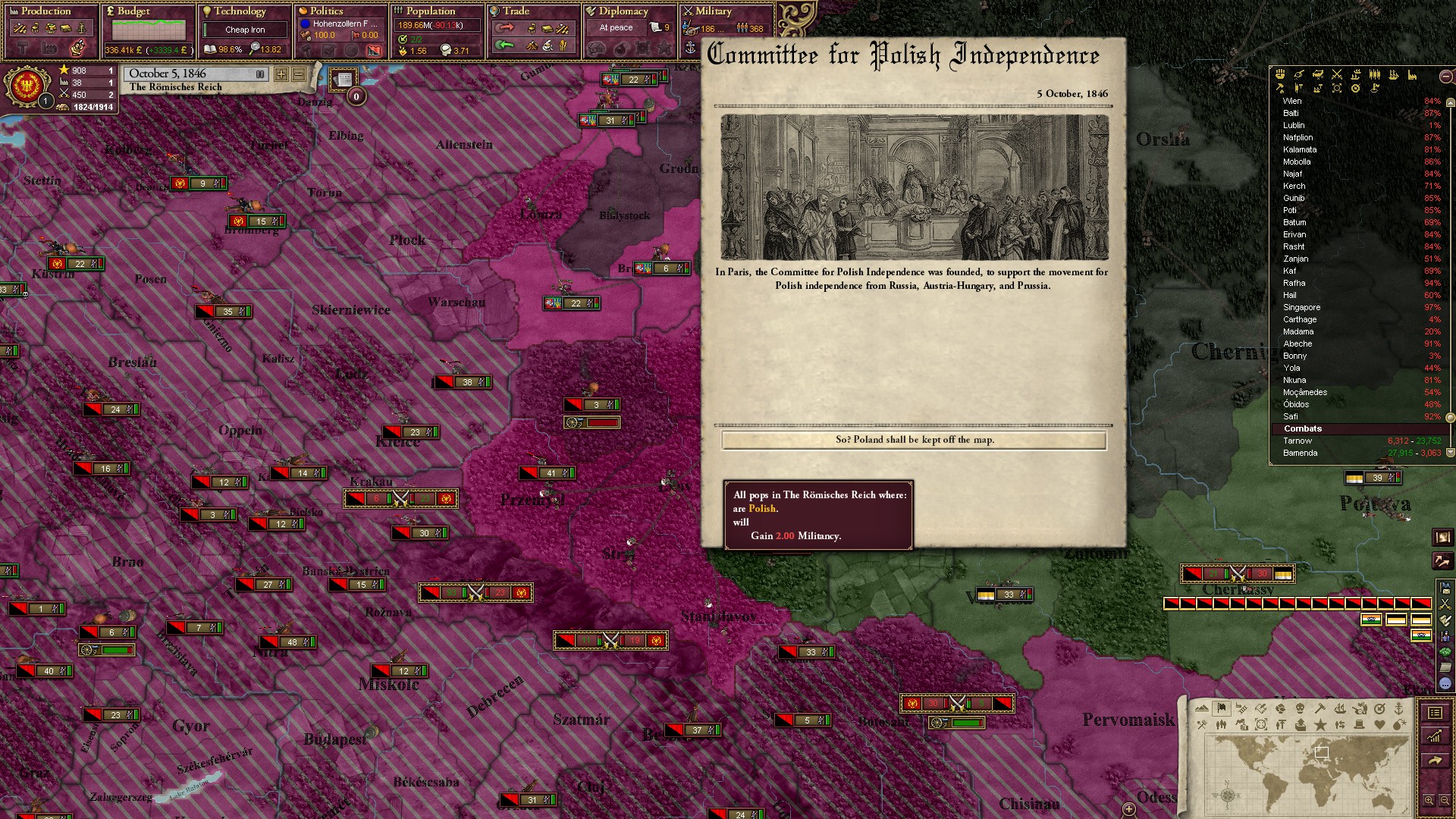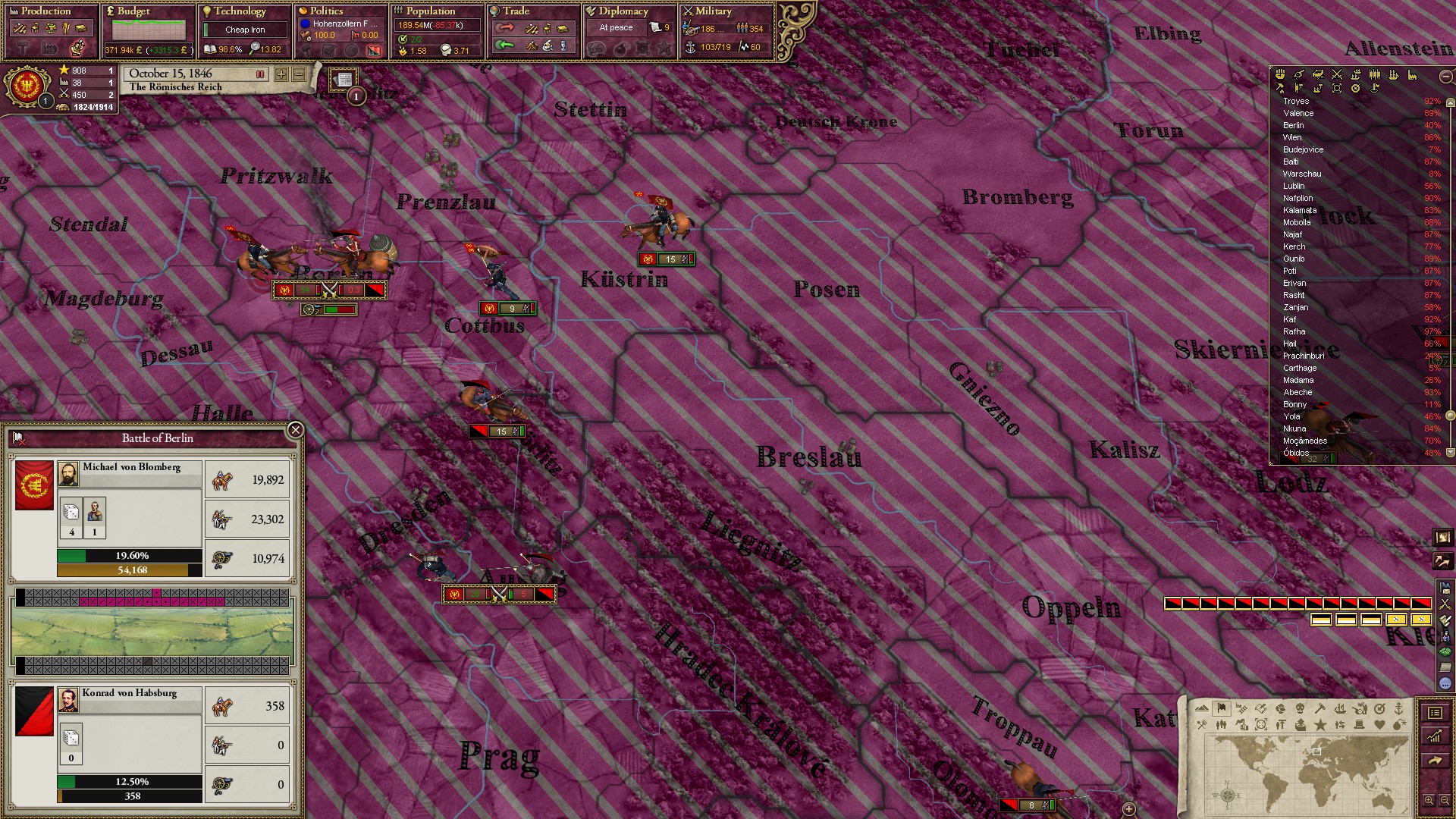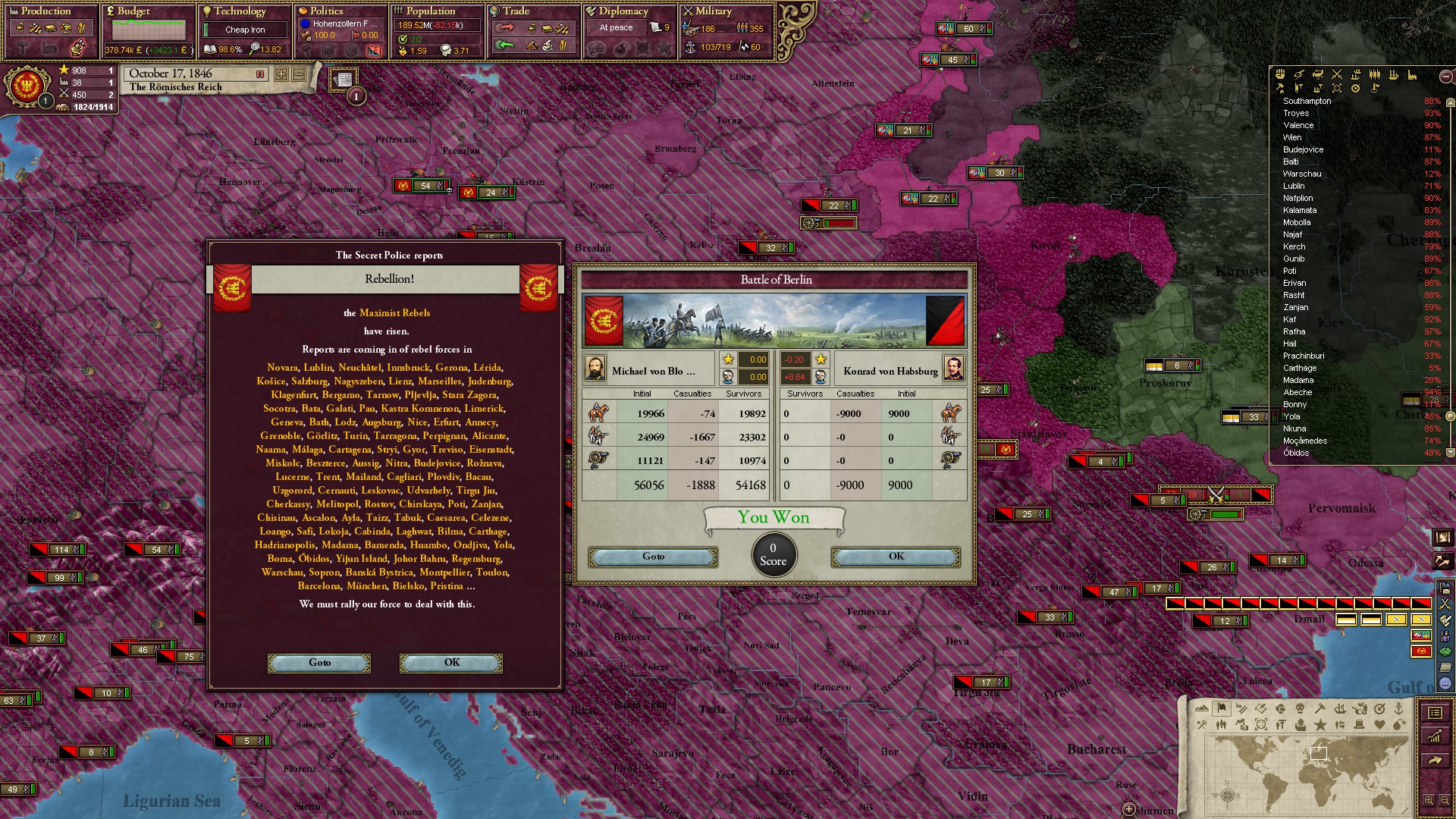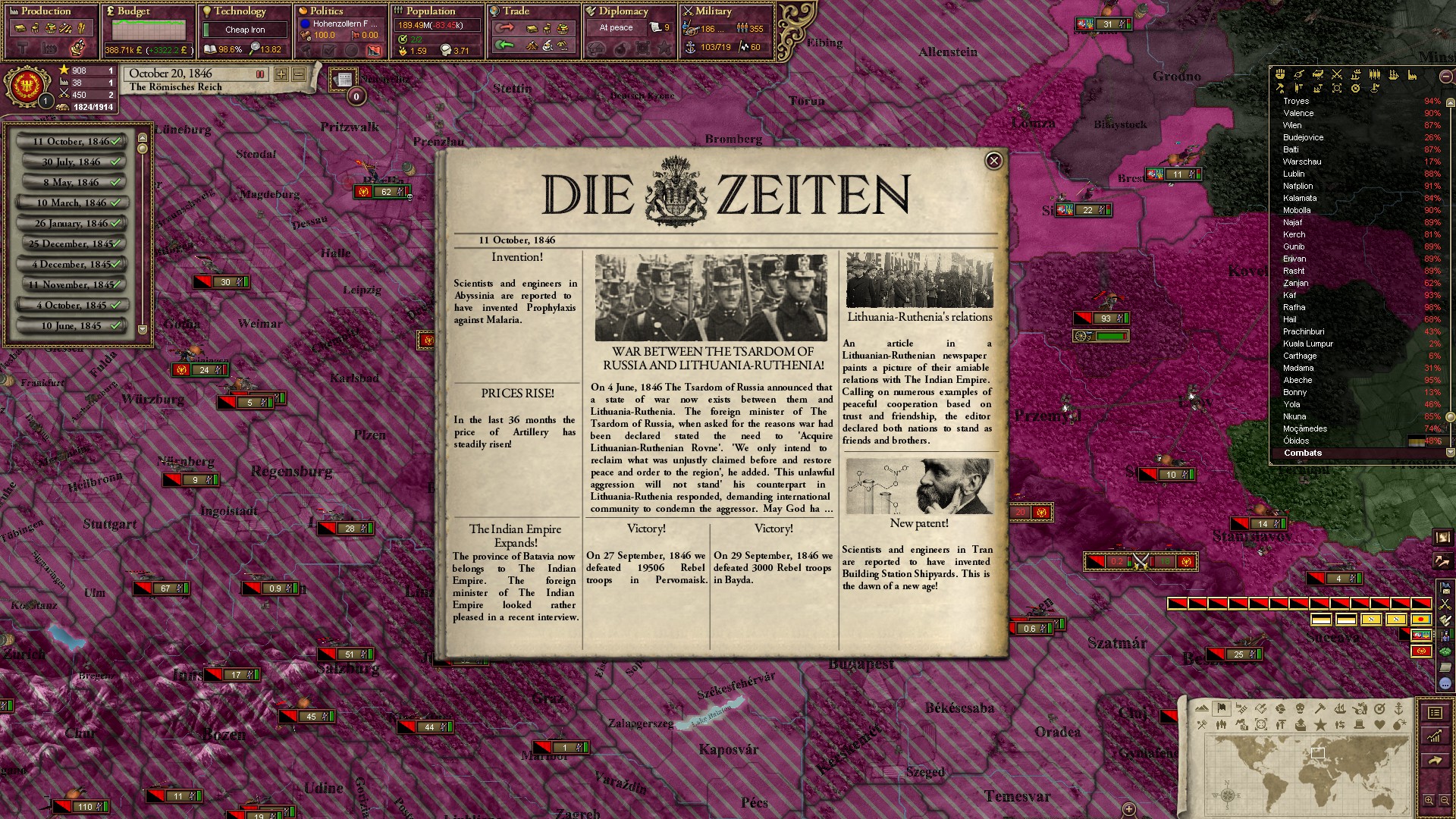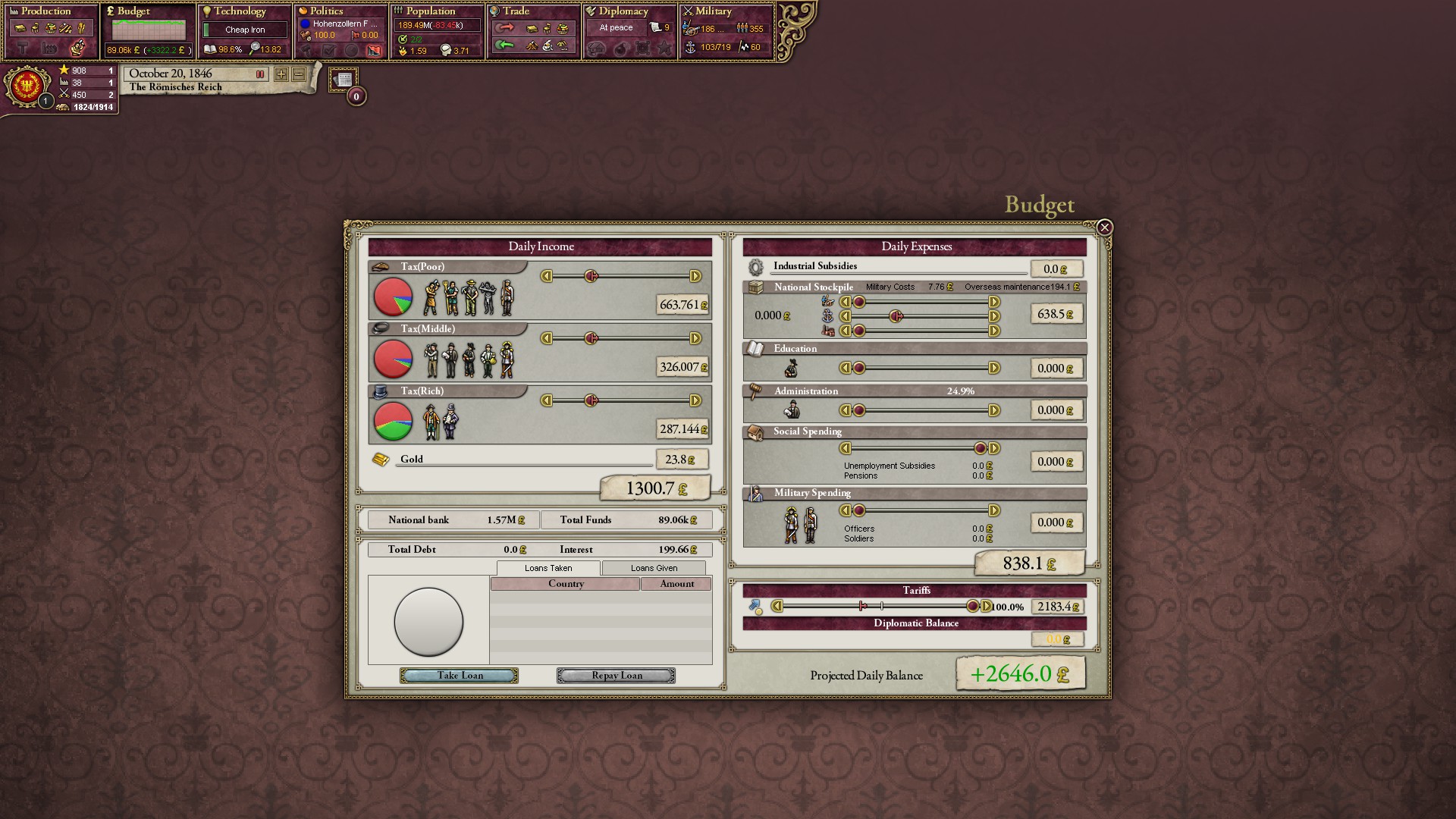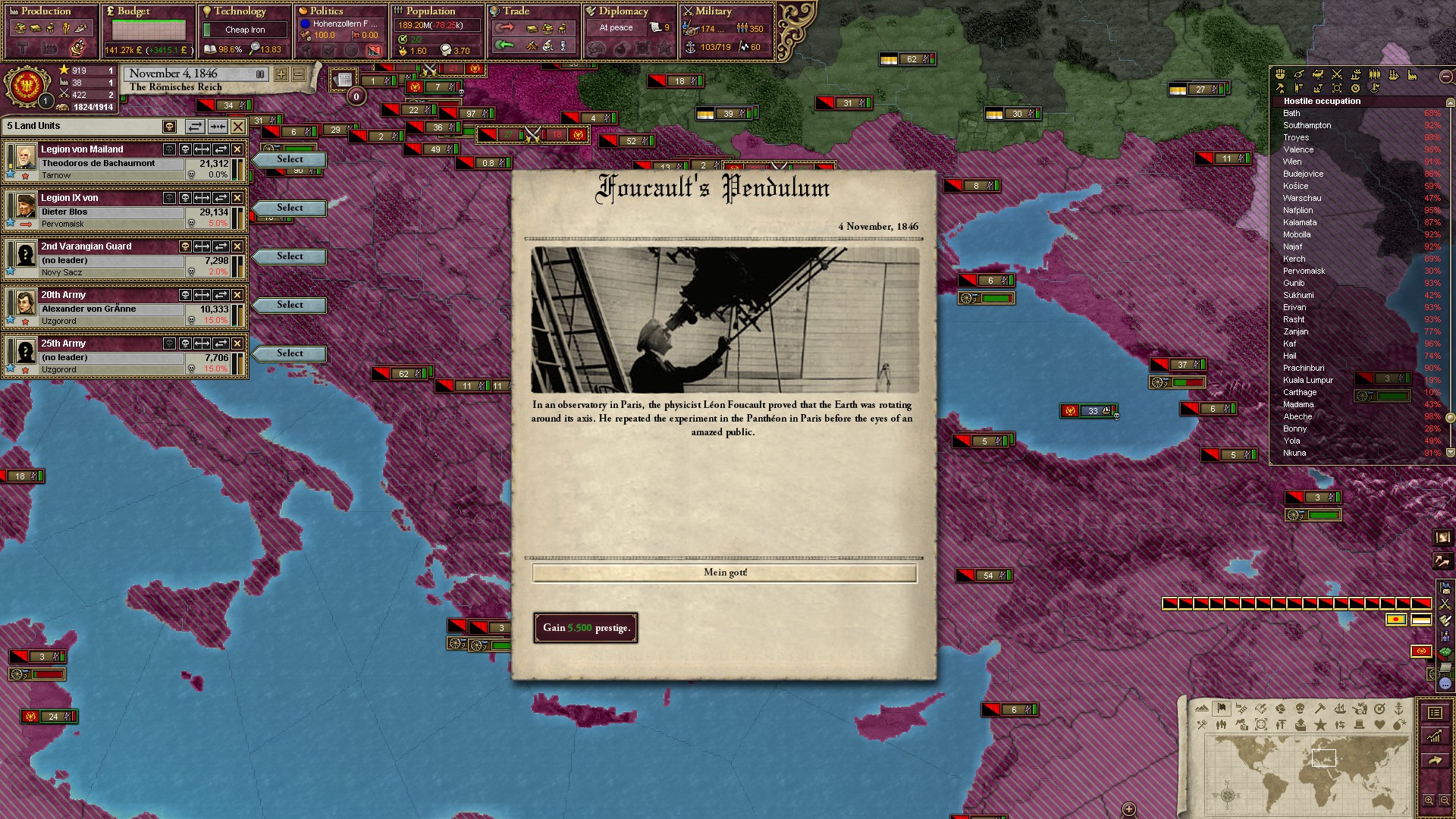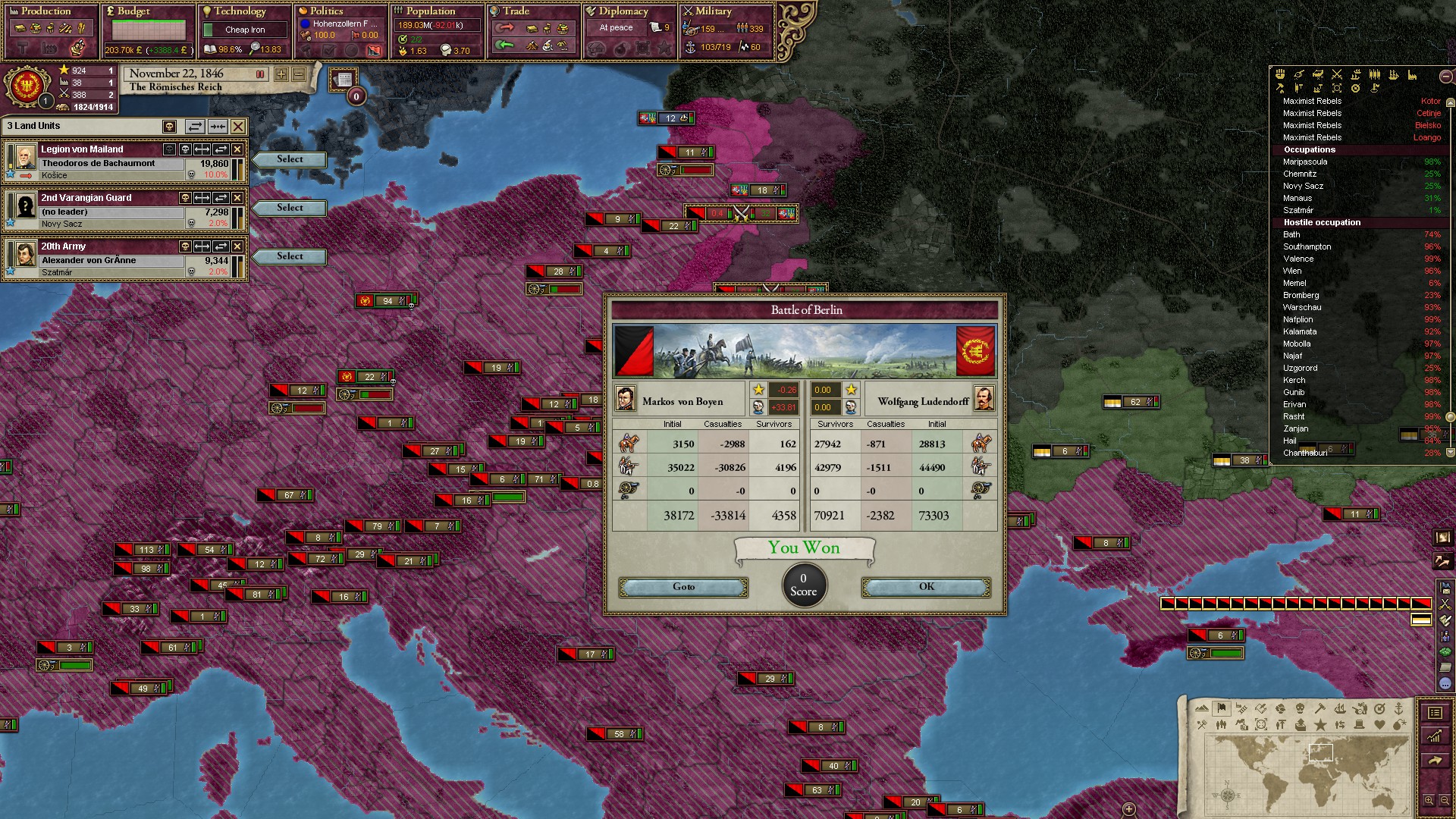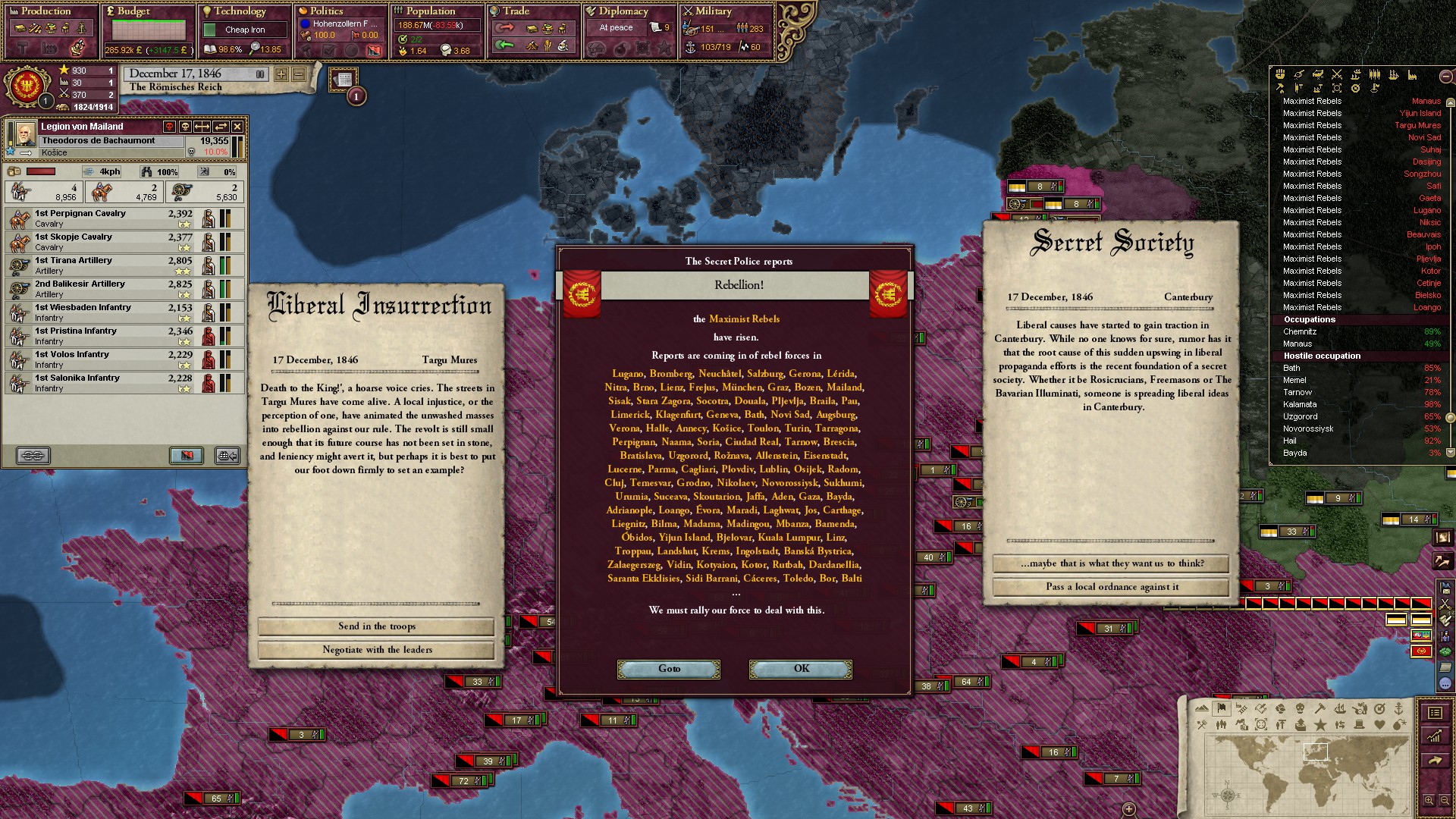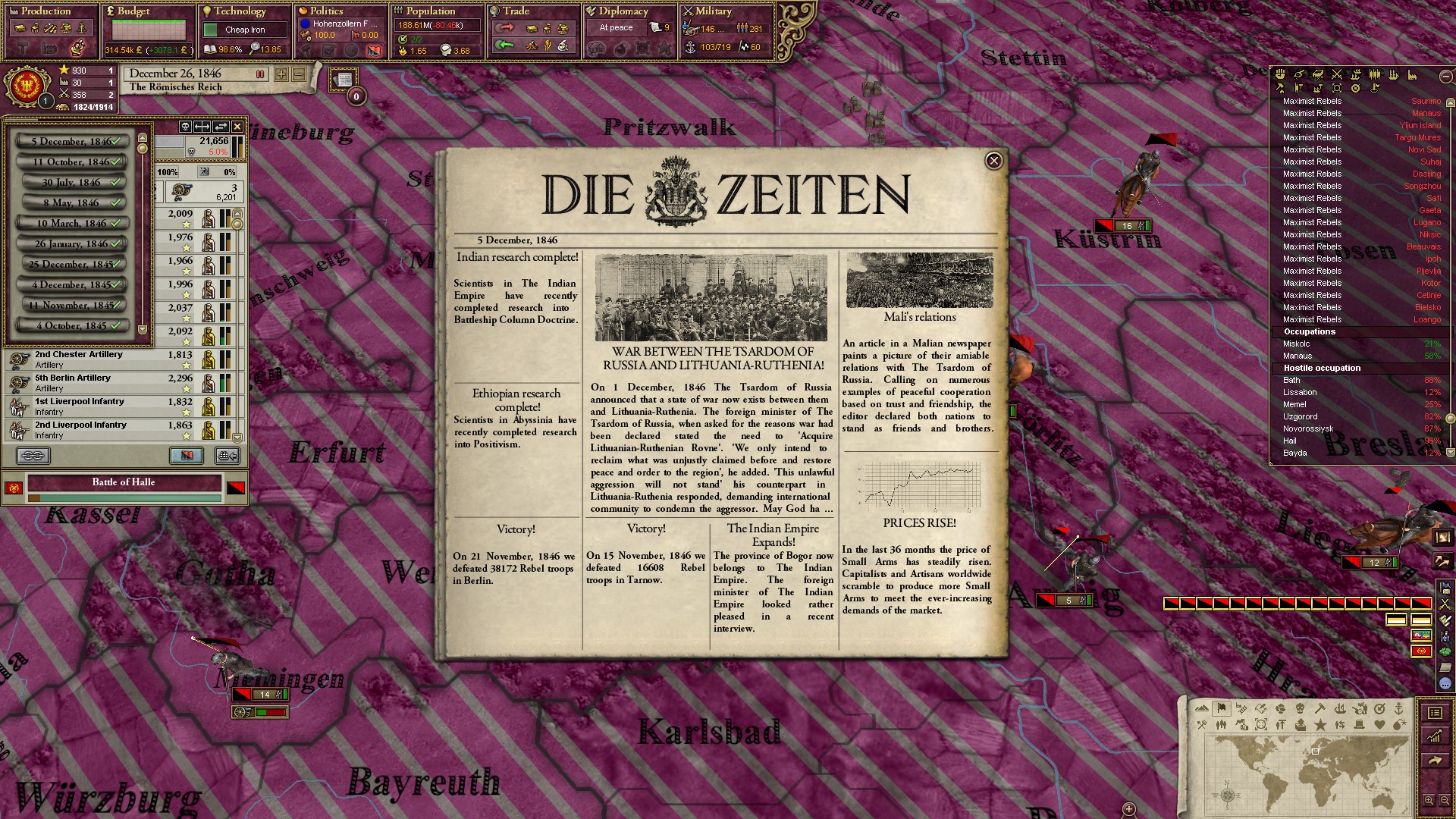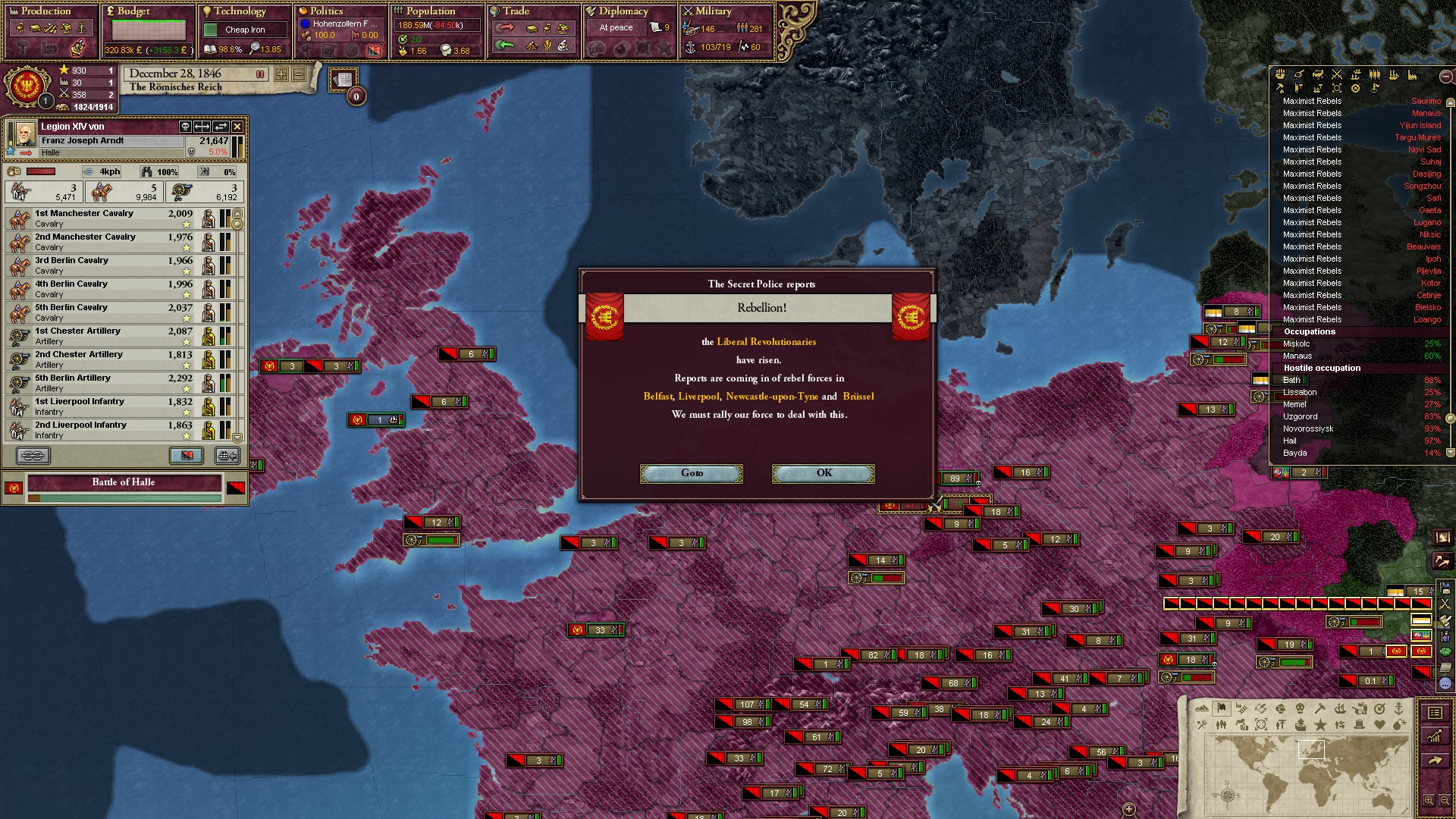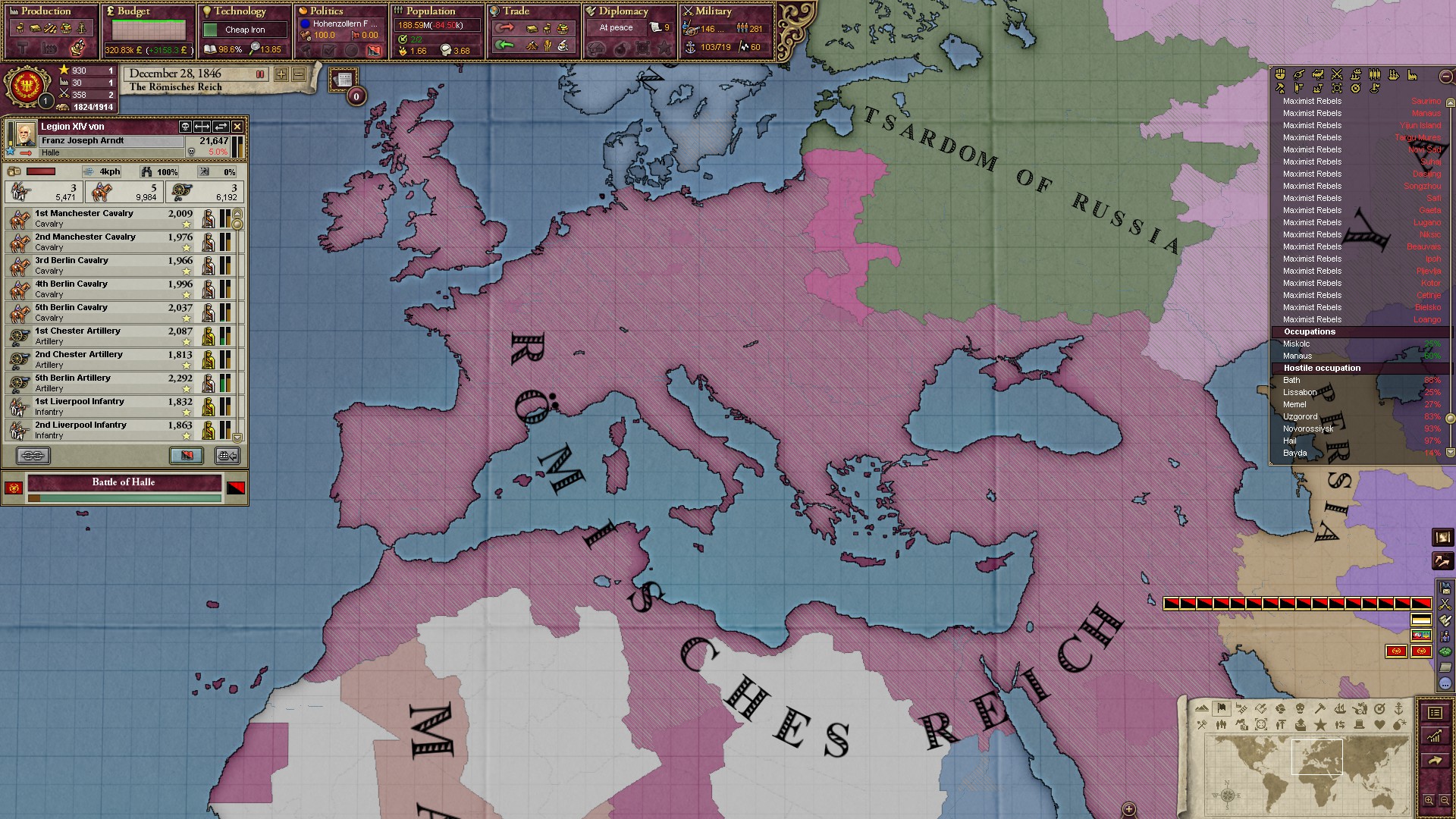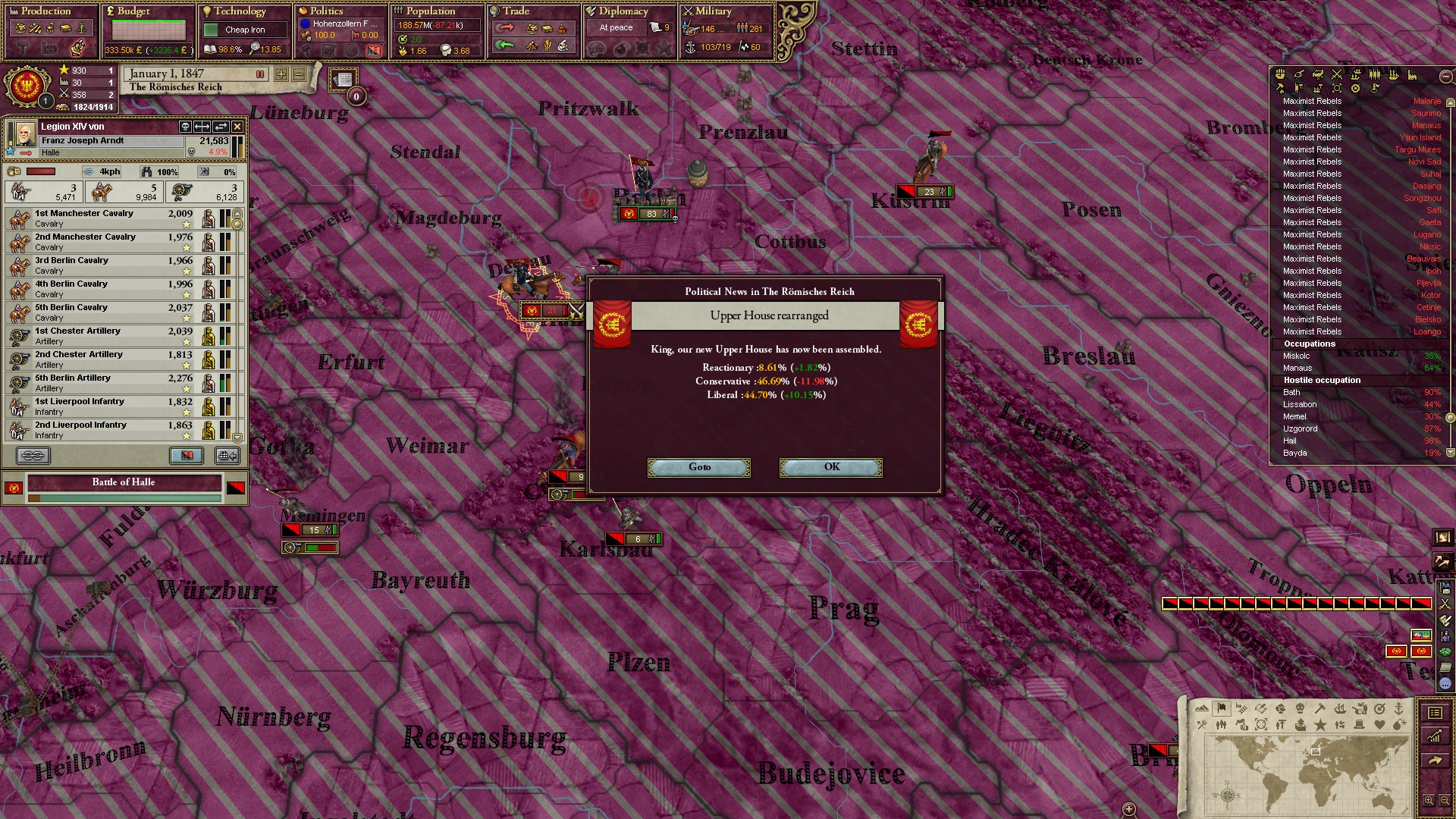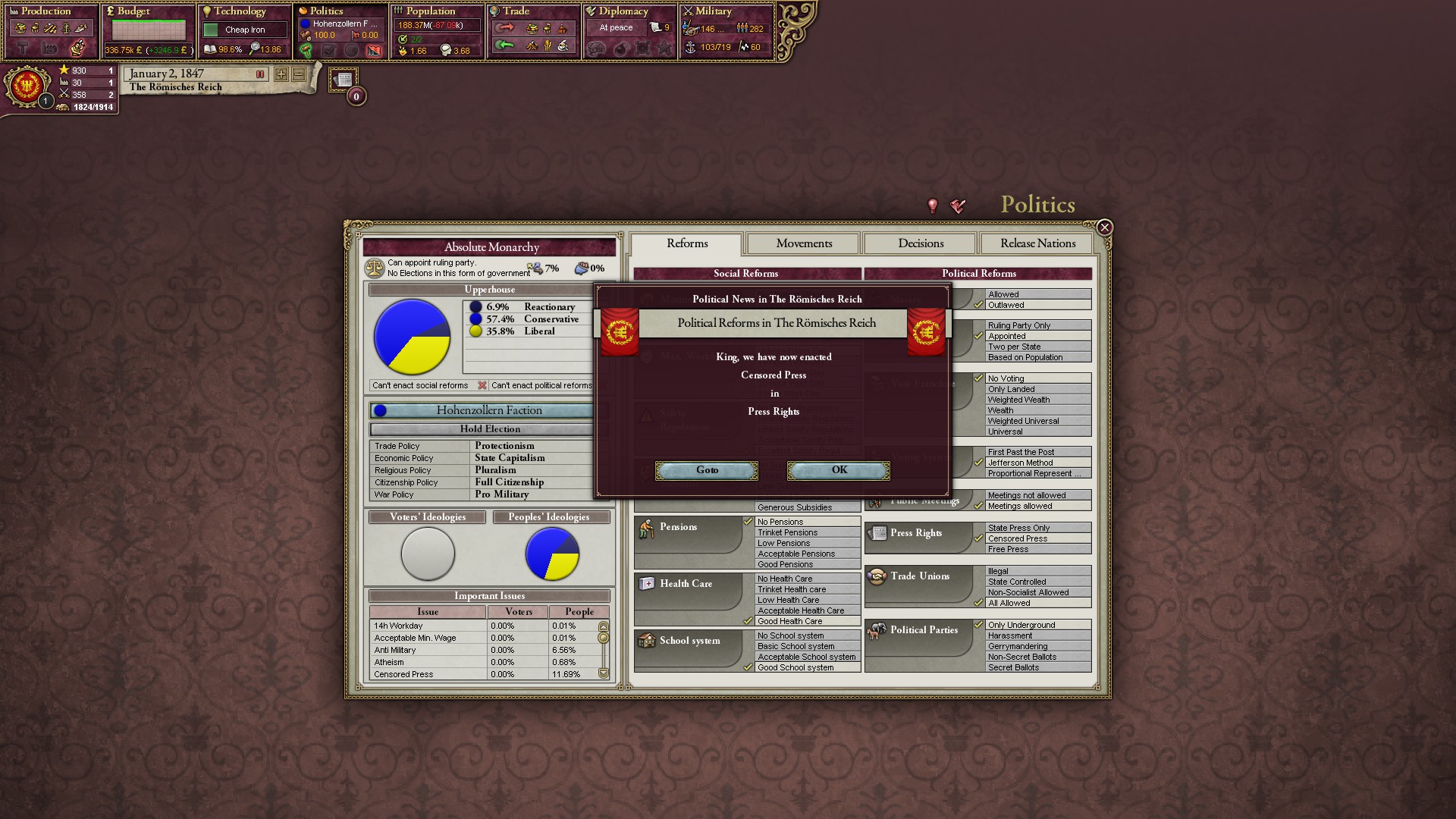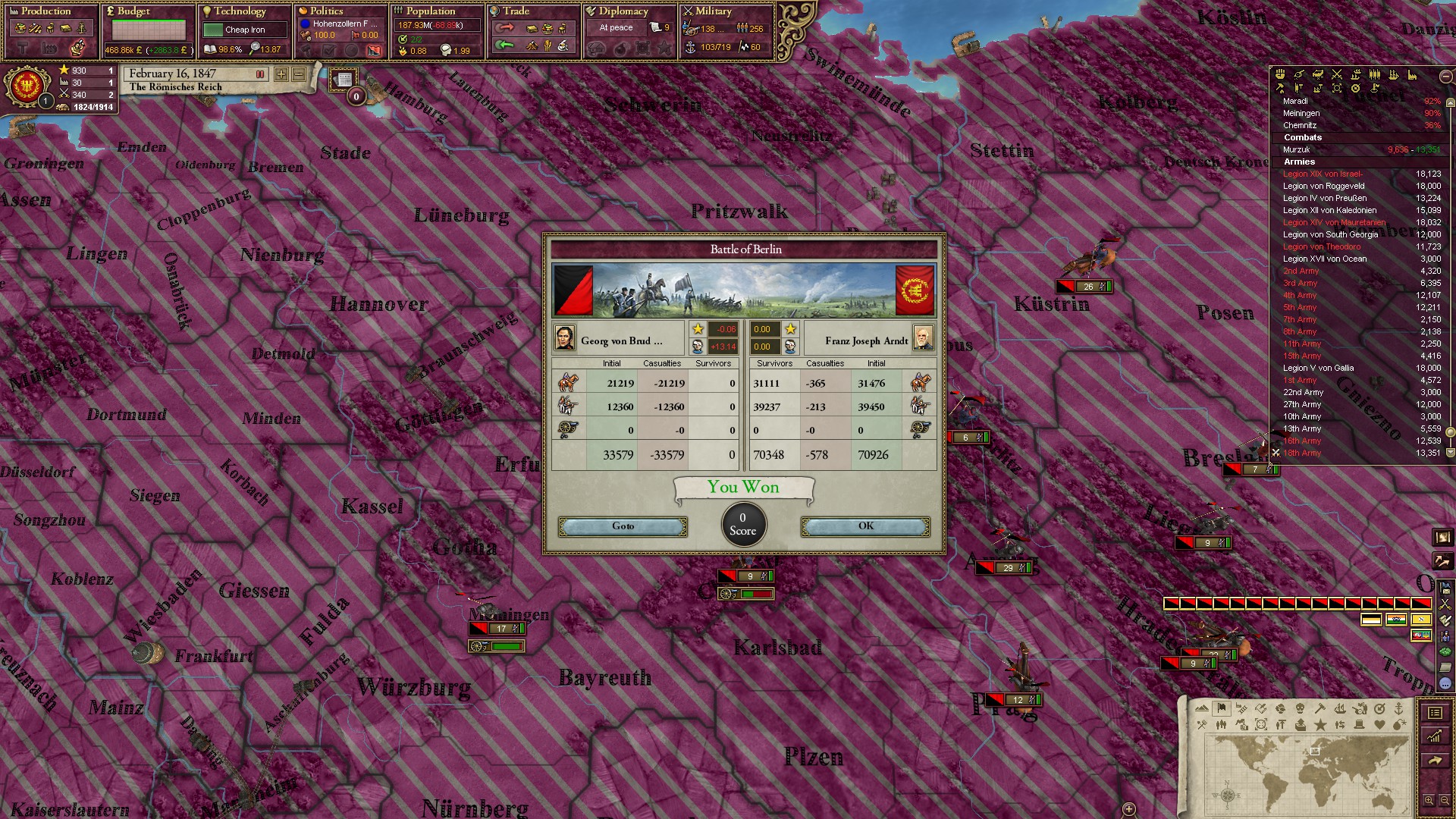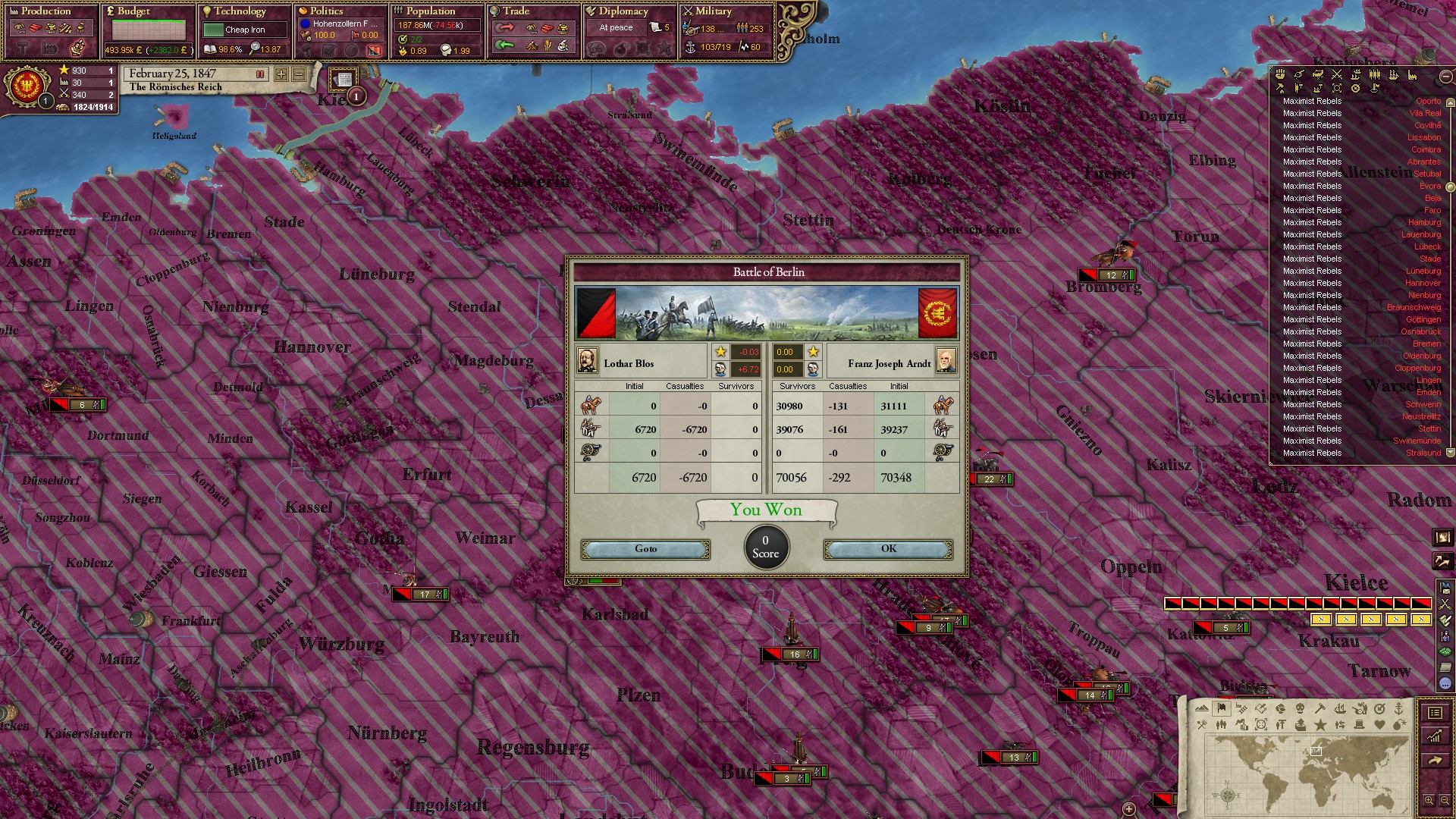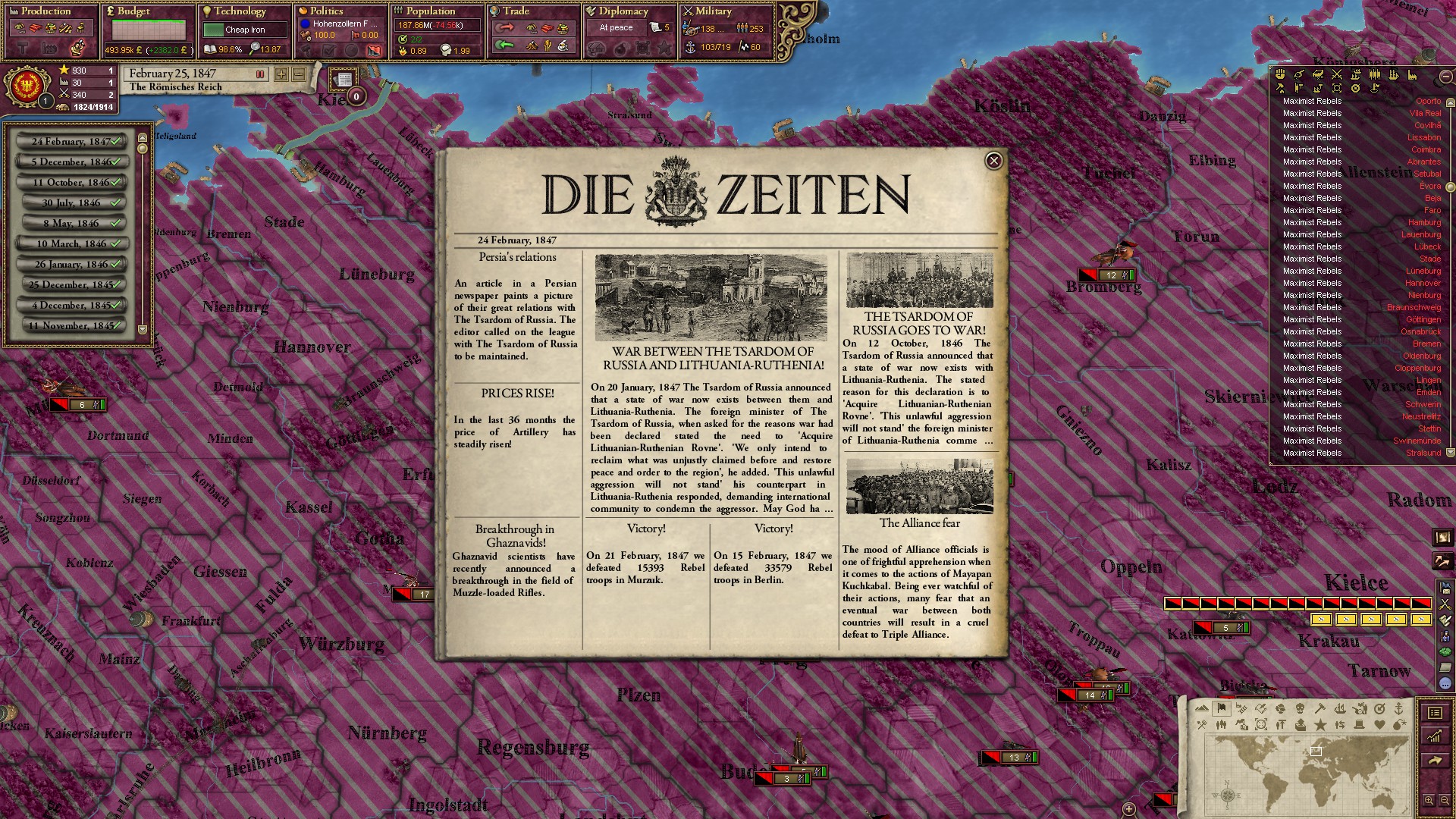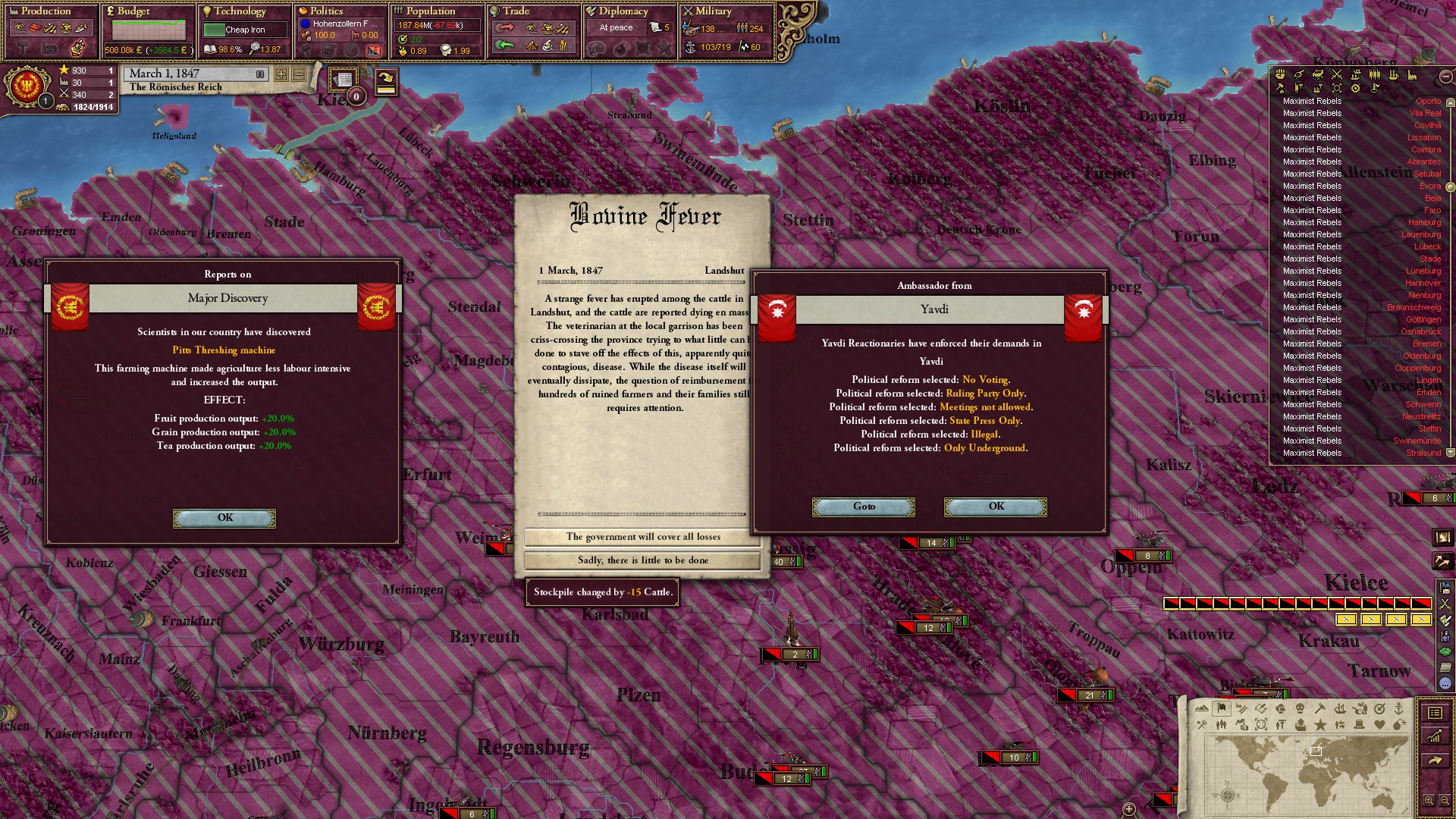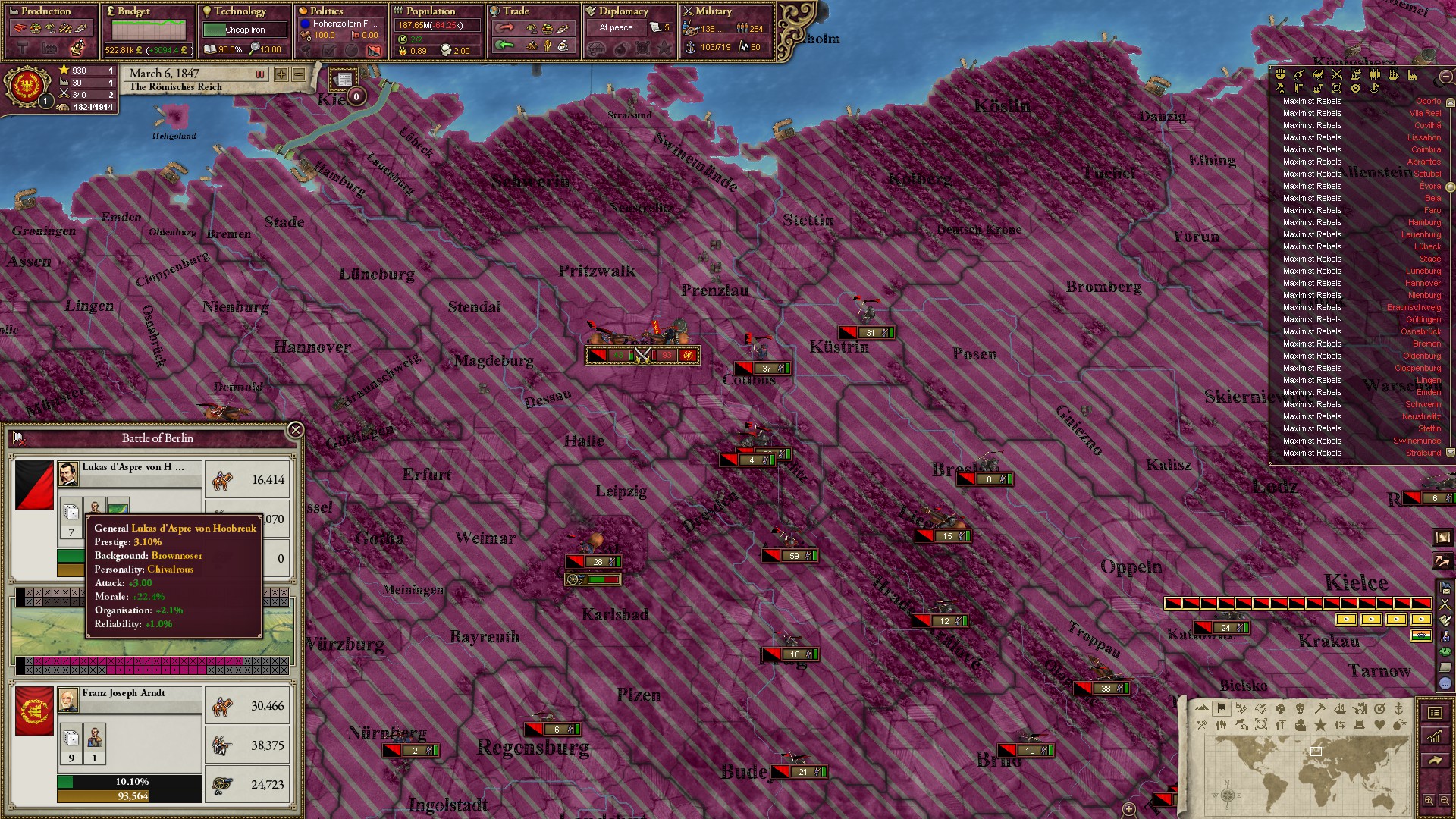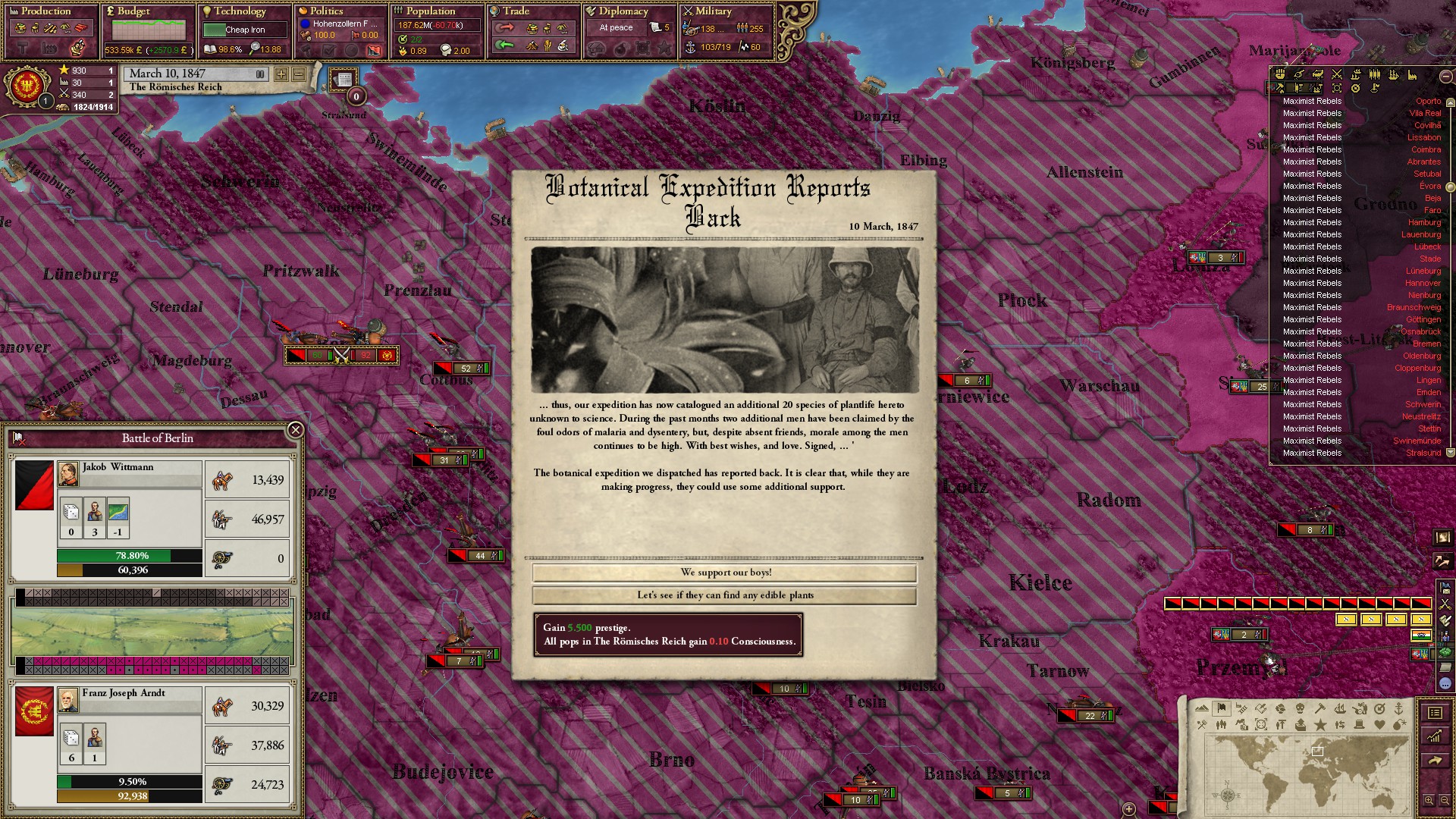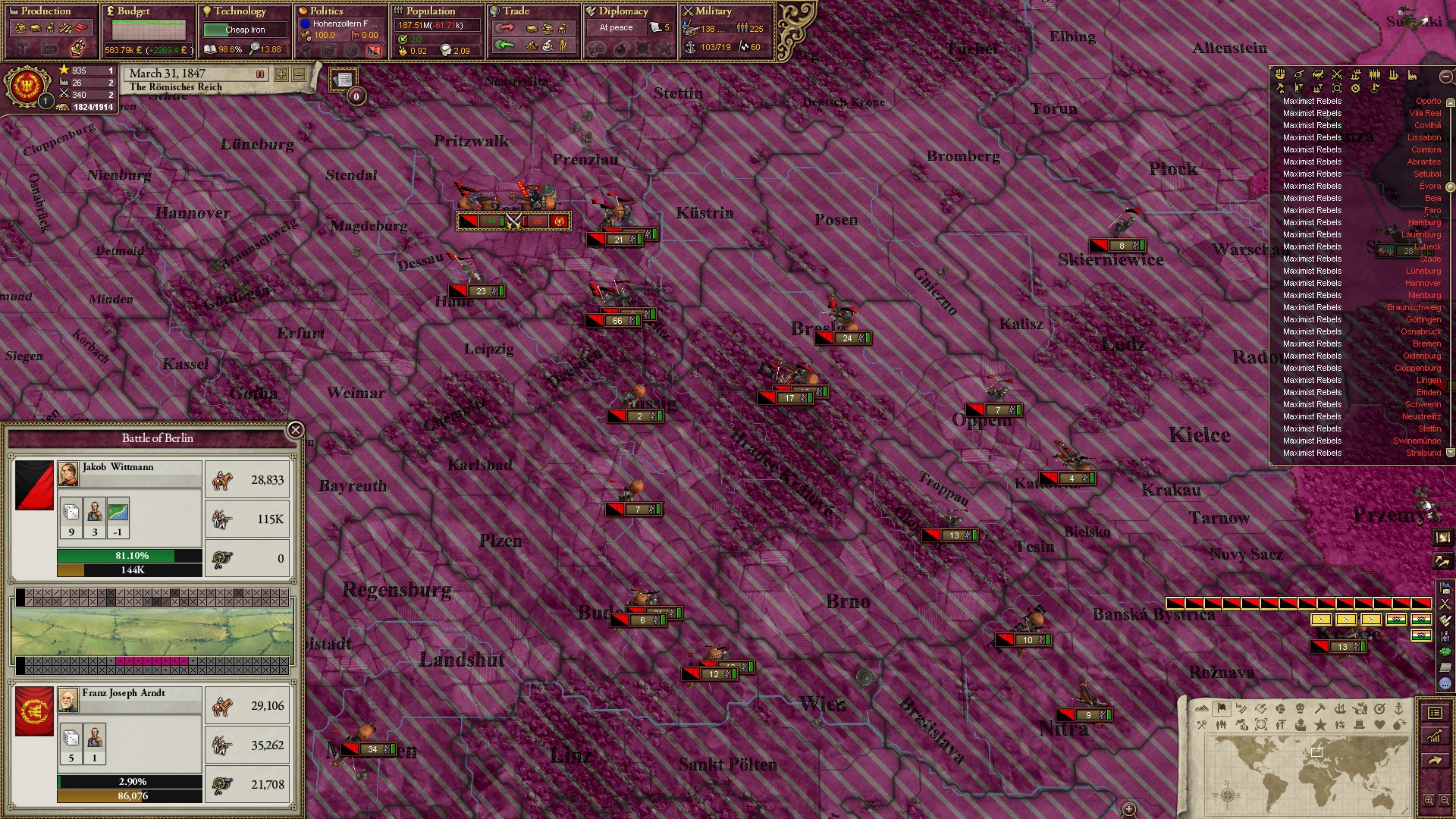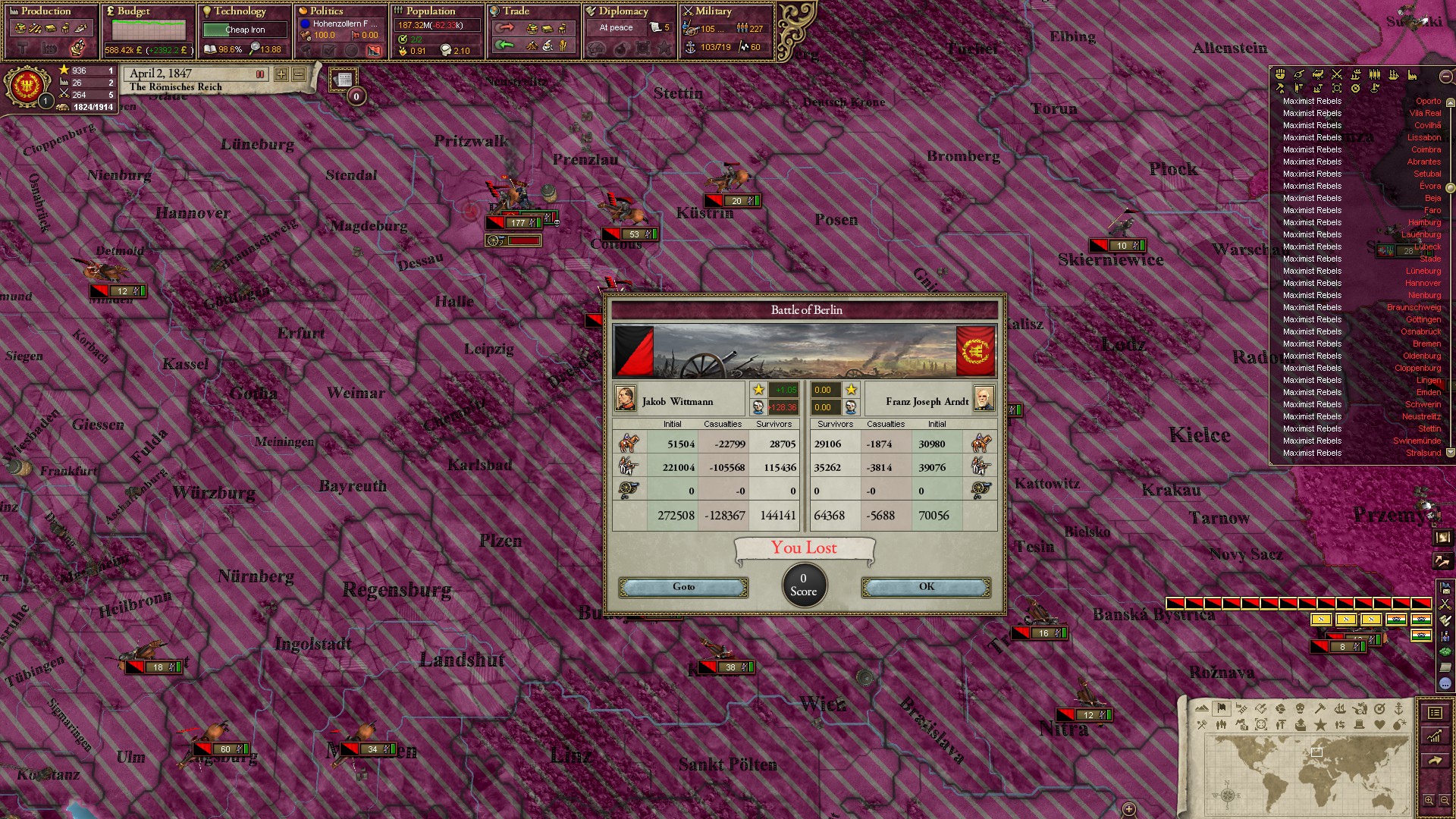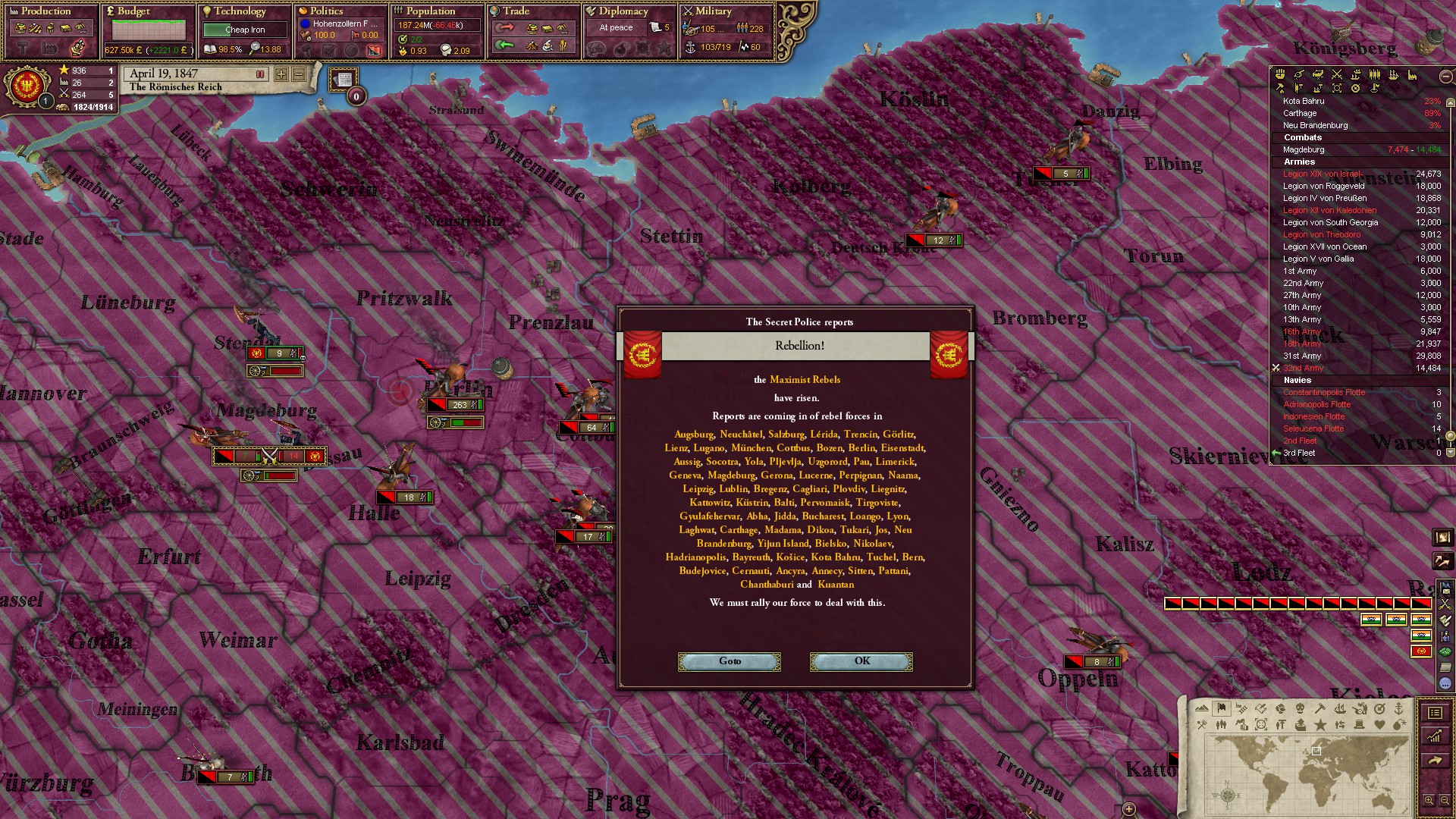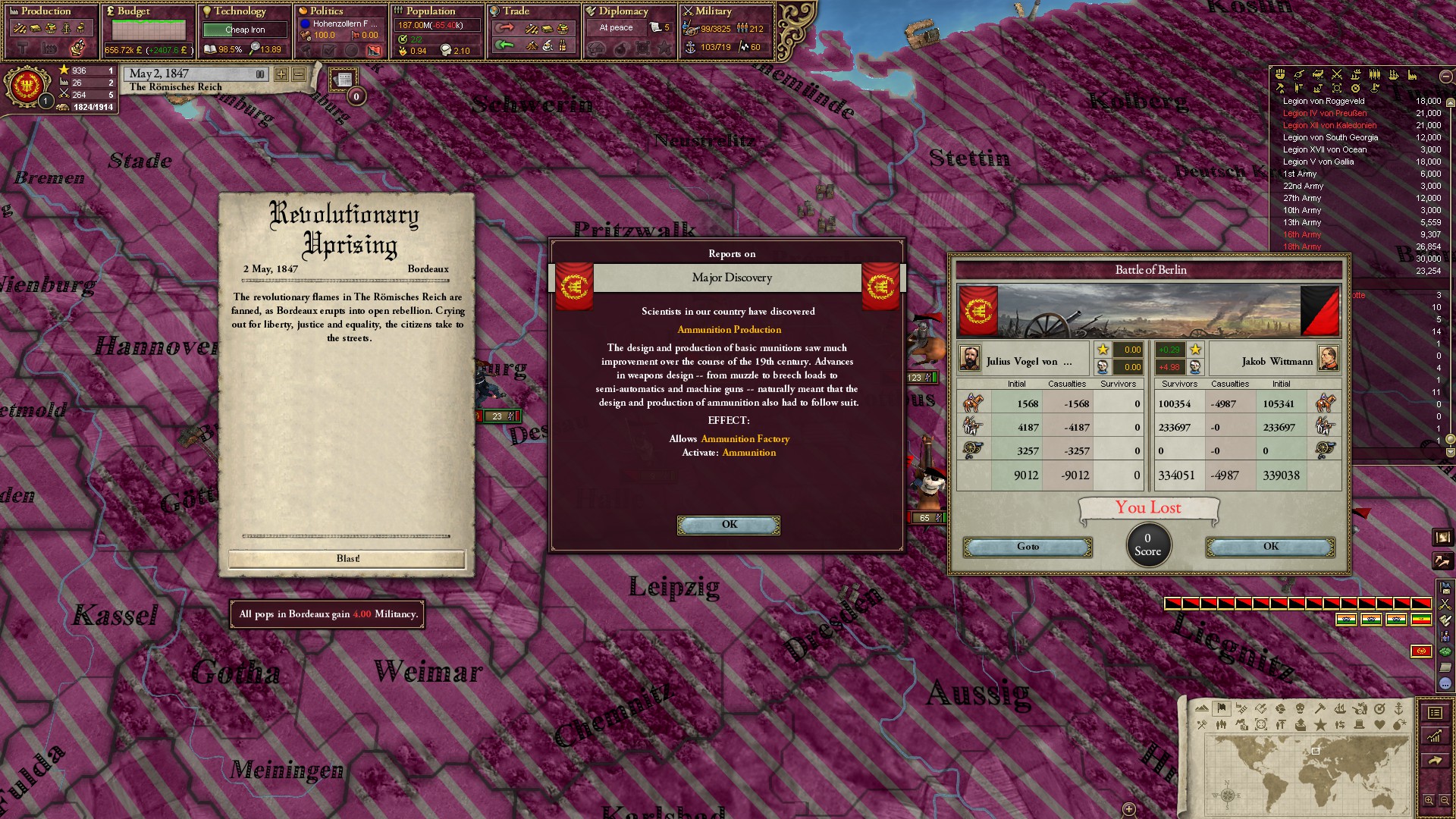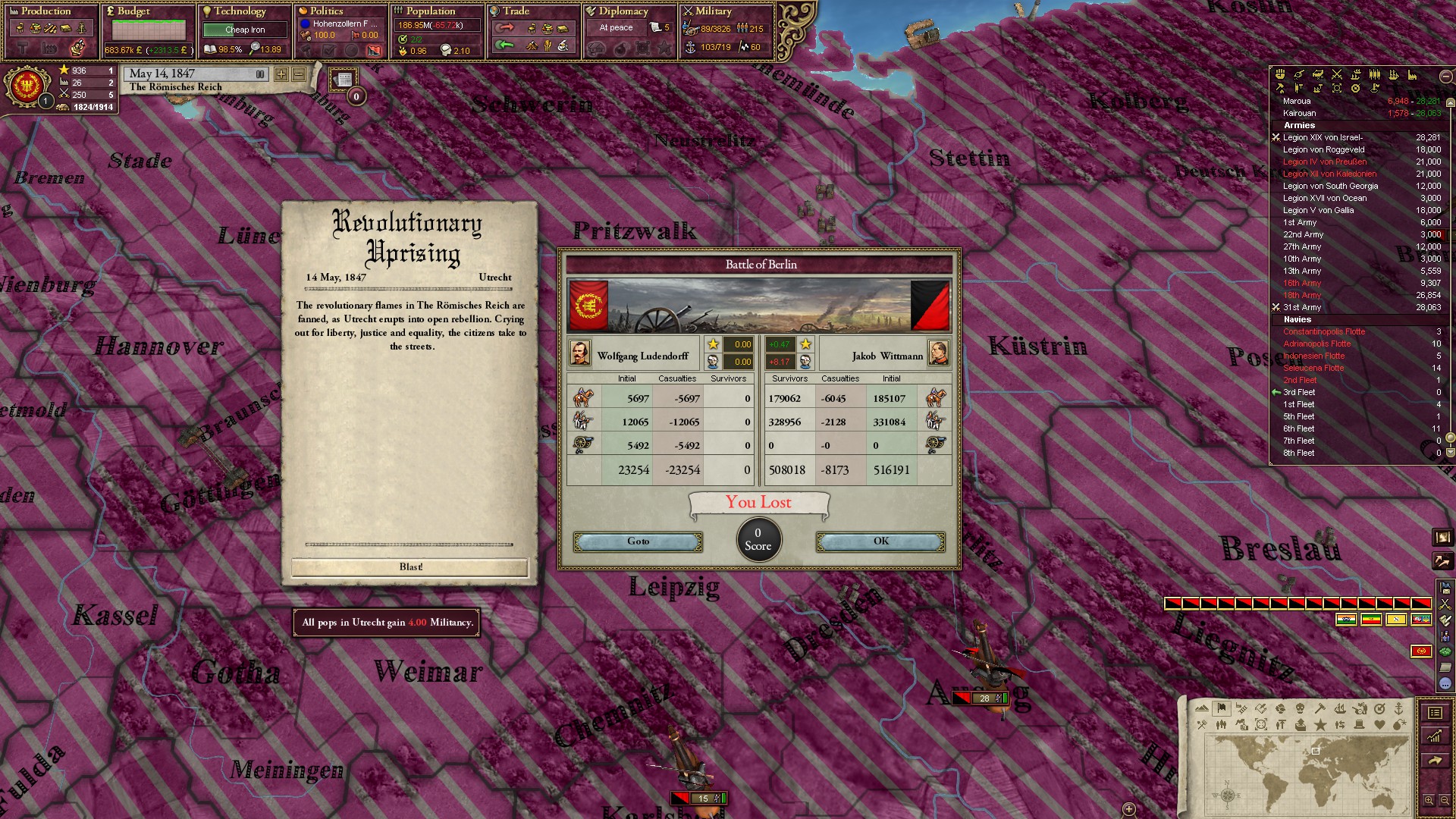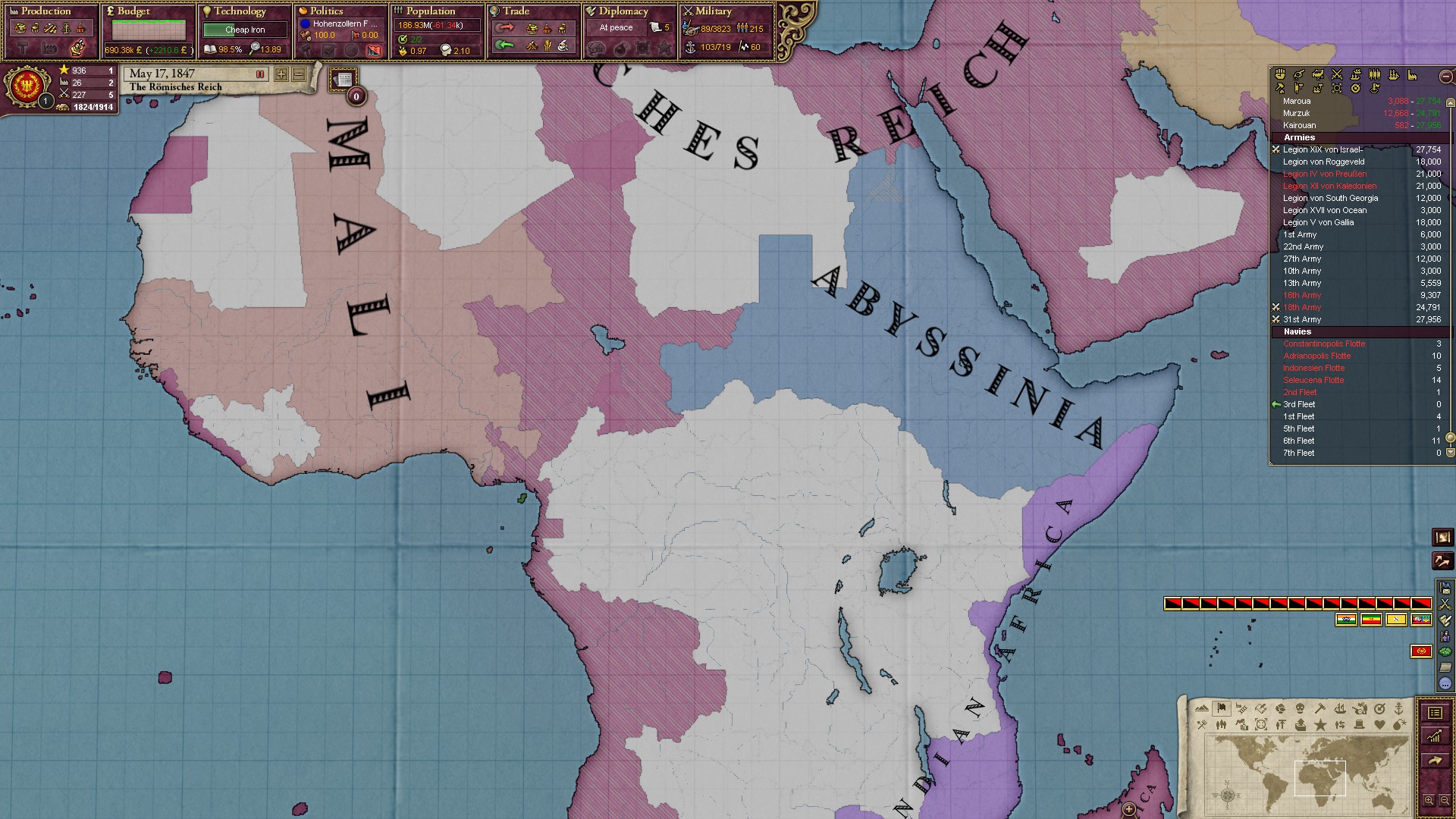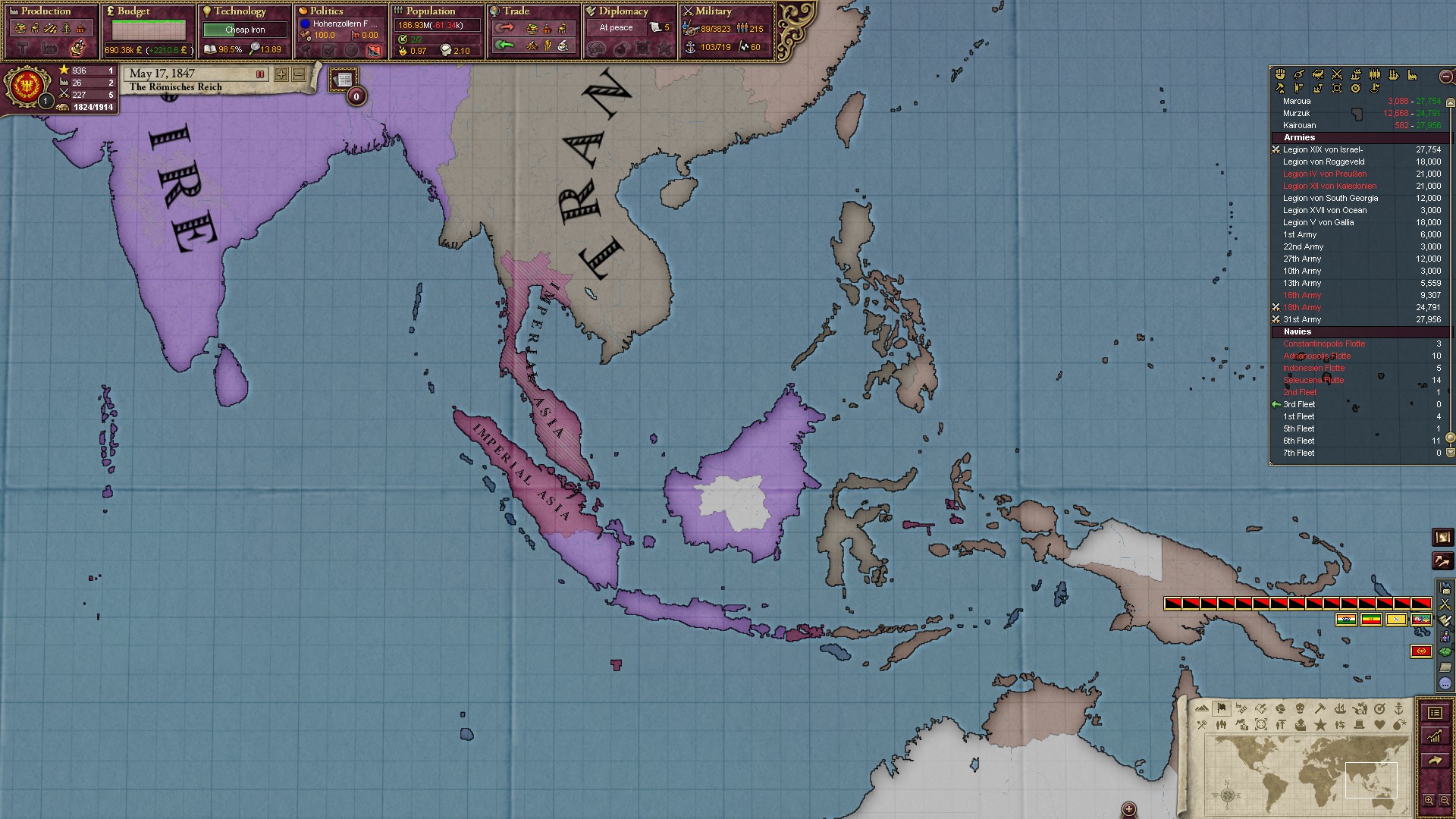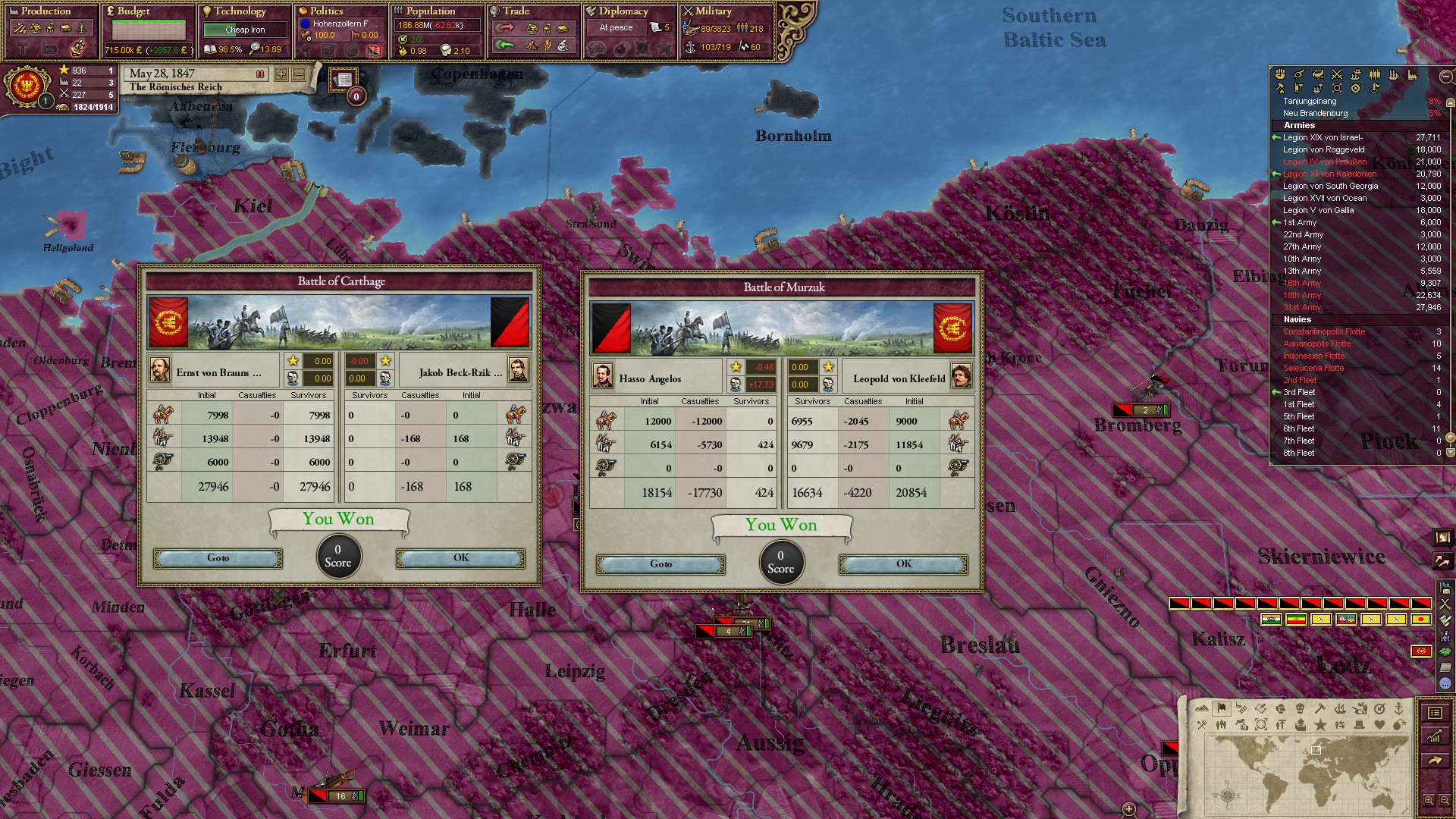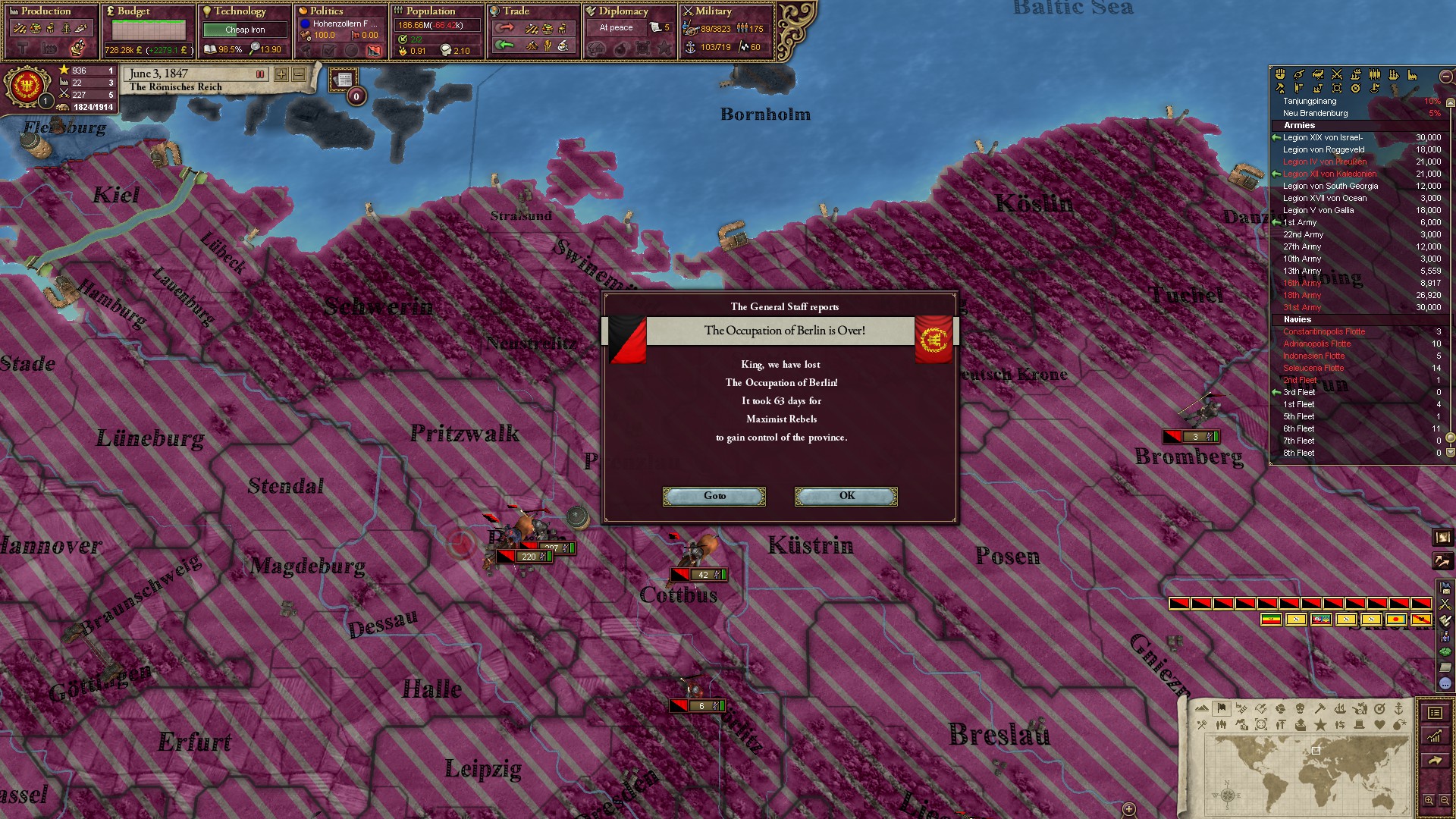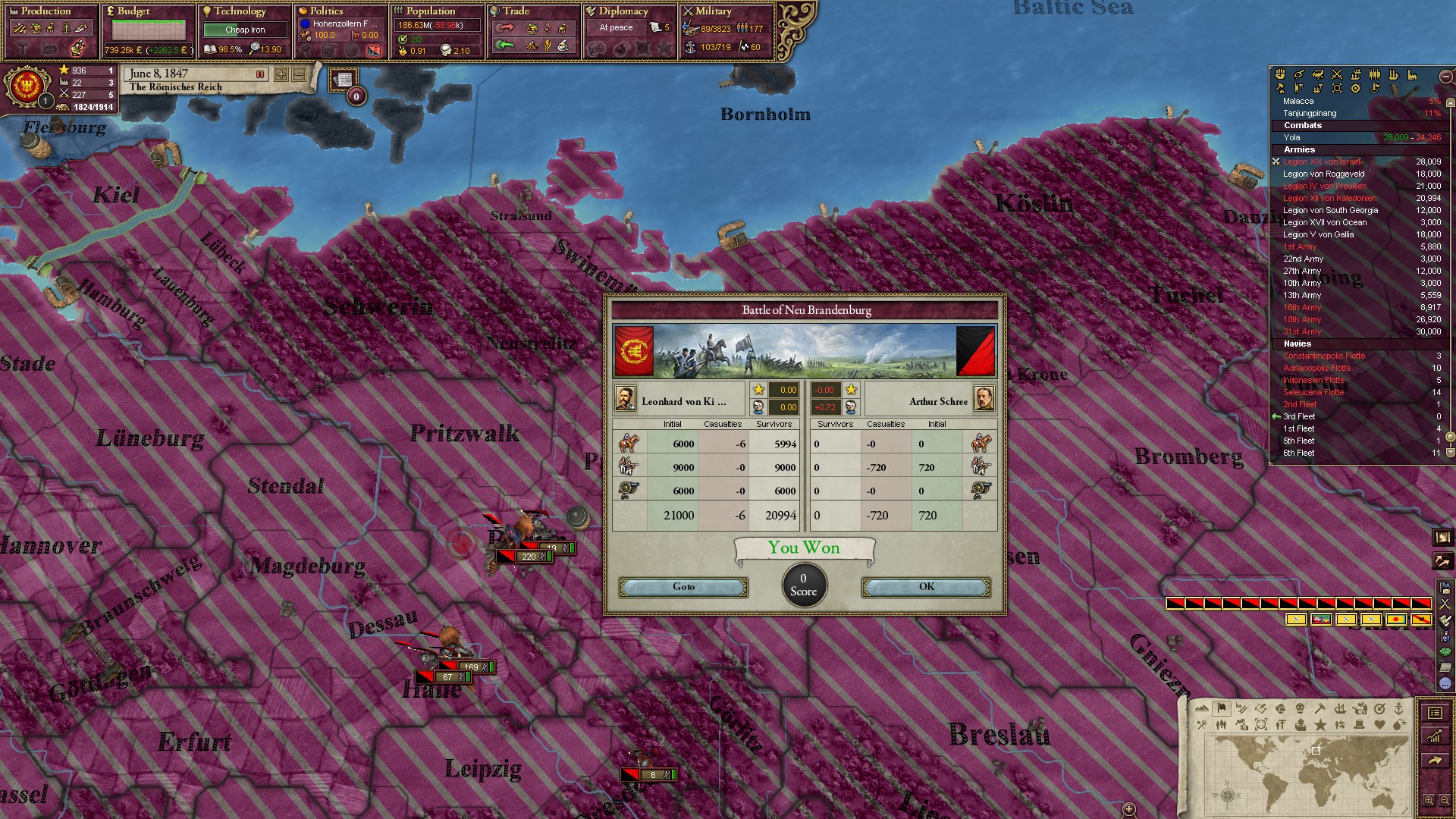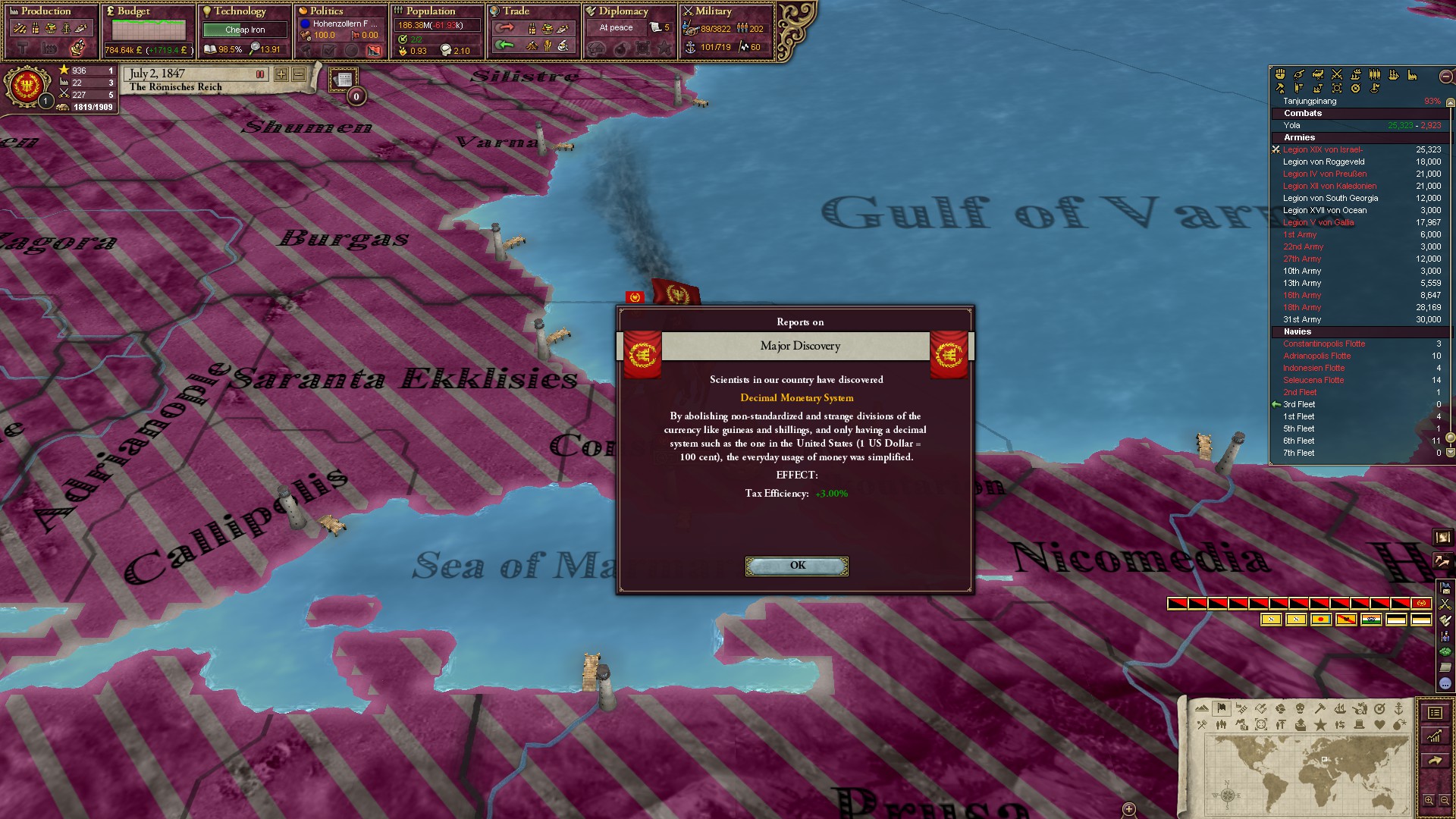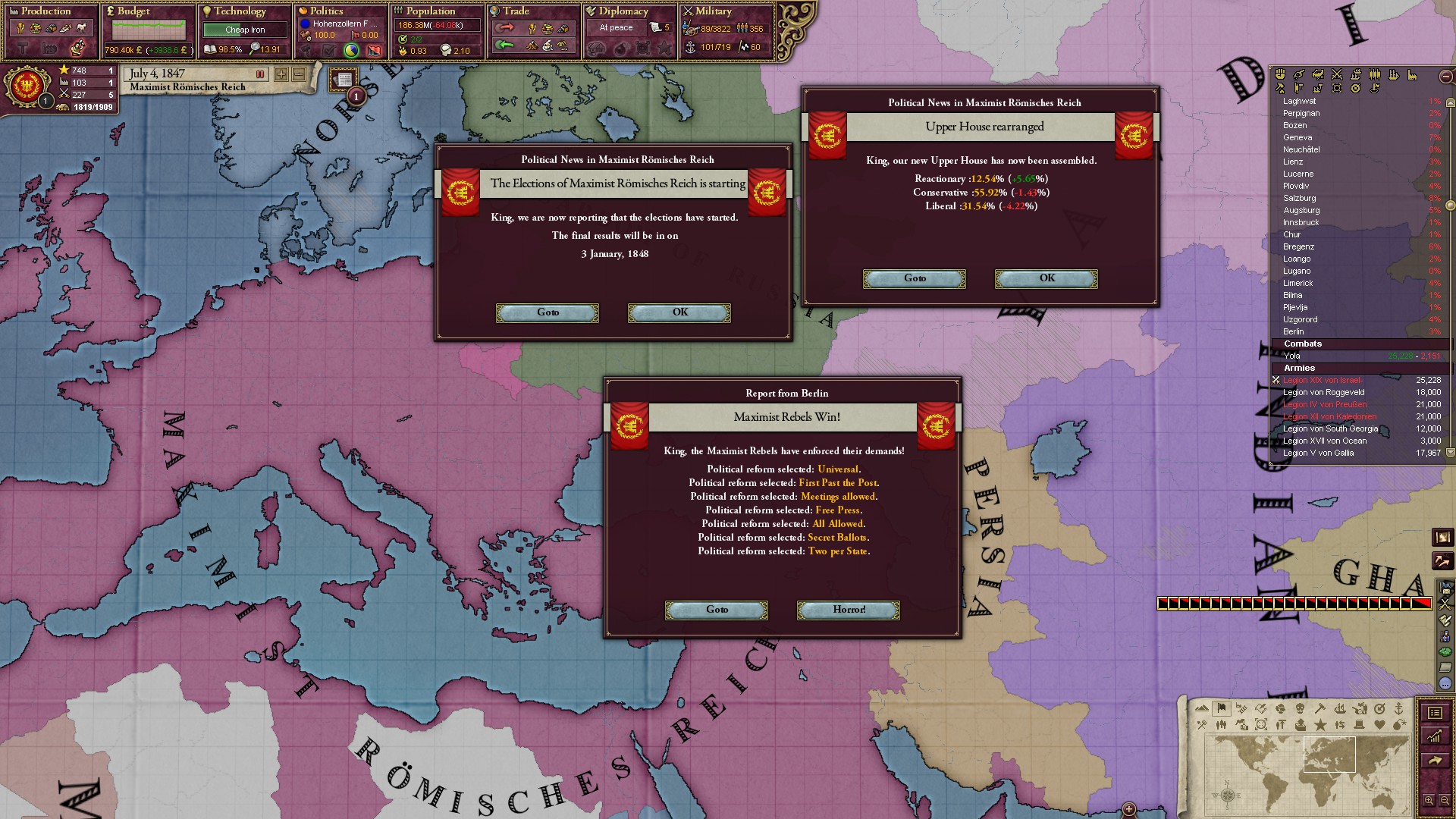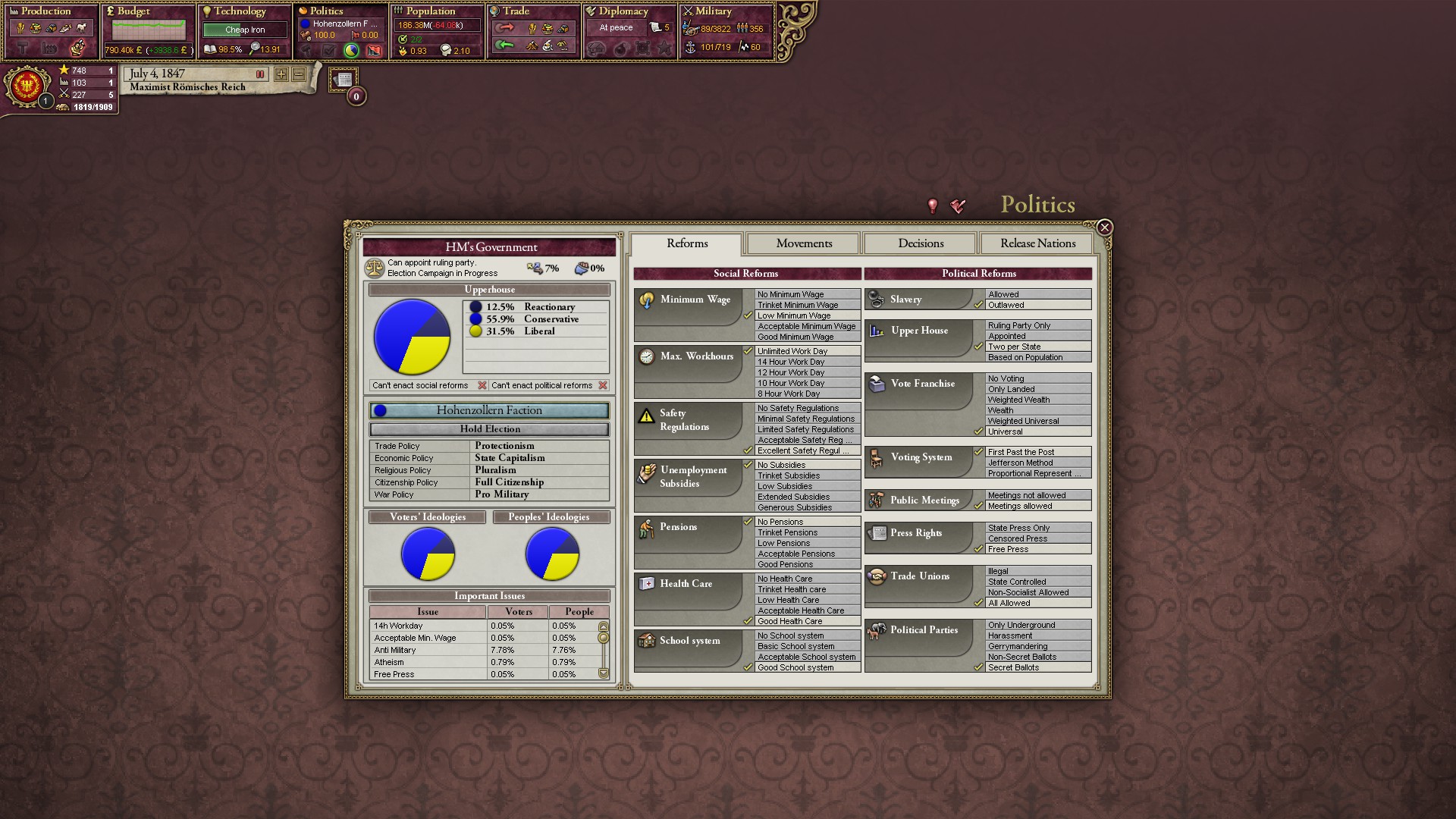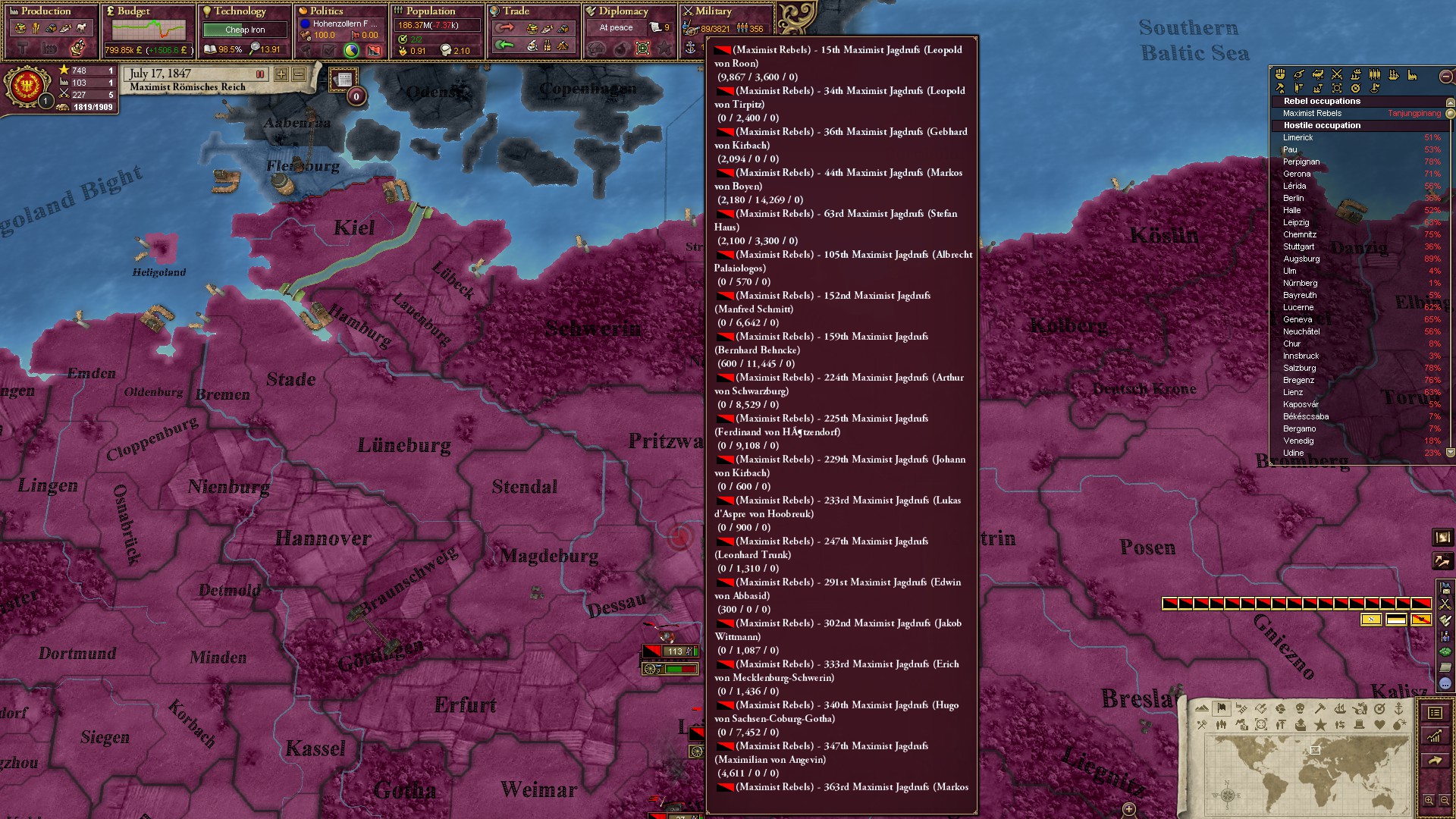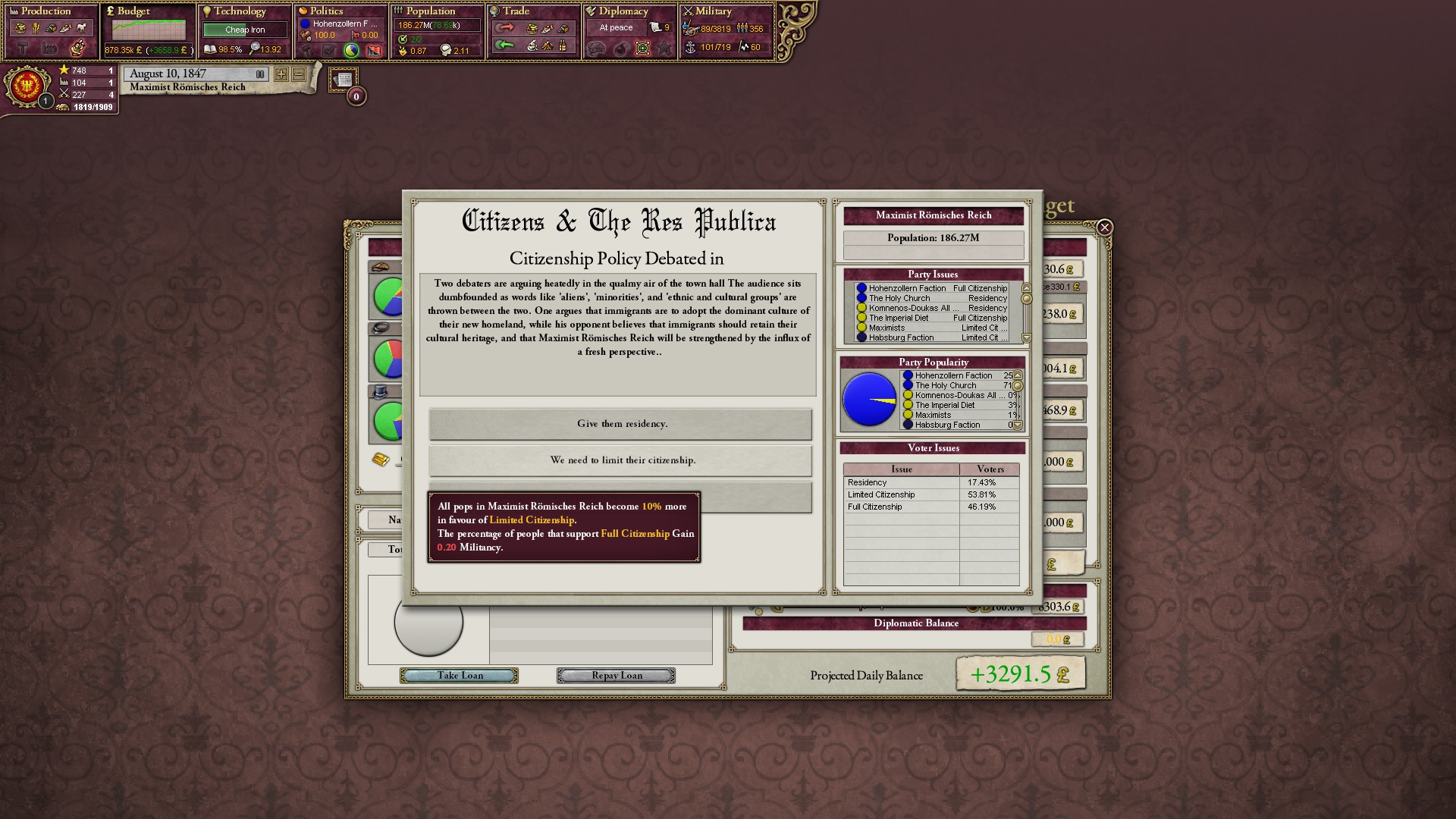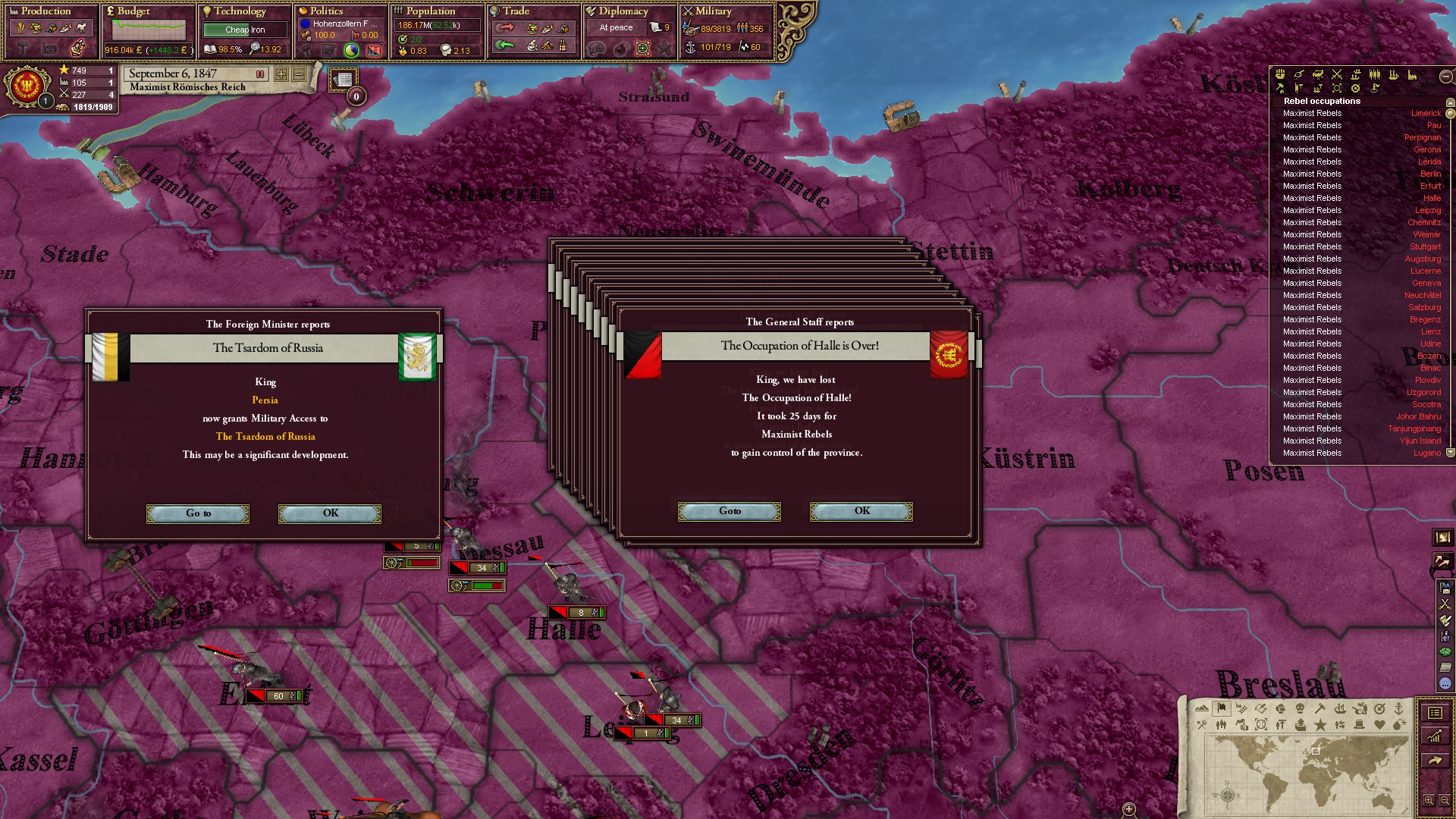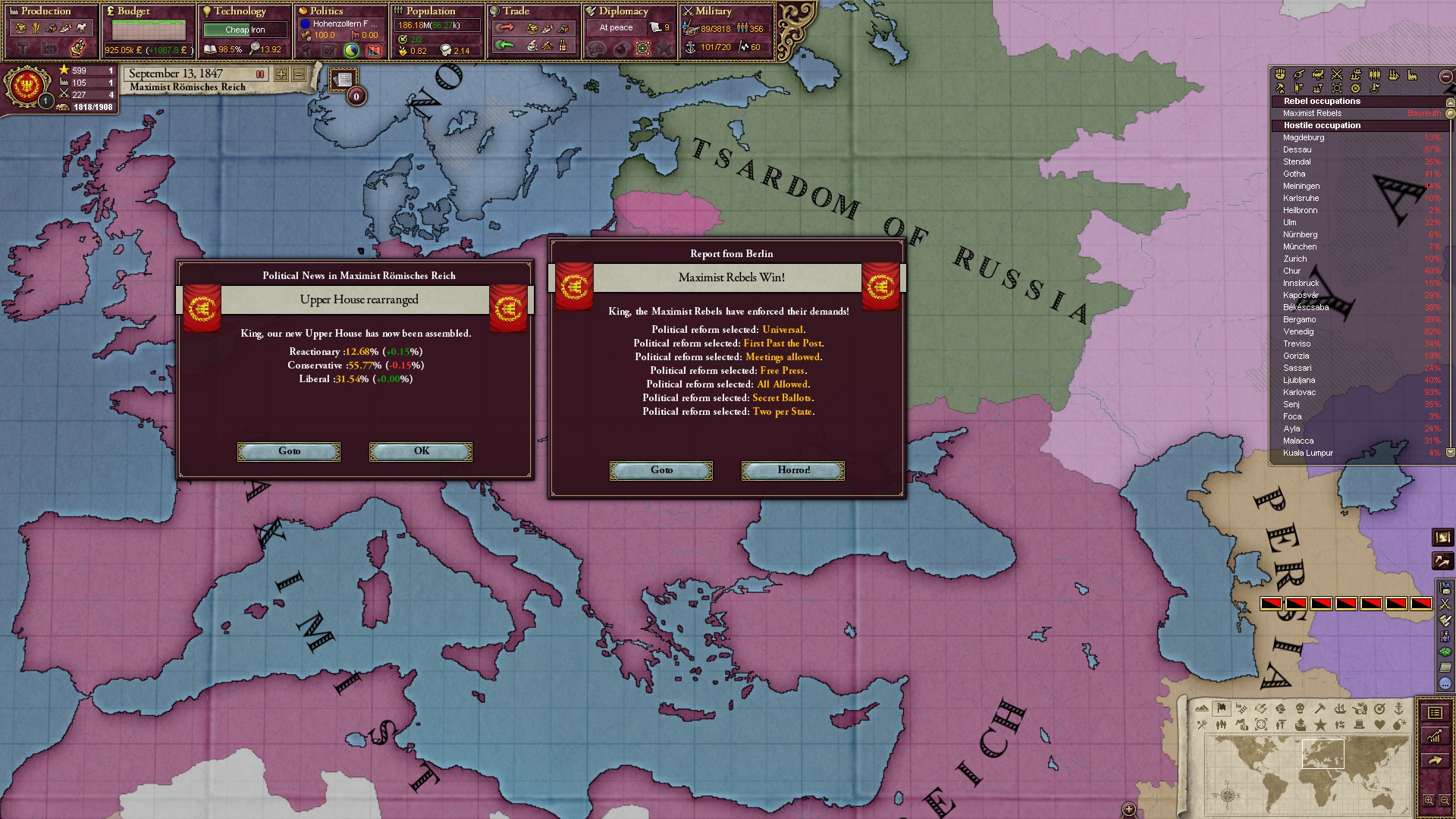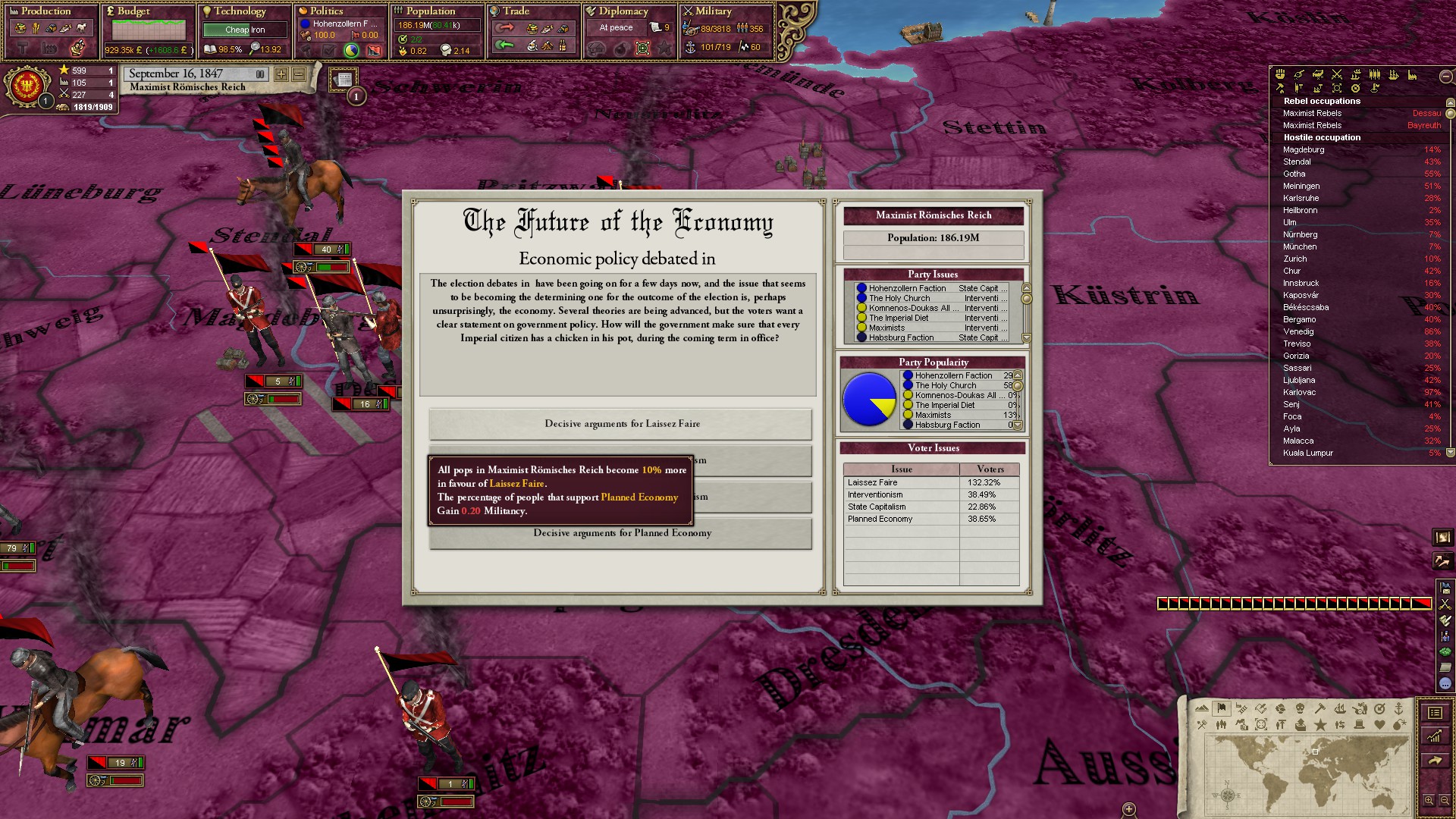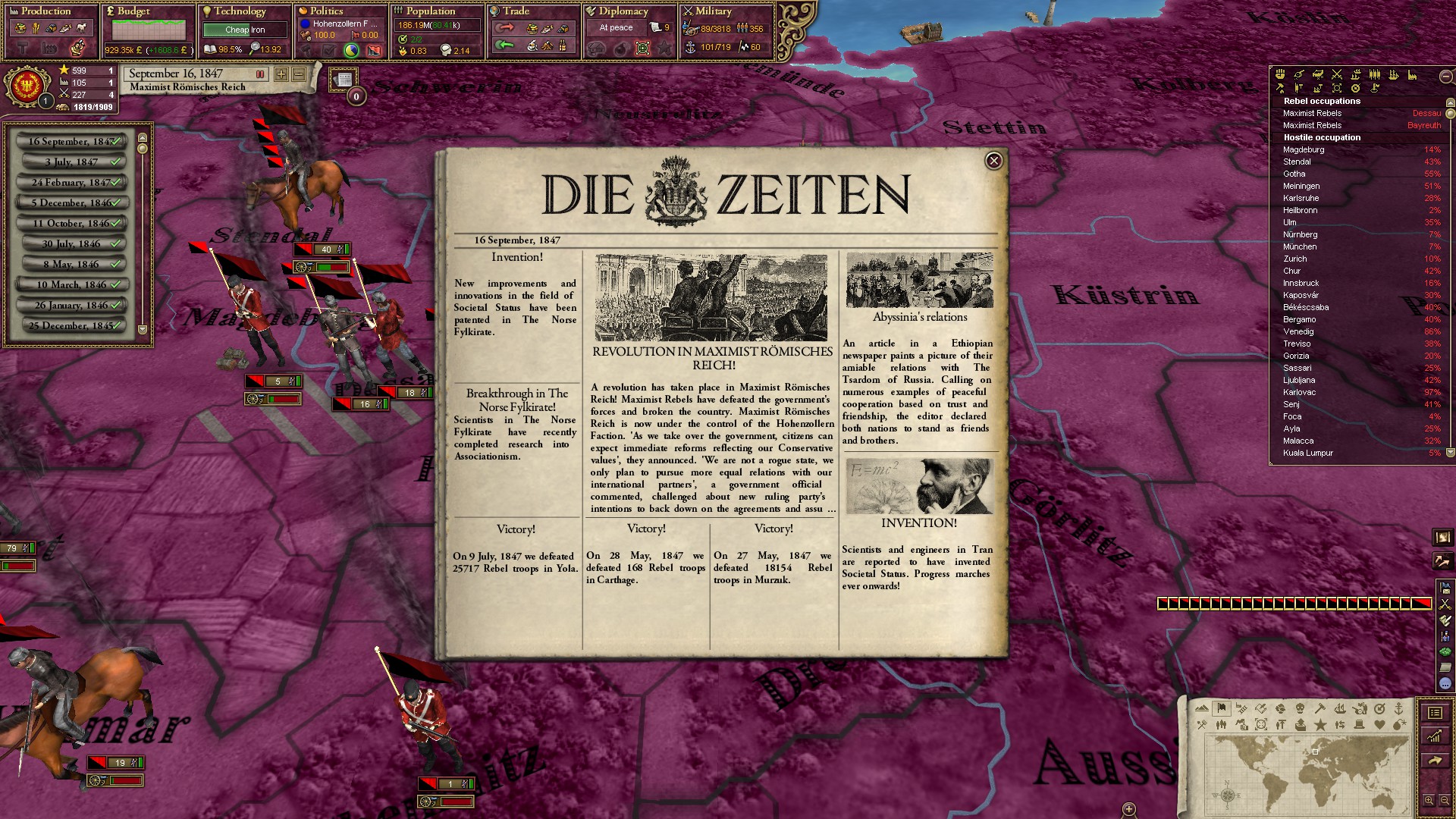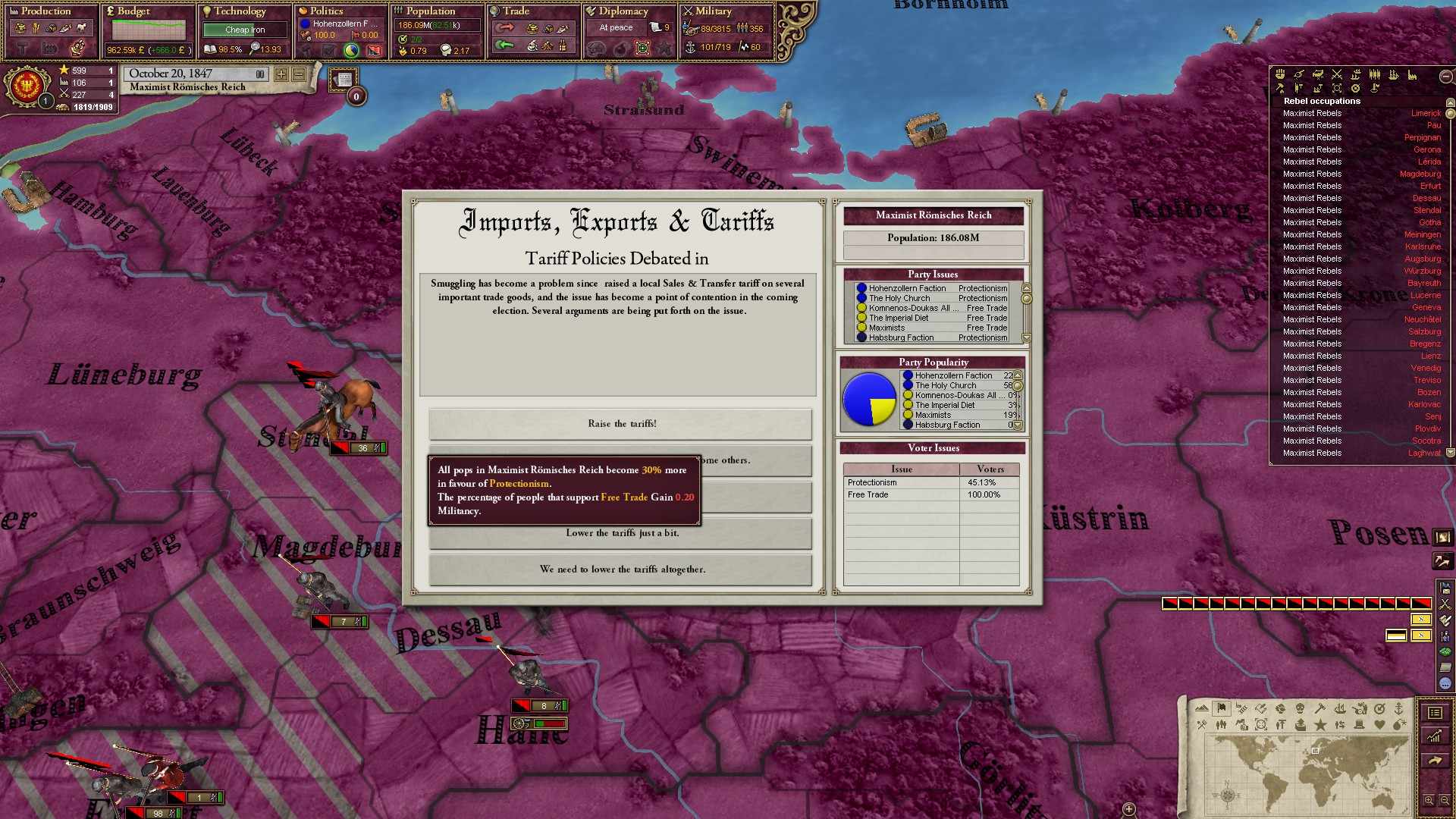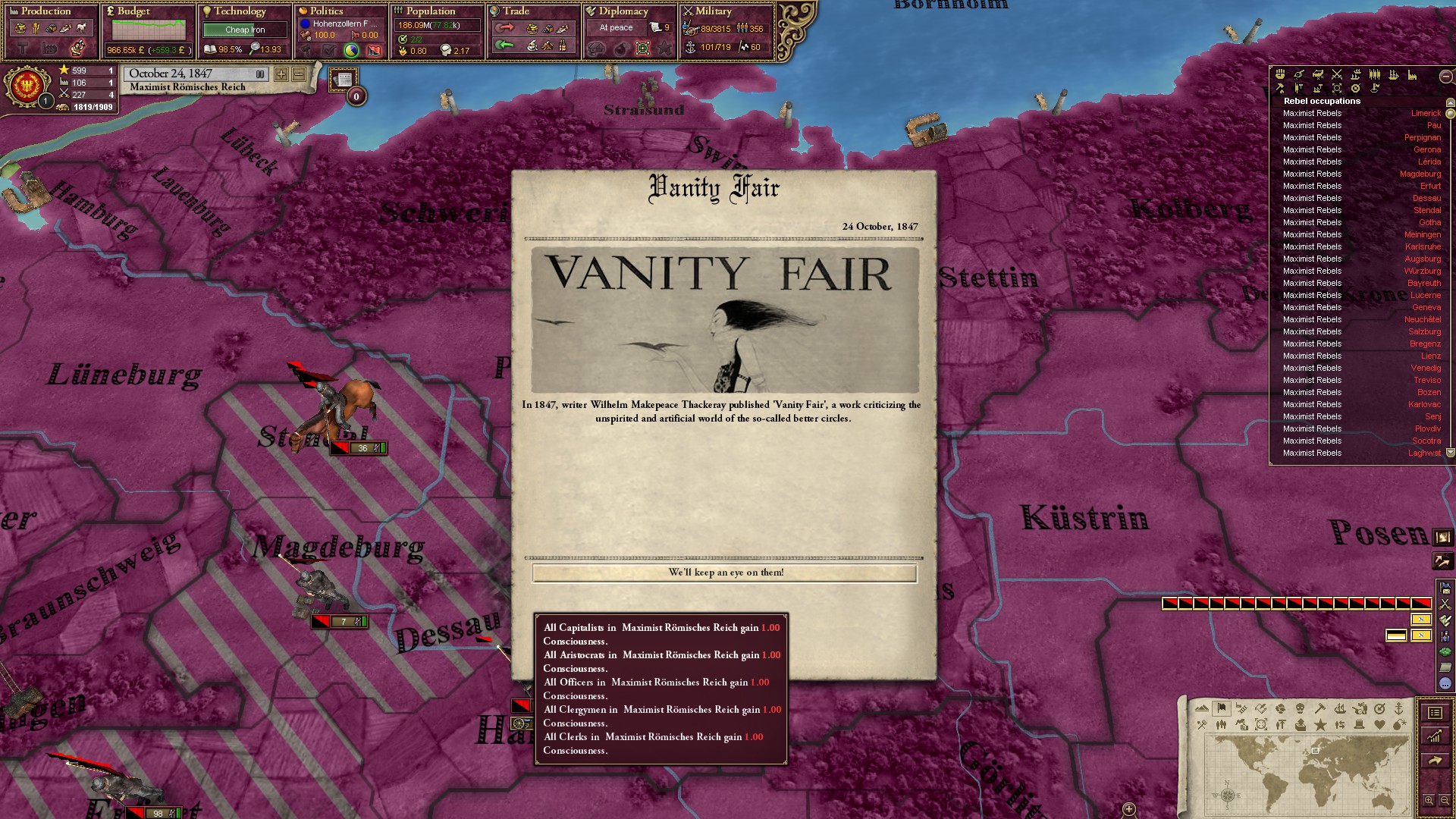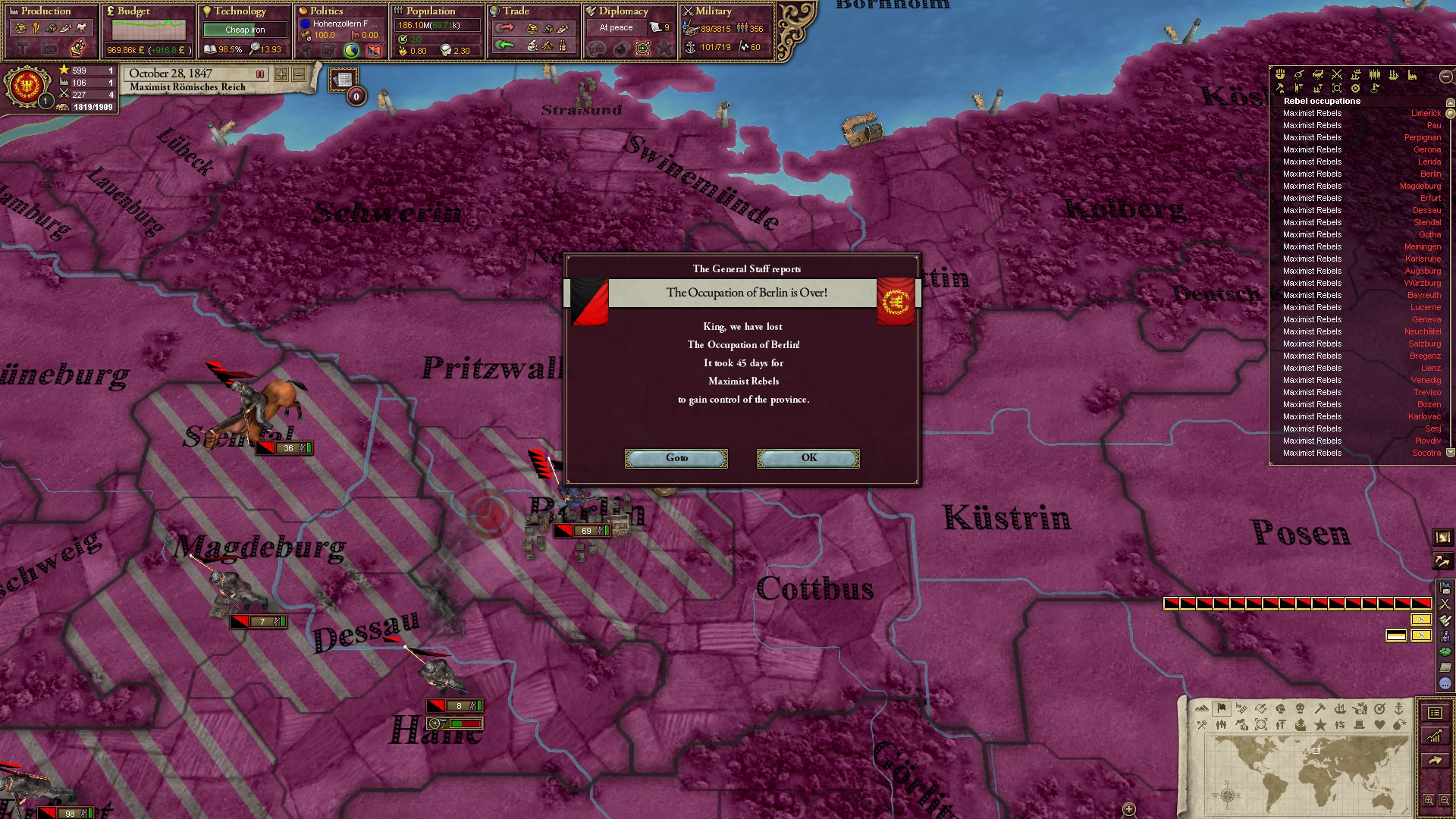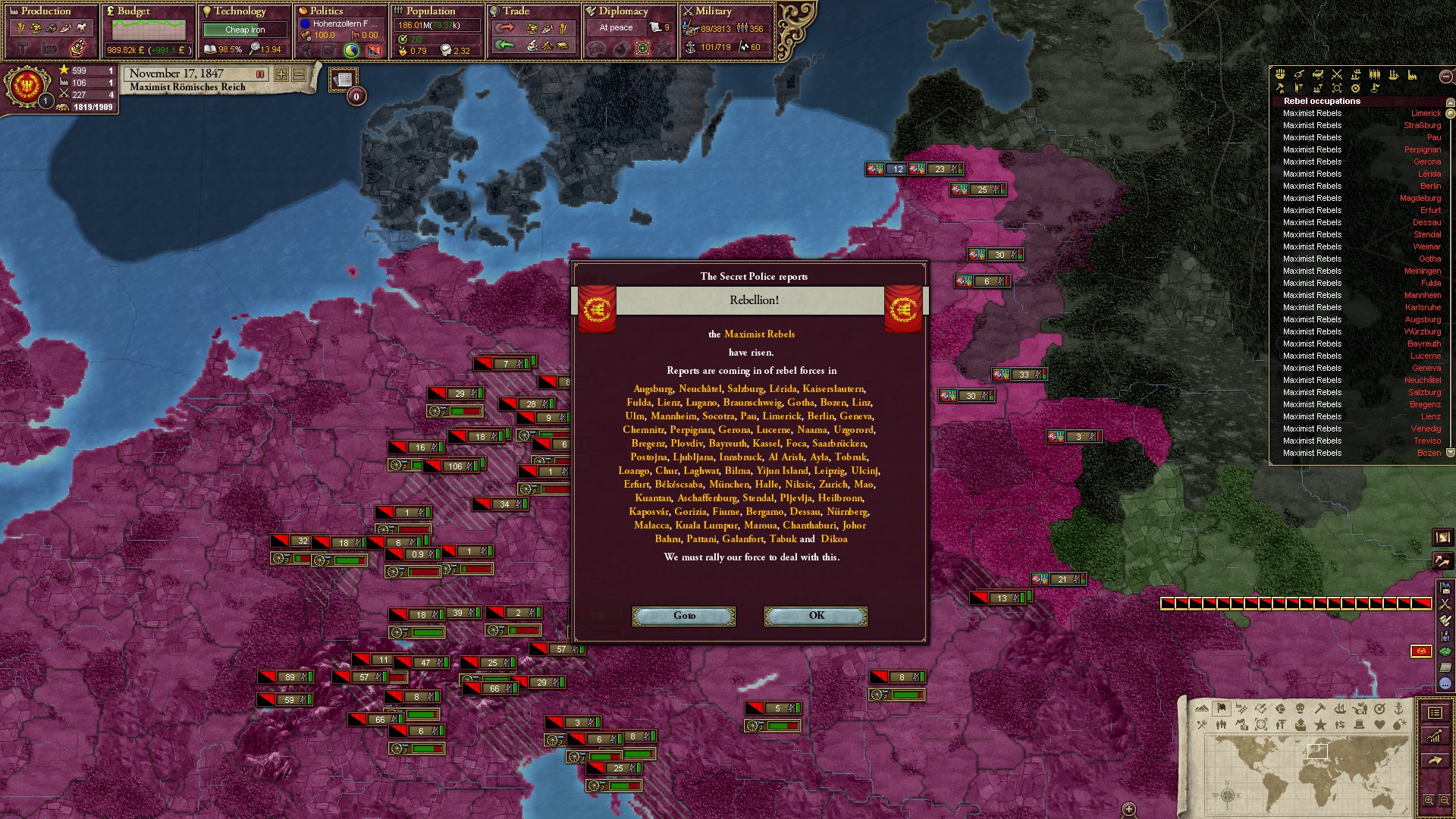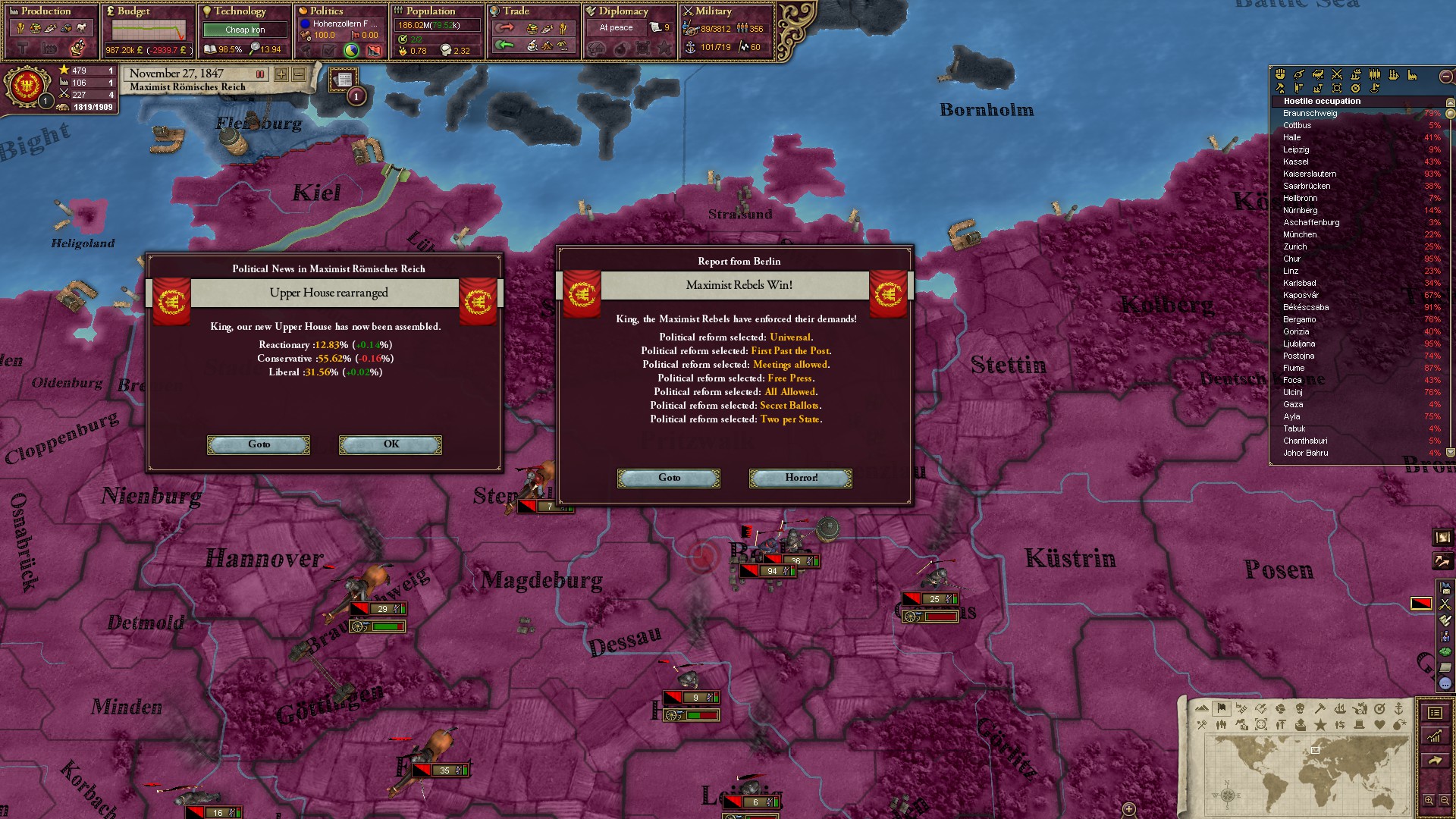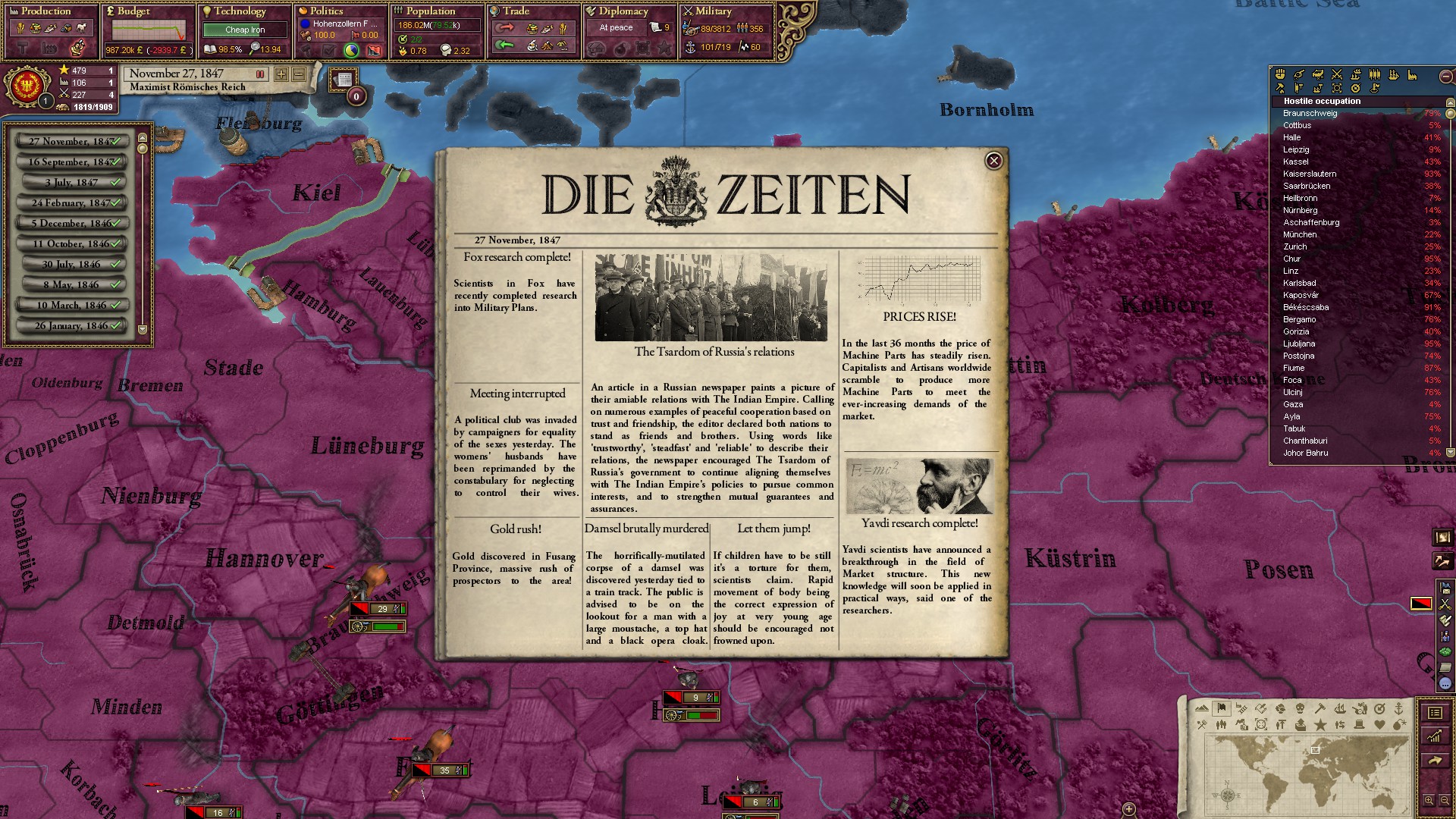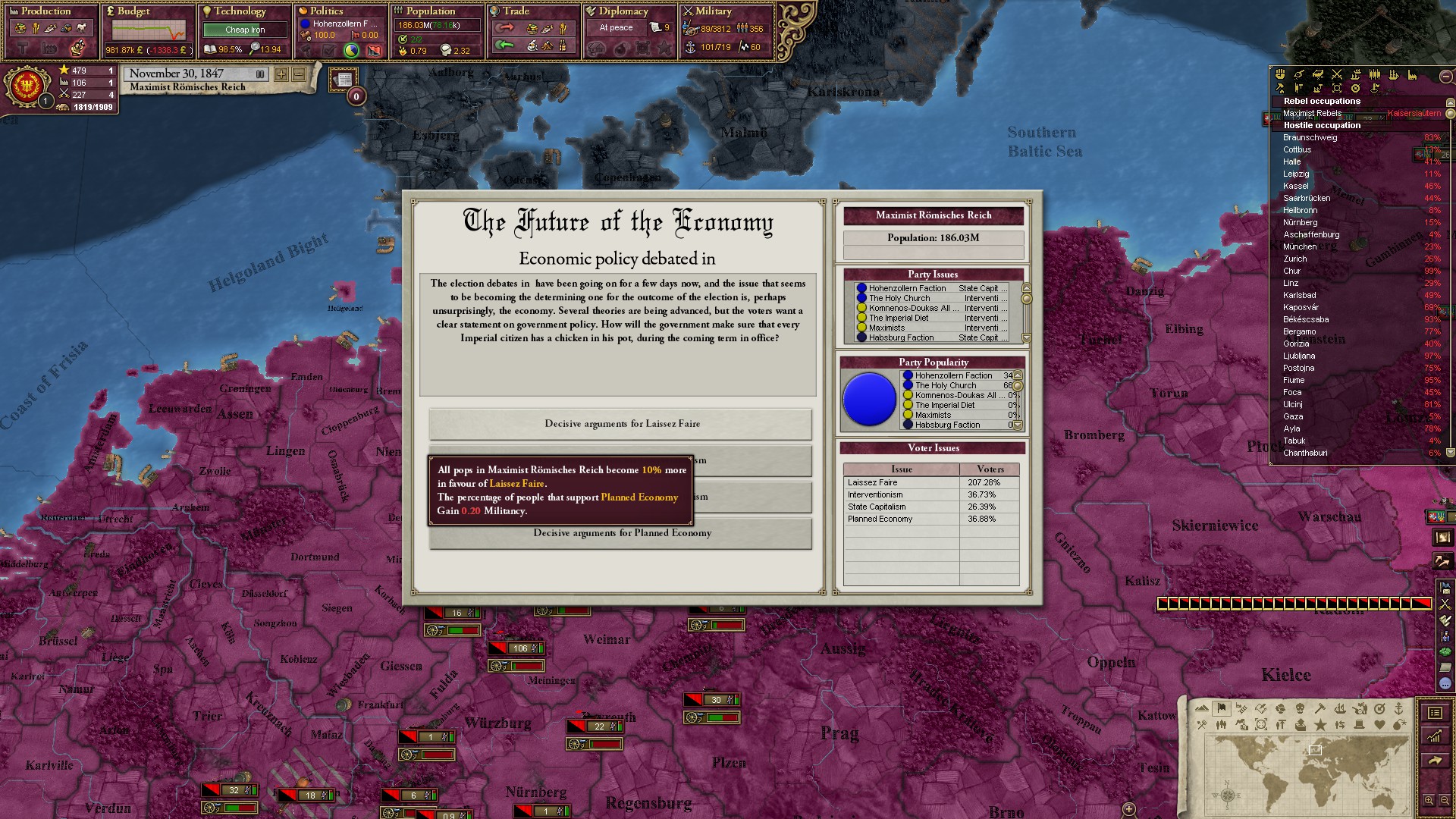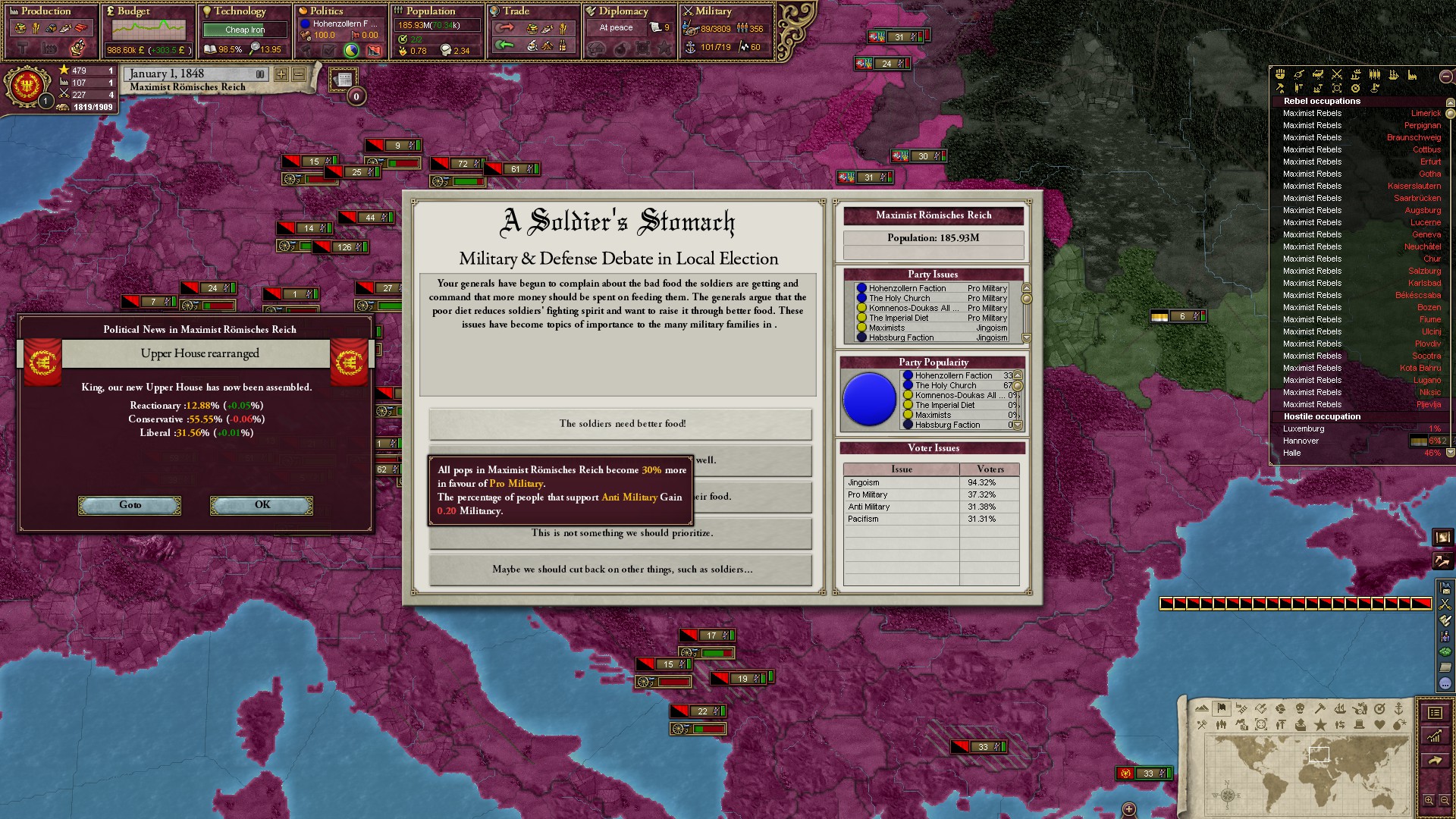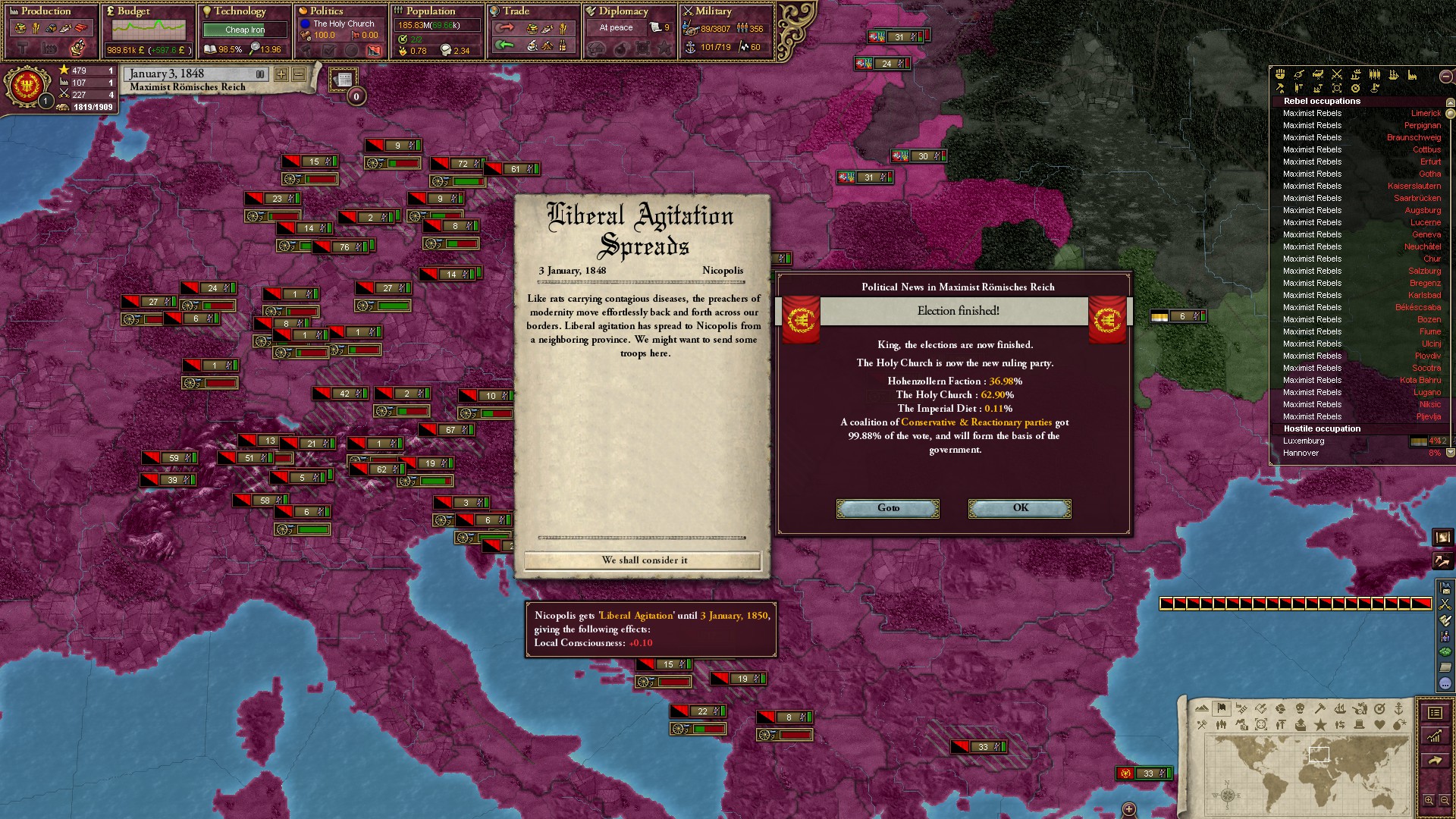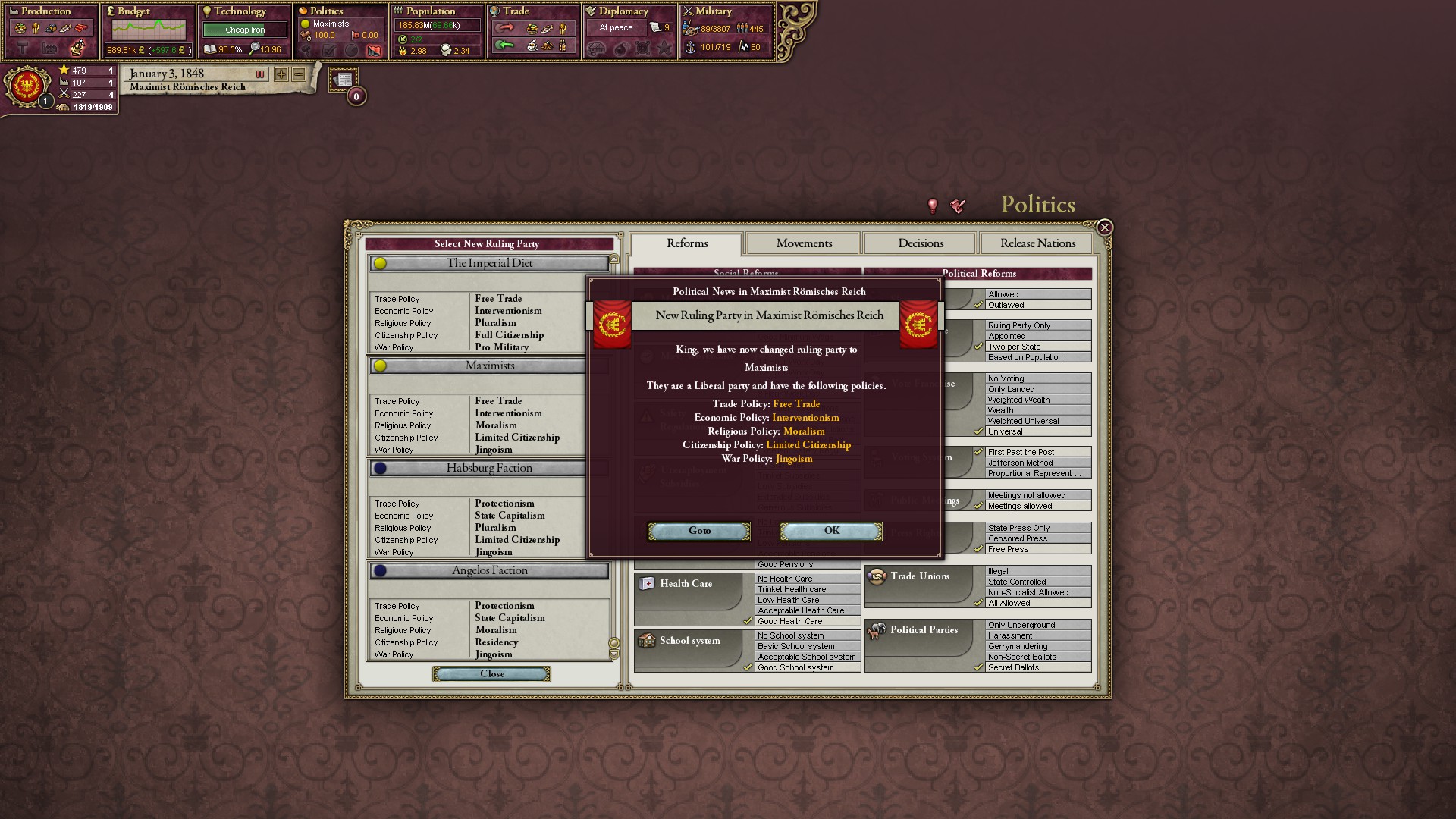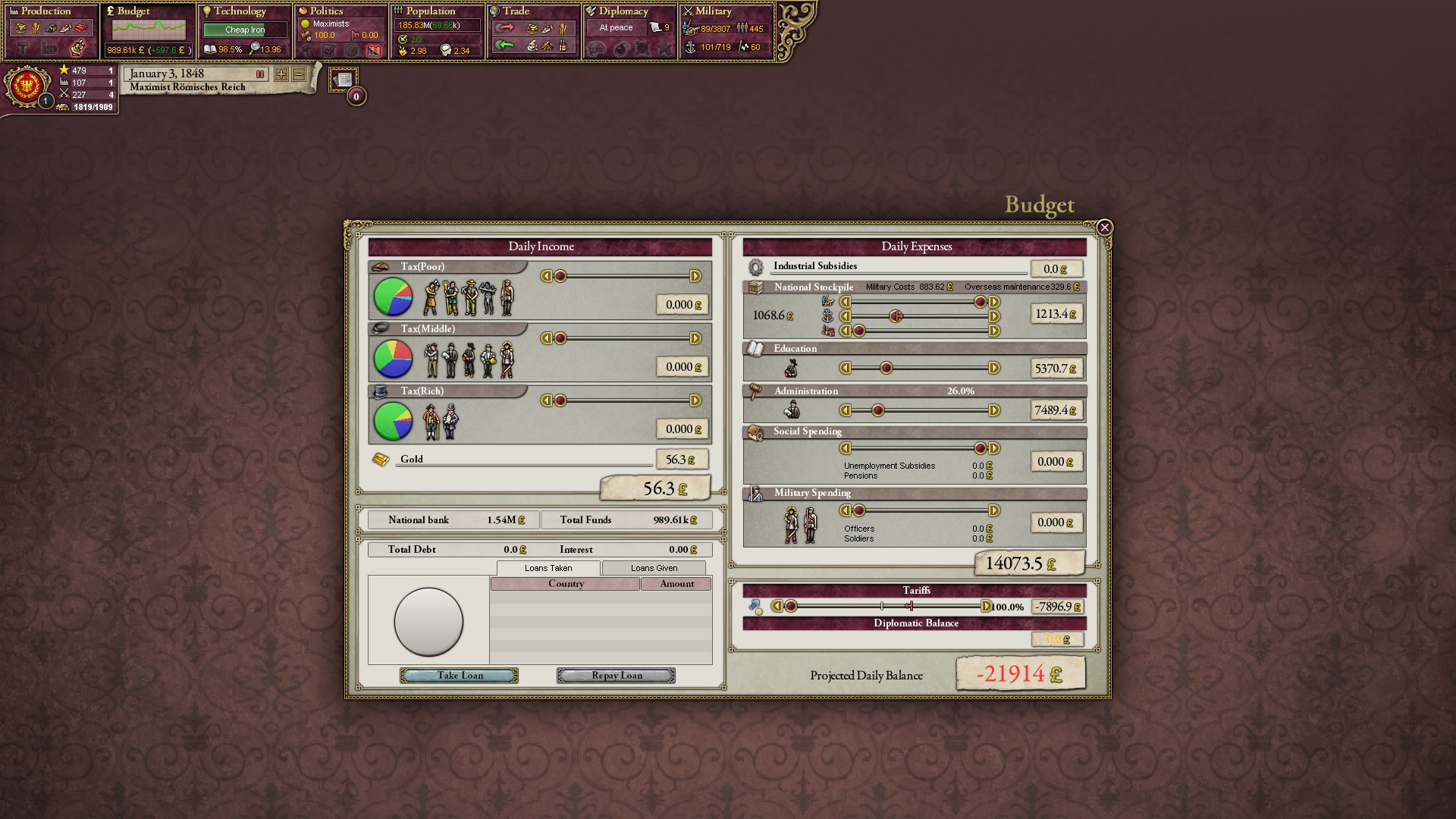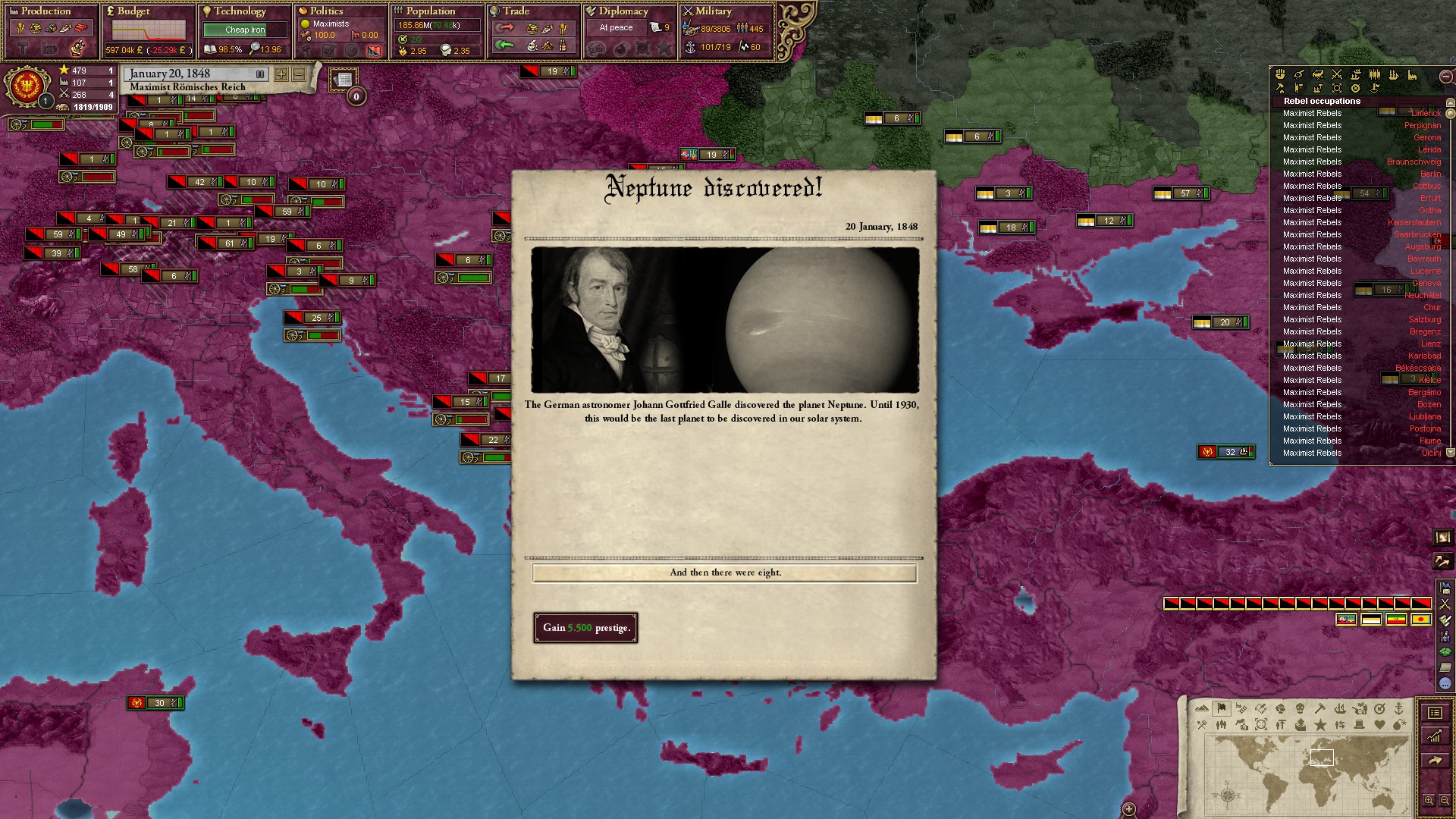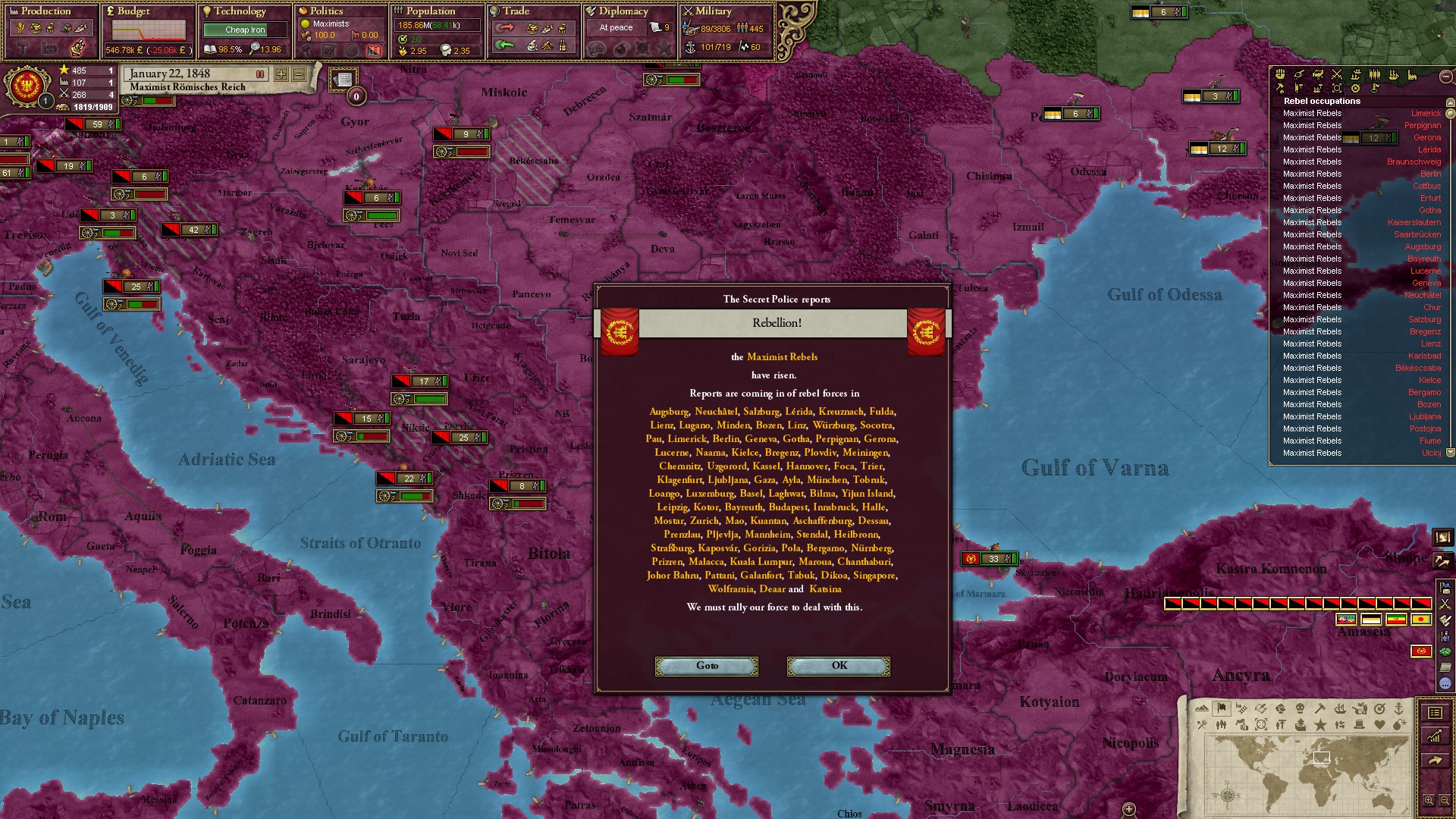Chapter 181: Power to the People
"Freedom at last!"
-Konrad von Habsburg
"I hate you all."
-Maximilian I, upon being crowned Kaiser
Brandenburg Palace, Berlin - July 1847
Konrad von Habsburg, in his robes as
Ministerprasident, entered the throne room, bowing respectfully before his liege, Maximilian I, who sat regally on his throne, at all times "protected" by no less than eight "loyal" bodyguards.
"Greetings, your Majesty," he said, "I hope you are in good spirits today."
"Go away," muttered Maximilian.
"That requires a majority vote by the Diet to overturn the amendment in the constitution that prohibits that order from being carried out," said Konrad, "So no. Anyways, as your most loyal servant, I am ready to serve you in any way possible."
"Then go away."
"In a way that is permitted by the constitution that you bestowed upon your citizens!"
"You wrote it!"
"I never said that! I said you
bestowed it!"
Maximilian sighed. "Then I want dumplings."
"What?"
"
Ich bin der Kaiser und ich will Knödel!" snapped Maximilian.
"Okay, okay! I'll get your dumplings, your Majesty."
Konrad bowed again and left the throne room. Immediately, he headed to the Reichstag, where he took his seat at the center podium. All of the other senators, most of them left over from the old regime, stared at him, waiting for his command.
"Good day, fellow senators of the people," said Konrad, "I have some very important legislation to present to you. Bill A-1 is a request by His Imperial Majesty Maximilian I to have dumplings for lunch. You have one hour to debate, after which we will vote on this measure. Remember, by the principle of liberum veto, the measure must be unanimously supported to pass."
Around noontime, Konrad von Habsburg returned to the throne room.
"Unfortunately, the Diet has rejected your request to eat dumplings," said Konrad. "Too bad, but it is the will of the people."
---
Many hoped that with the Maximists now in power, they could restore the Reich's greatness and power. No longer did people have to suffer in the streets to make ends meet! Instead, only the minorities will! No longer will pointless lives be lost in costly wars around the world. Instead, only the lives of minorities will!
Since the Restoration of 1104, the Kaisers had worked tirelessly to end centuries of prejudice and discrimination against minorities, on the grounds that they were all Romans. Laws against anti-Semitism, acts to promote the status of women, and proclamations that guaranteed religious and cultural freedoms were enacted, but enforcing them was much harder. Making them illegal only served to make them more attractive. Those groups who were hardest hit by these laws, namely the Germans Orthodox landowners, were more inclined towards Maximism as a way of "restoring the natural order of things." It was here that tolerance was decried as being part of the old order, and modern society's job was to get rid of that.
Such was the sentiment expressed in the first edition of
Die Zeiten published after the Maximist takeover. Gone were the days of tolerance. Back were the days of the 17th century Inquisition. Speaking of the Inquisition, Konrad von Habsburg took personal control of the organization, having the Diet vote to grant him the position of Head Inquisitor and then ordering the inquisitors to begin mass conversions of the heathens of the Reich. Heretics would be spared this proselytization. Should any heathen resist conversion to the True Faith, their entire community would be put to the sword and to the flame. Konrad also made it a point to enforce German culture on the non-German parts of the Reich, making German the only official language and forcing all schools to change their curriculum. The "Maximist-approved" curriculum dropped all local culture from schools and replaced them with Germanic lessons. History lessons on local civilizations, for example teaching about the pharaohs in Aegyptus and Hannibal in Carthage, were replaced with lessons on how Friedrich the Great conquered the relevant regions and spread German culture and Christianity to them (even if he never really set foot there or carried out such policies). Music lessons now only used German instruments. Math and science lessons now only taught content from German scientists. A whole new course was created: Maximism. All students were to be taught about the benefits, and only the benefits, of Maximism and why Maximilian I was the true Kaiser. Naturally, the minorities were angered by these policies.
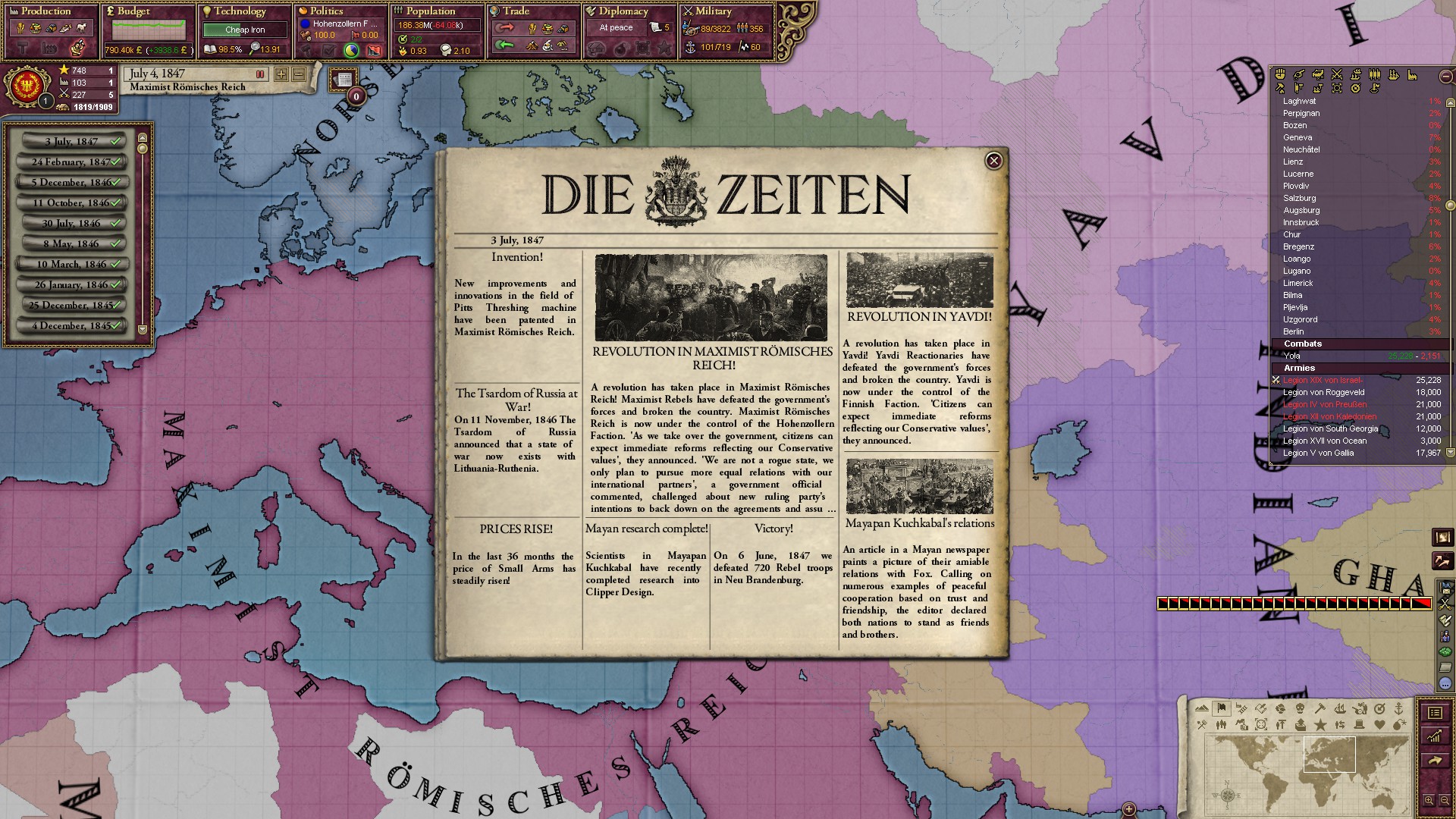
After his sweeping education, religious, and cultural "modernization" programs, Konrad began to modernize the government. All factions within the Diet were made into political parties, though they did not know what to do with their new status. In addition, while an election was in progress, basically nobody knew how to vote, who to vote for, or even why they should vote in the first place. Faced with the fact that the election could implode because nobody knew how to vote or who to vote for, potentially leading to the return of the Siegfriedist system, Konrad declared himself the Maximist Party's candidate for the new
Ministerprasident. To keep up a semblance of choice, he ordered Ecumenical Patriarch Germanos IV to run as the Church's candidate, knowing that everybody would just vote for him instead of a clergyman.
While the elections progressed, Konrad received word that not all of the
Jagdruffs had demobilized or stood down. In fact, several hundred thousand Maximists were still on the loose, rampaging across Germania and laying waste to whatever they could find. Many of them were even besieging Berlin. Konrad sent orders to the rogue militias demanding that they stand down, but they refused, arguing that Konrad had "betrayed the Maximist cause" and was not liberal enough, particularly on reviving slavery (current legislation passed by the Diet as part of the constitution made the use of slave labor legal but not the actual slave trade).
On 10 August, Konrad von Habsburg organized a debate against Germanos IV in a town hall outside of Berlin. The two "debated" on the immigration policy of the Reich (Germanos had been given a script to read from), where Konrad eloquently argued in favor of building a wall along the Lithuanian border to stop the "heathen Baltic terrorists" from entering and stated that the idea of
Romanitas did not protect cultural rights but rather encouraged assimilation into Roman culture. On the other hand, Germanos IV was "incapable" of responding to Konrad's argument.
In early September, the rogue Maximists breached the walls of Berlin, which had only recently been repaired. They headed straight for the Reichstag, where they killed as many senators as they could before loyal militias dispersed them. The loyal militias in turn were overwhelmed by the rogue militias, who then seized control of the government and dissolved what remained of the Diet, though they left Konrad and Maximilian in their places and did not cancel the election.
To distract the people from potential Siegfriedist propaganda, Konrad ordered another debate to take place, this one on economic policy. In preliminary polling, it was determined that 132.32% of all citizens were in favor of laissez faire economics, and so Konrad argued in favor of it, winning the debate yet again.
The next month, another debate took place. Konrad and Germanos IV now discussed tariff policies. Again, Konrad won out with his expert defense of protectionism, saying that foreign trade "steals jobs from hard-working Christians and Germans" and that the Chinese and Mexica and Norse "cheat" at trade.
Meanwhile, a new magazine called "Vanity Fair" started publication, becoming well-known for its gossip as well as its thinly-veiled pro-Siegfriedist stance. After two issues it was shut down by the Maximist military government.
In other news, there were still rogue Maximist militias roaming around the countryside. With the legions still being rebuilt, there was no way to stop Berlin from falling for a third time. As if that wasn't bad enough, more rogue militias rose up in November, further exposing the fracturing of the Maximist groups, which had barely united behind Konrad and were now falling apart into open warfare. The Siegfriedists quickly capitalized on this development, gaining thousands of recruits each day.
On 27 November, the rogue militias breached the defenses of Berlin, sacked the city, and overthrew the previous junta, installing themselves as a new junta. Konrad and Maximilian again were not removed from their positions, though the Diet was dissolved and purged a third time.
The last few months of 1847 saw another debate on economic policy, with a full 200% supporting laissez faire economics now, allowing Konrad to not only dominate the debate but also humiliate Germanos IV and run him off the stage.
The last debate, two days before Election Day, focused on the military. Konrad argued in favor of diverting more funding to the legions, arguing that they were necessary to enforce commercial fairness with the Reich's neighbors (and to defeat the rogue militias). Whavever the case, when Konrad finally assembled his third Diet on New Year's Day, after winning the debate, he found that many liberals had simply resigned, not wanting to work under a system that simply didn't work. The transition to representative government had happened so rapidly and violently that people could not adapt or accept the changes.
On 3 January 1848, the elections finished, and Konrad was surprised to discover that the people had overwhelmingly voted for Germanos IV or for Maximilian himself (Konrad put his name on the ballots as a joke), with the Maximists gaining no votes and the Diet faction gaining less than one percent of the votes.
Enraged by this "betrayal," Konrad had Germanos IV sacked and replaced by another Ecumenical Patriarch rather than appoint him as
Ministerprasident. Konrad then declared that Germanos had been disqualified for having stored important government-related letters in a private mailbox and that Maximilian was constitutionally barred from assuming the position of
Ministerprasident, which meant that by default Konrad was the new
Ministerprasident. Konrad then organized a coup against the Diet when it tried to protest, dissolving it for the fourth time and repopulating it with loyal Maximists.
Needless to say, this "undemocratic" act did not go over with the people or even with other government officials. The Minister of Finances, secretly a Siegfriedist, sabotaged the budget of 1848 by slashing taxes to 0% while not reducing any expenses, hoping to bankrupt the Reich, force a government shutdown, and bring Konrad to the bargaining table. The people, even those who were fervent Maximists to begin with, found themselves sympathizing more and more with the Siegfriedists.
On 20 January 1848, a German astronomer discovered the planet Neptune and published his works in a scientific journal. The next day, rogue Maximist terrorists attacked his house and killed him.
The death of this astronomer incited rebellion among Konrad's ranks, with the Maximist Party imploding on itself. Different factions emerged within the party, declaring themselves the most "liberal" or "revolutionary" or "Maximist" of all factions. Each faction encouraged its supporters to rise up in revolt against Konrad, and thousands answered the call, with Berlin certain to fall under siege yet again.
Five days later, the Committee of Polish Independence decided to act, and in an ultimatum delivered to Berlin, its leaders declared the independence of the Kingdom of Poland. When Konrad refused to recognize Poland's independence, the Poles in the city of Plock rebelled.
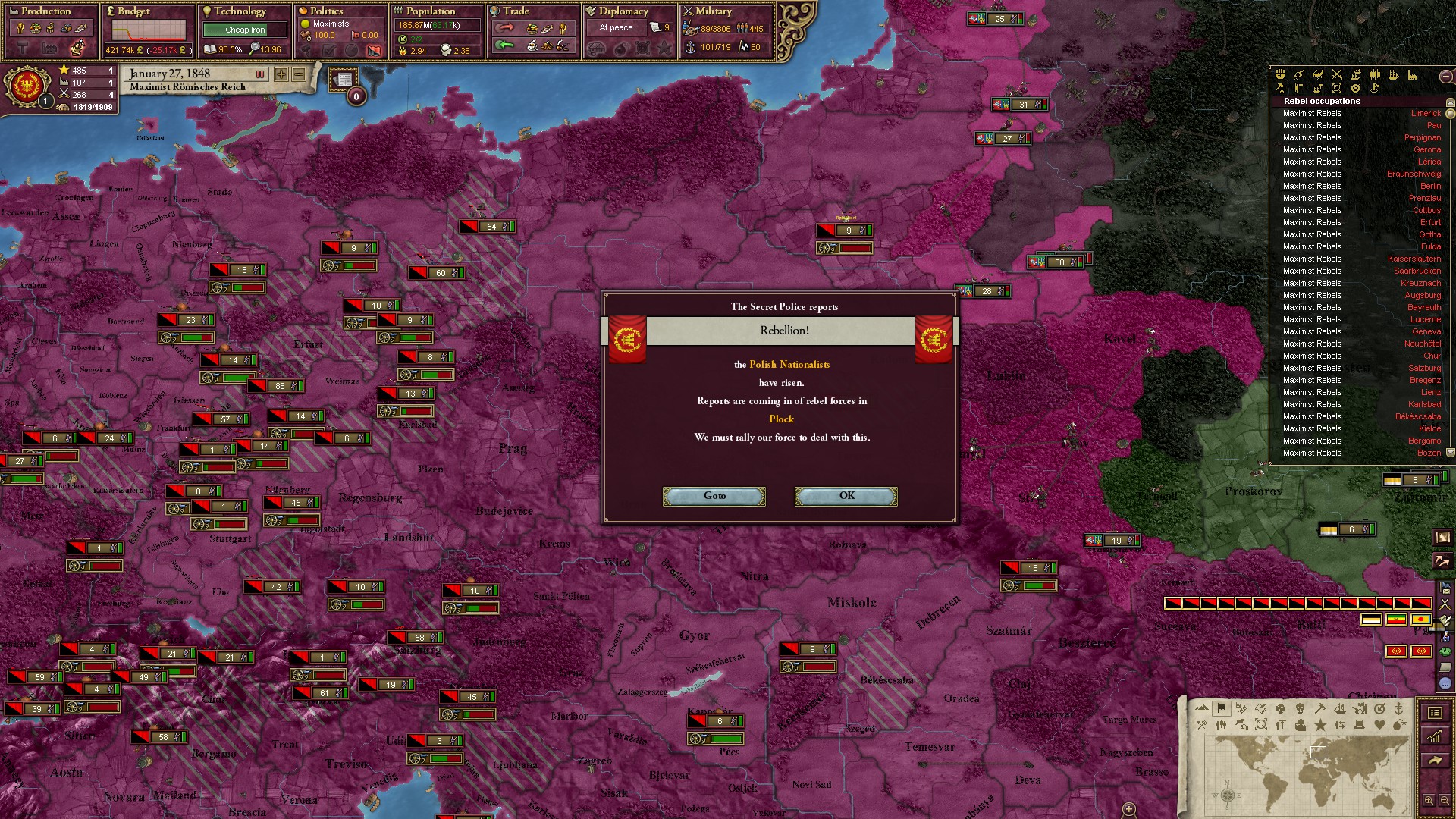
But that was nothing compared to the things to come. Disillusioned by the failure of the Maximists to bring peace and prosperity to the Reich highlighted by the thousands of rogue Maximists rampaging through Europe, angered by the failure of the election of 1847 to produce fully democratic results, enraged by the representative's government to get past petty ideological differences and overcome political gridlock, and really enraged that Maximilian was legally prevented from doing anything about this, the citizens of the Reich increasingly began to turn back to Sigismund II as their true Kaiser, joining the Siegfriedist movement in the millions. Many minorities, eager to die fighting for Sigismund rather than suffer under Maximist persecution, threw in their lot with the Siegfriedists. On 3 February 1848, Sigismund II sensed it was the time to strike back. That day, he resurfaced in Constantinople and had the few generals and patriarchs still loyal to him to crown him a second time in Hagia Sophia. The Greek
dynatoi families swore their complete allegiance to him as Kaiser. An ultimatum was delivered to Berlin that same day: end the farce of a democracy that the Maximist regime is, or die. Maximilian agreed to step down from his throne, but Konrad had him imprisoned and sent the ultimatum to the Diet for voting. The senators voted 1724% in favor of rejecting it, and a legion marched on Constantinople, intent on killing Sigismund and his family and ending the succession dispute once and for all. It was then that Sigismund sprung his trap. All across the Reich, the anti-Maximist network he had been building up for years suddenly activated, and millions of citizens swore their loyalty to Sigismund. Entire provinces, particularly those with large minority populations, swore loyalty to Constantinople. The people rose up in rebellion, not as disorganized rebels, but as united soldiers, ready to serve their Kaiser. At approximately 12:54 on 3 February, an hour after receiving word of Berlin's decision and the Siegfriedist uprising across Europe, Sigismund ordered his generals to mobilize what legions they still had and to declare war on the Maximist regime. This was a battle for the very fate of the Reich, for the very legacy of Rome itself. And Sigismund was going to fight to preserve it.
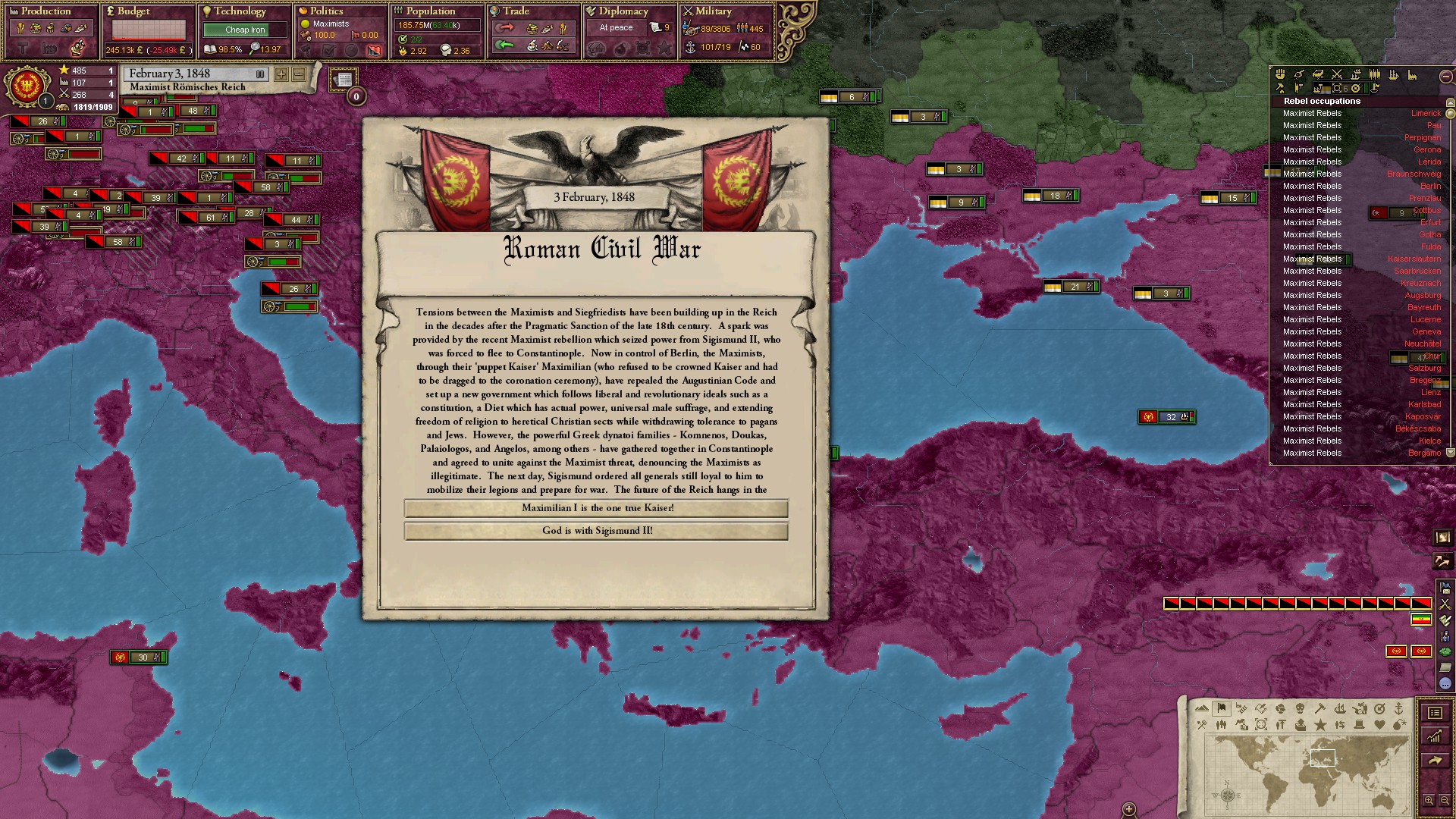
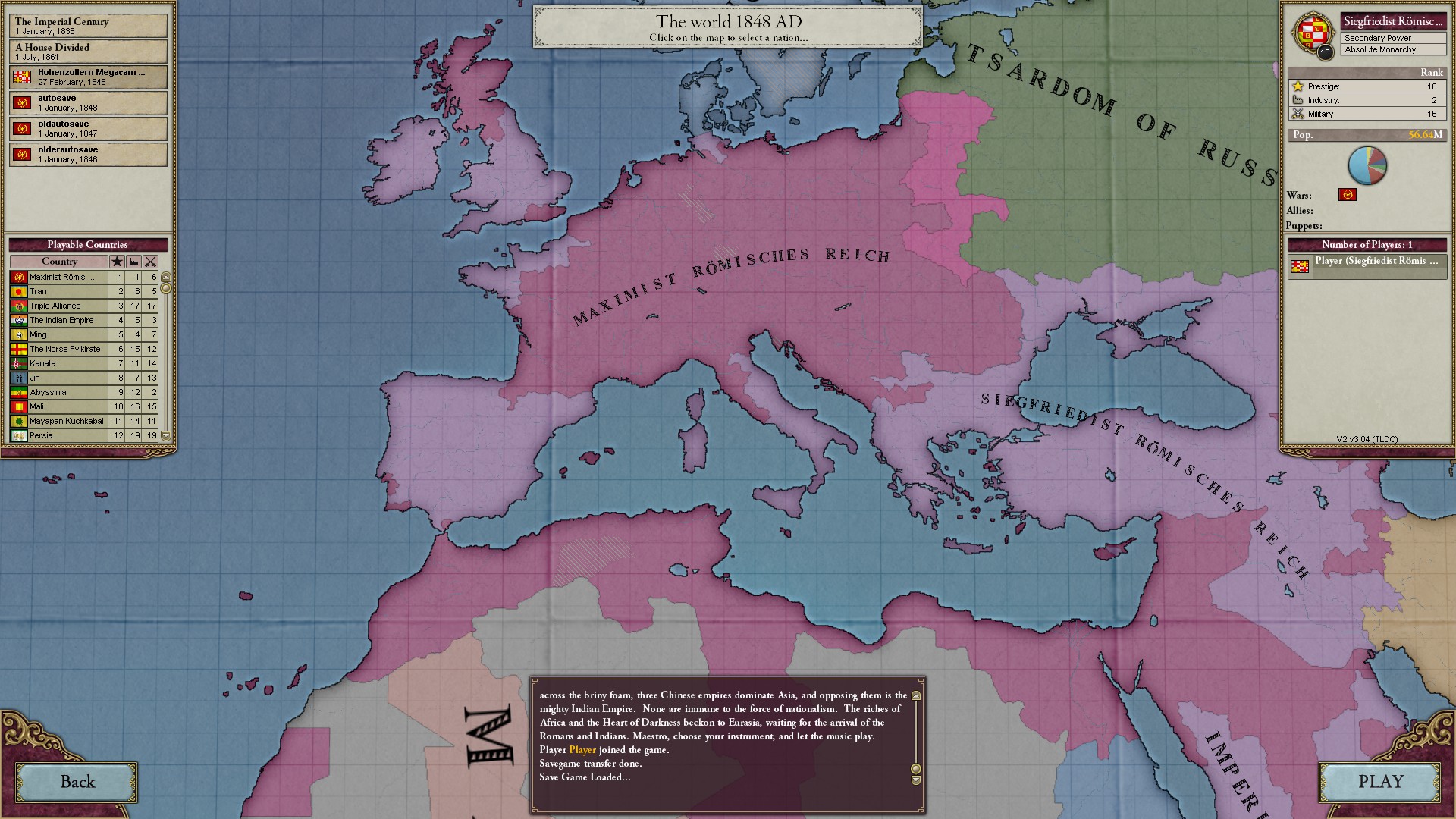
The Roman Civil War had begun.
